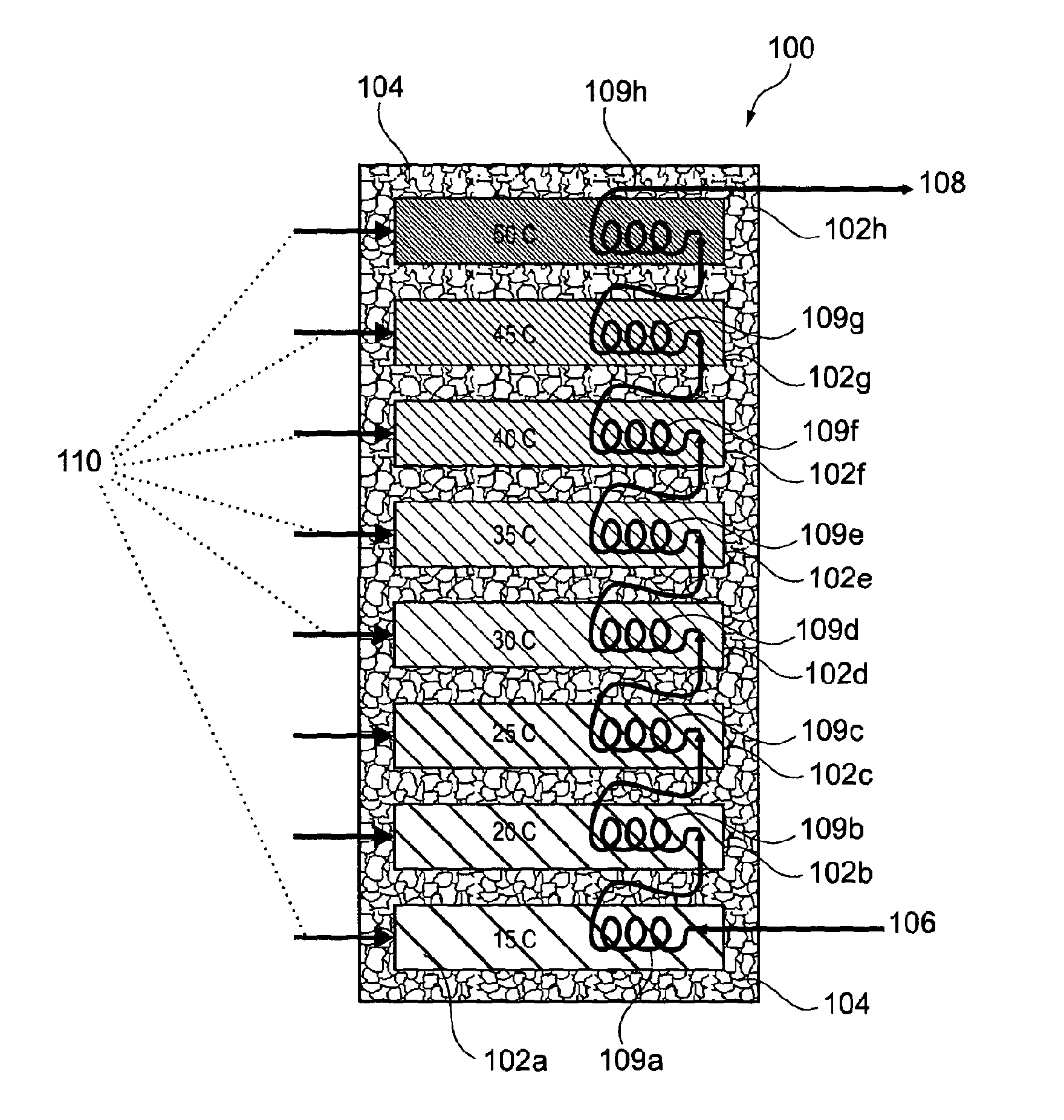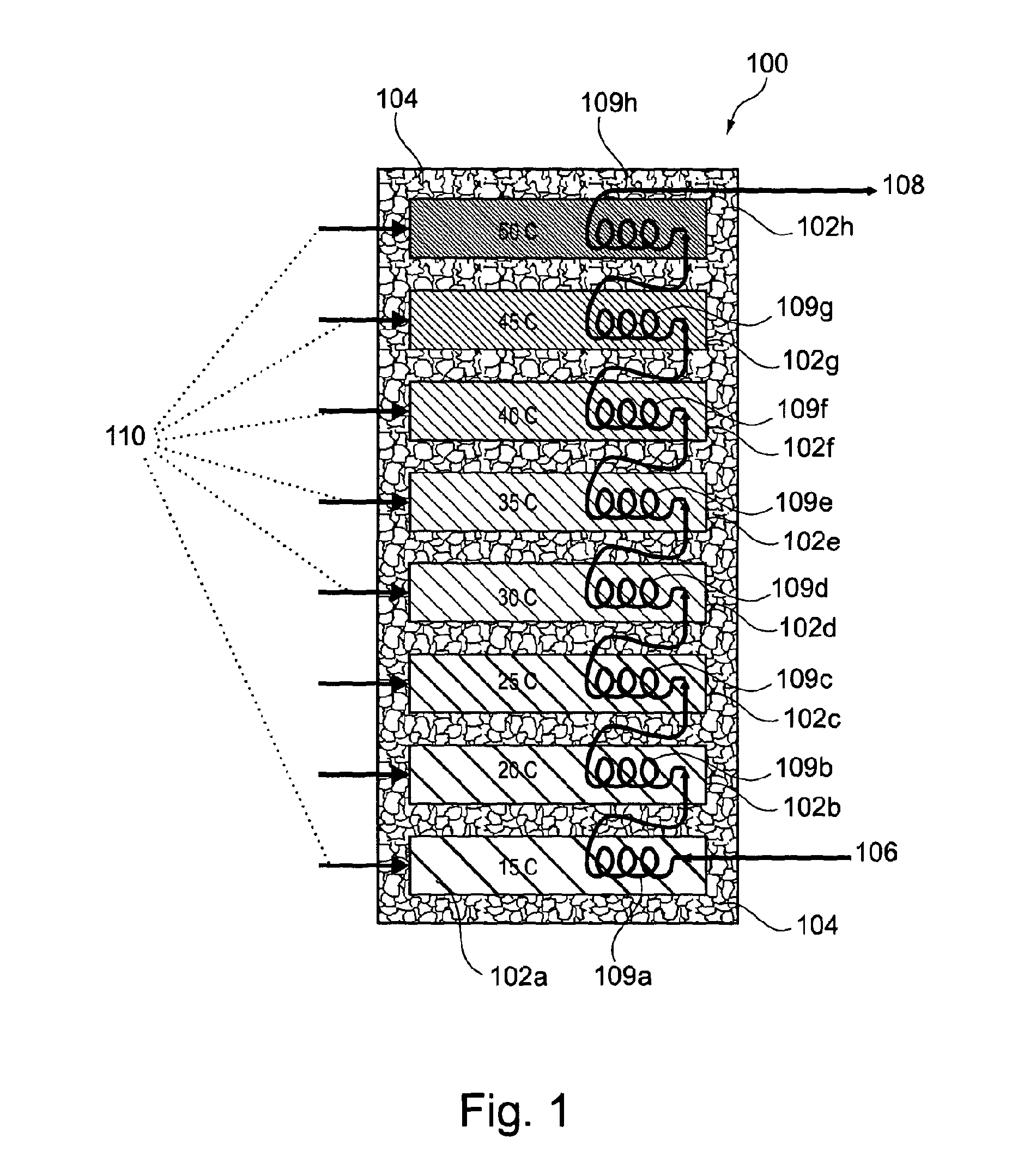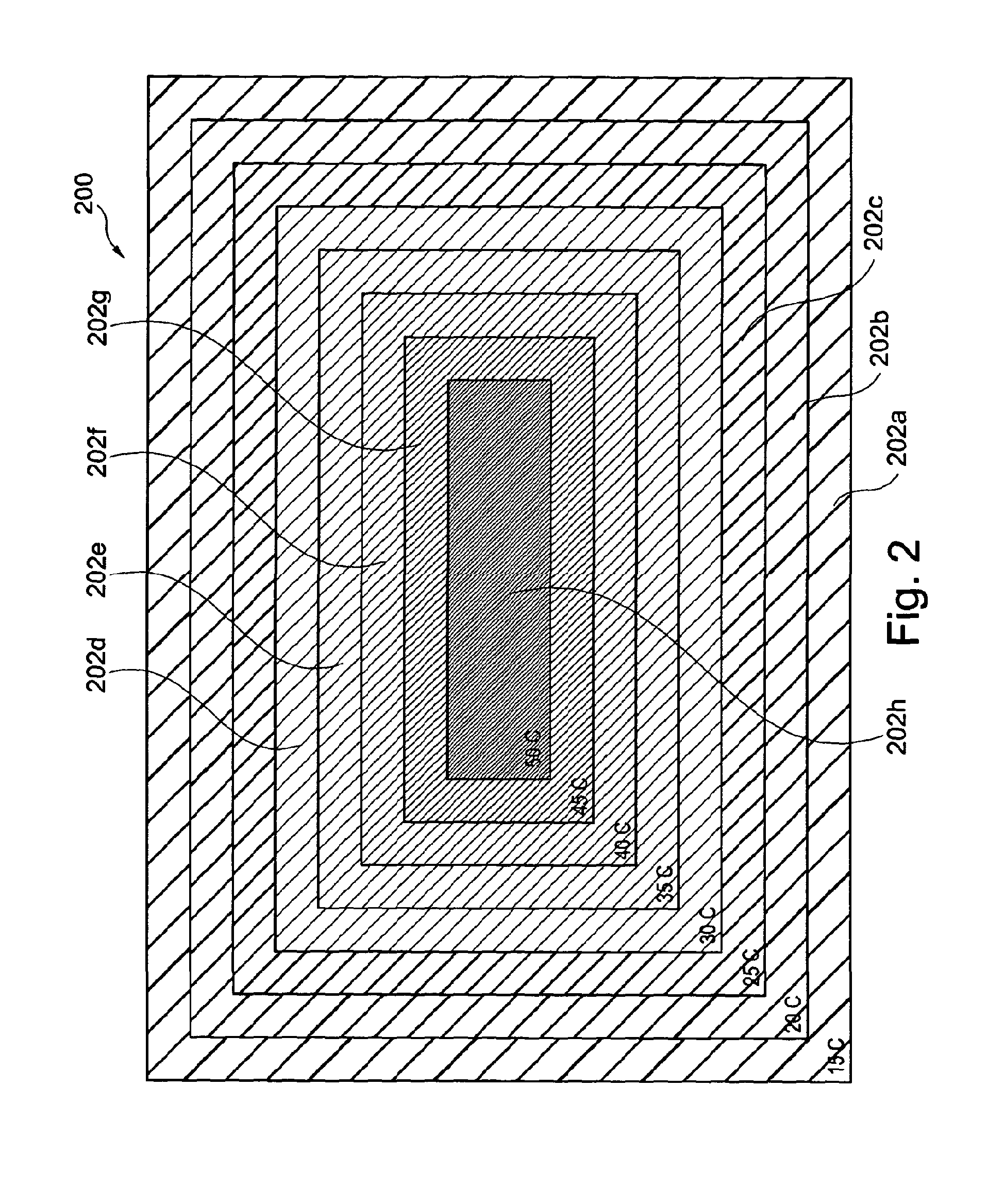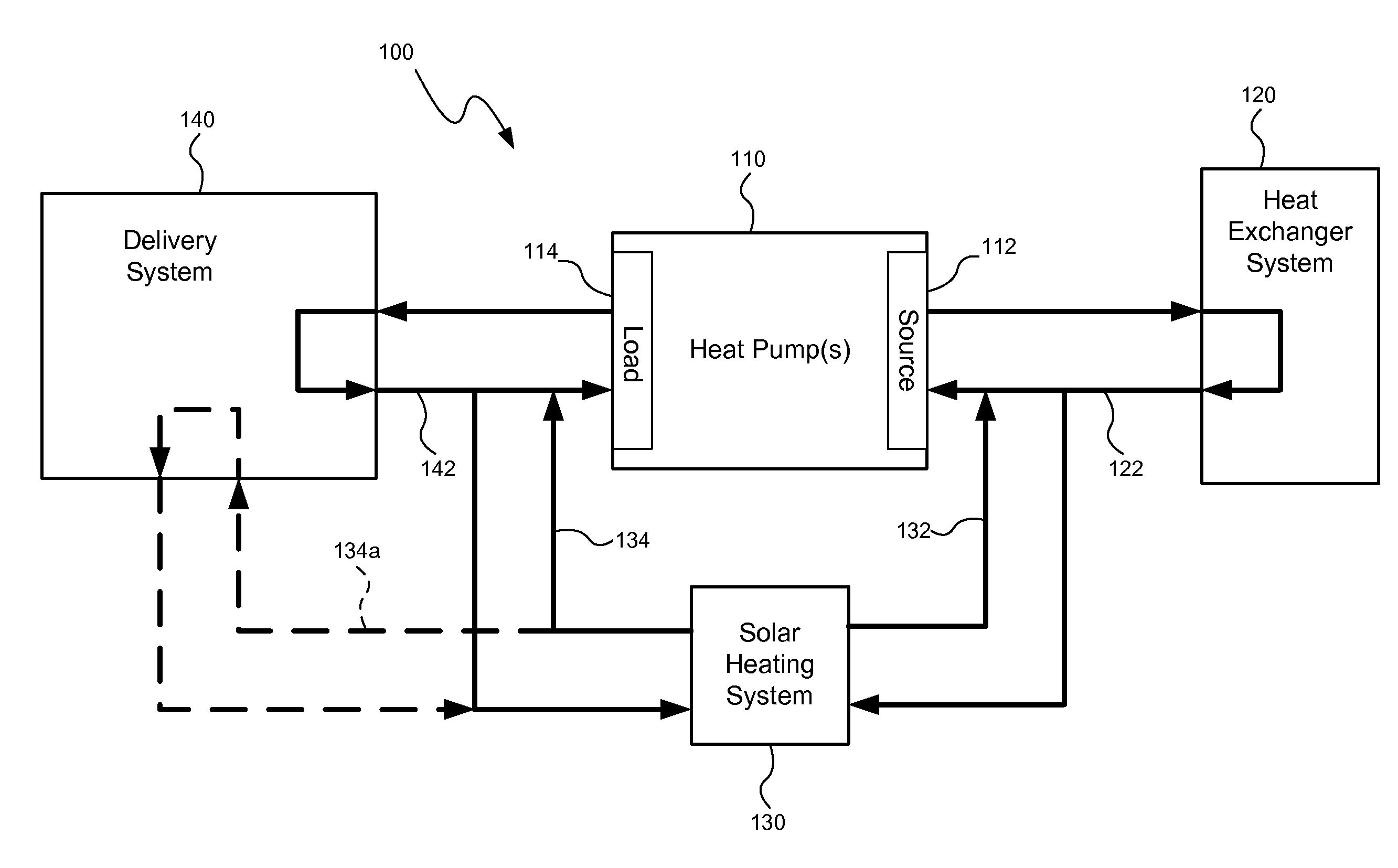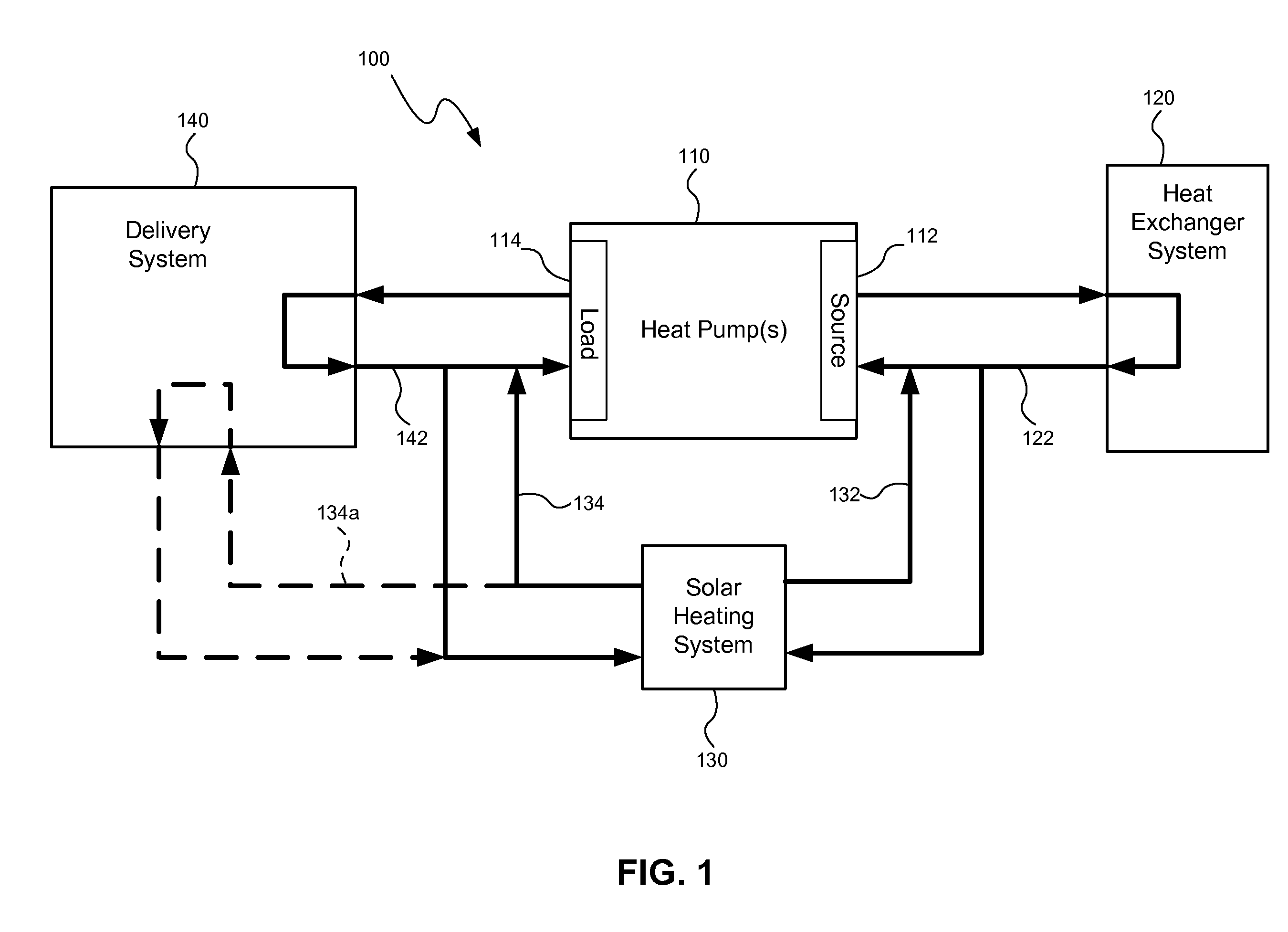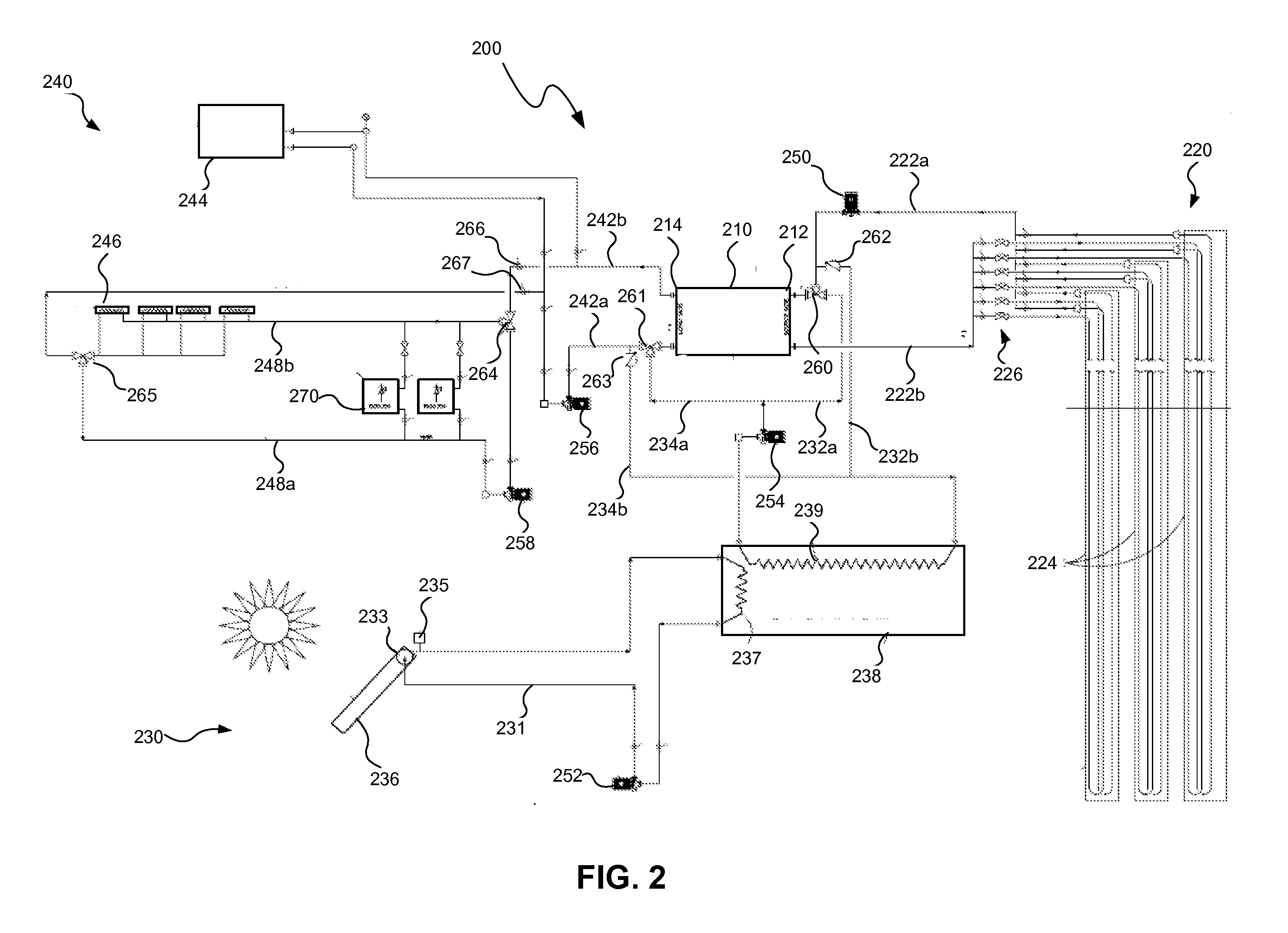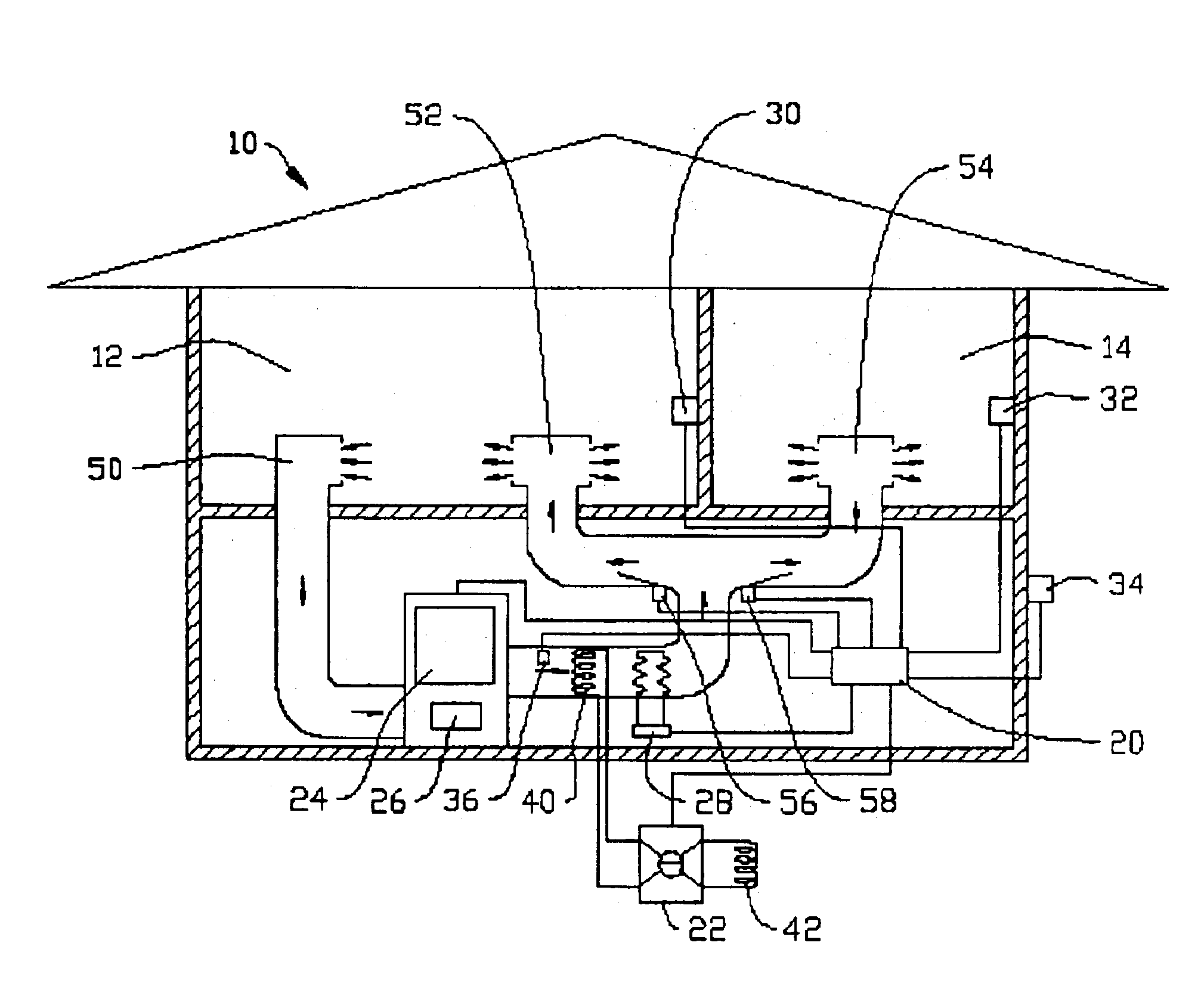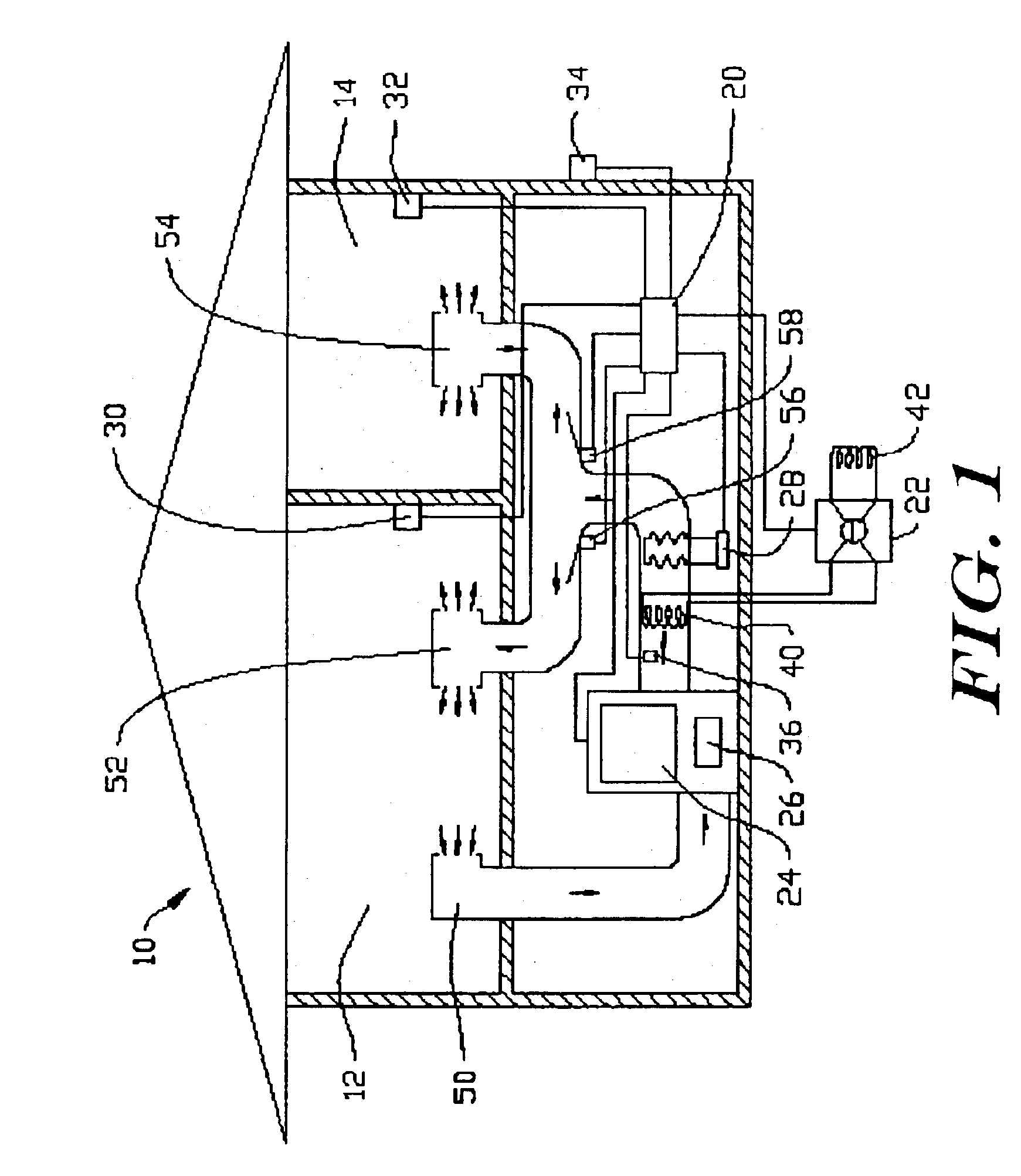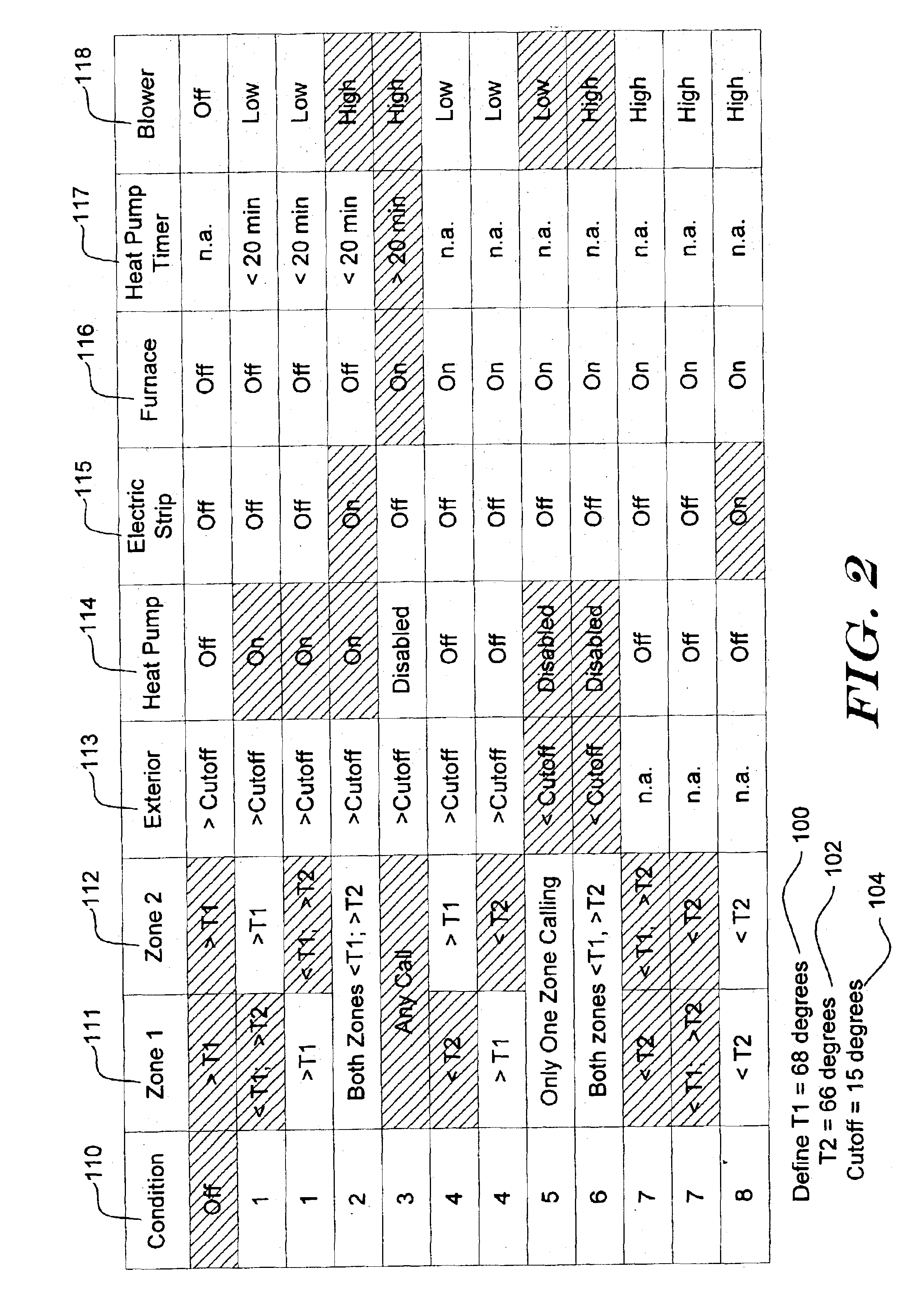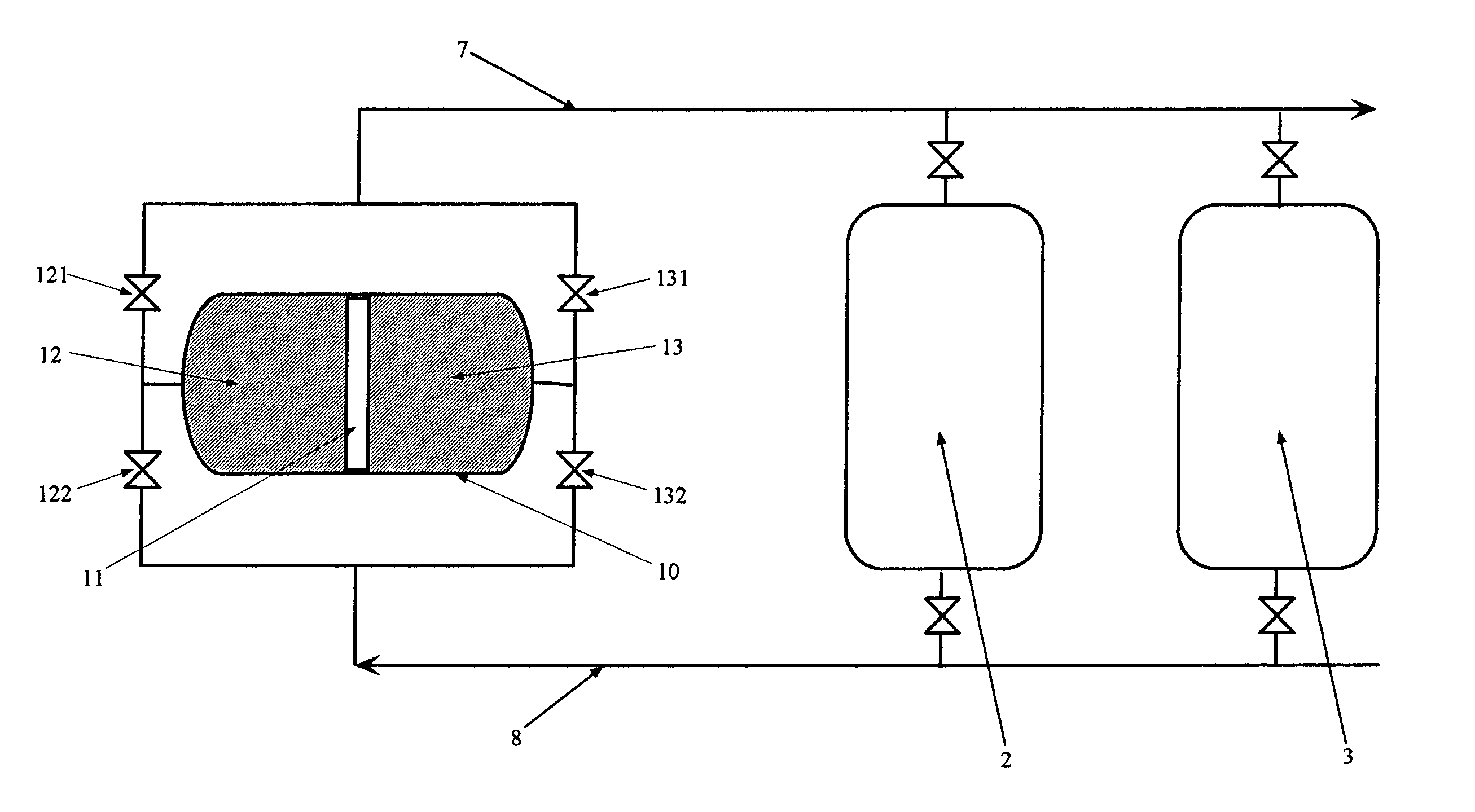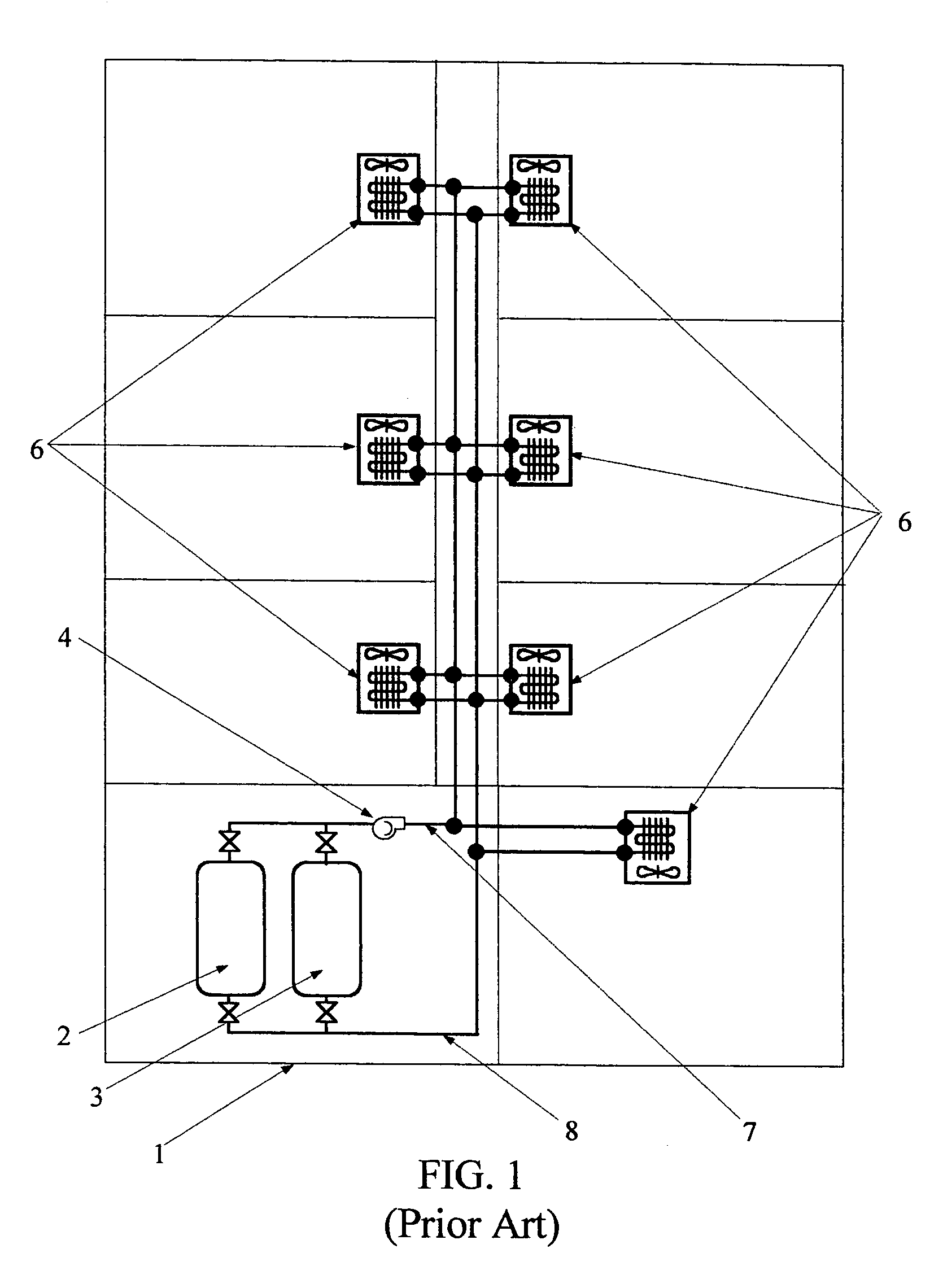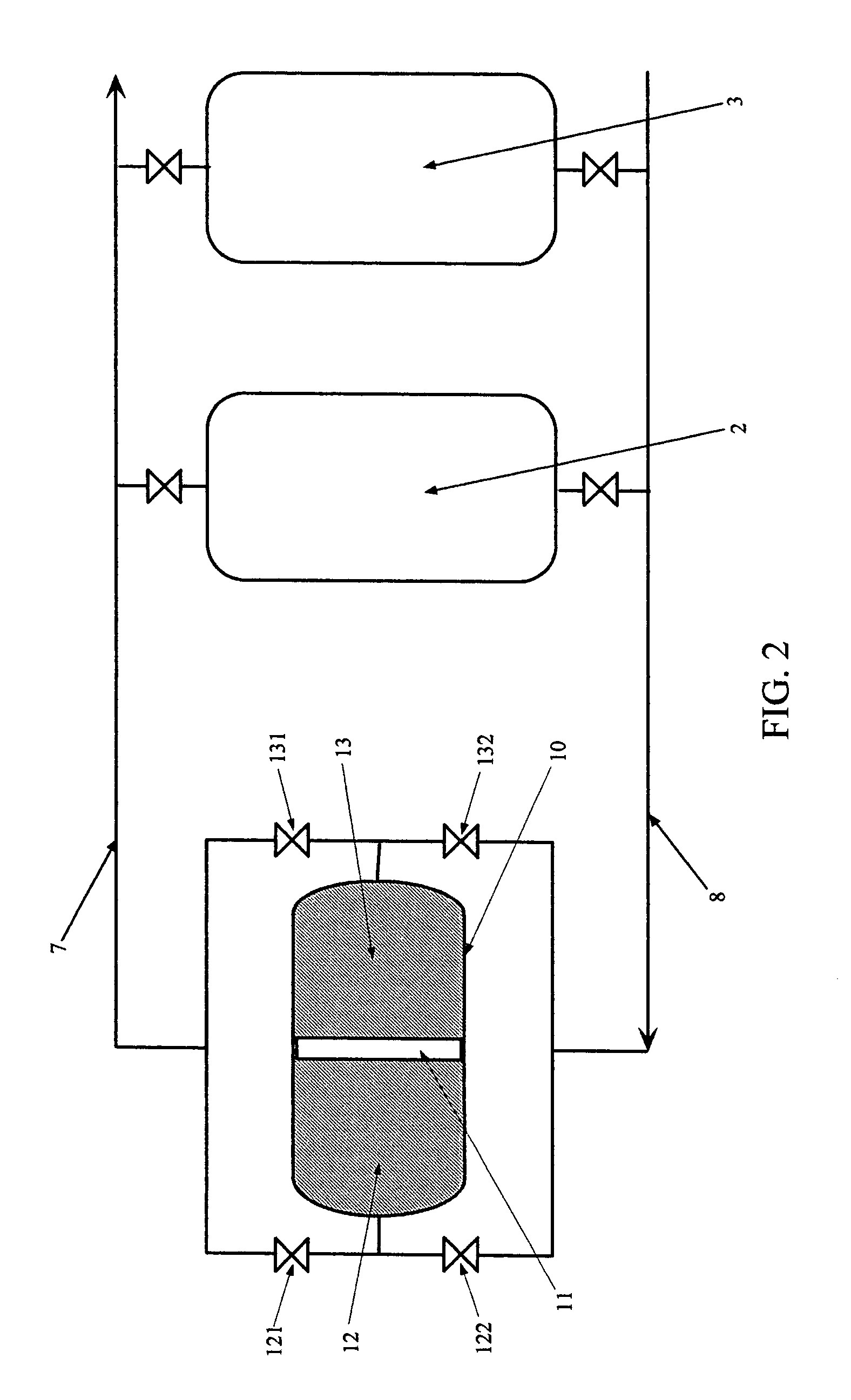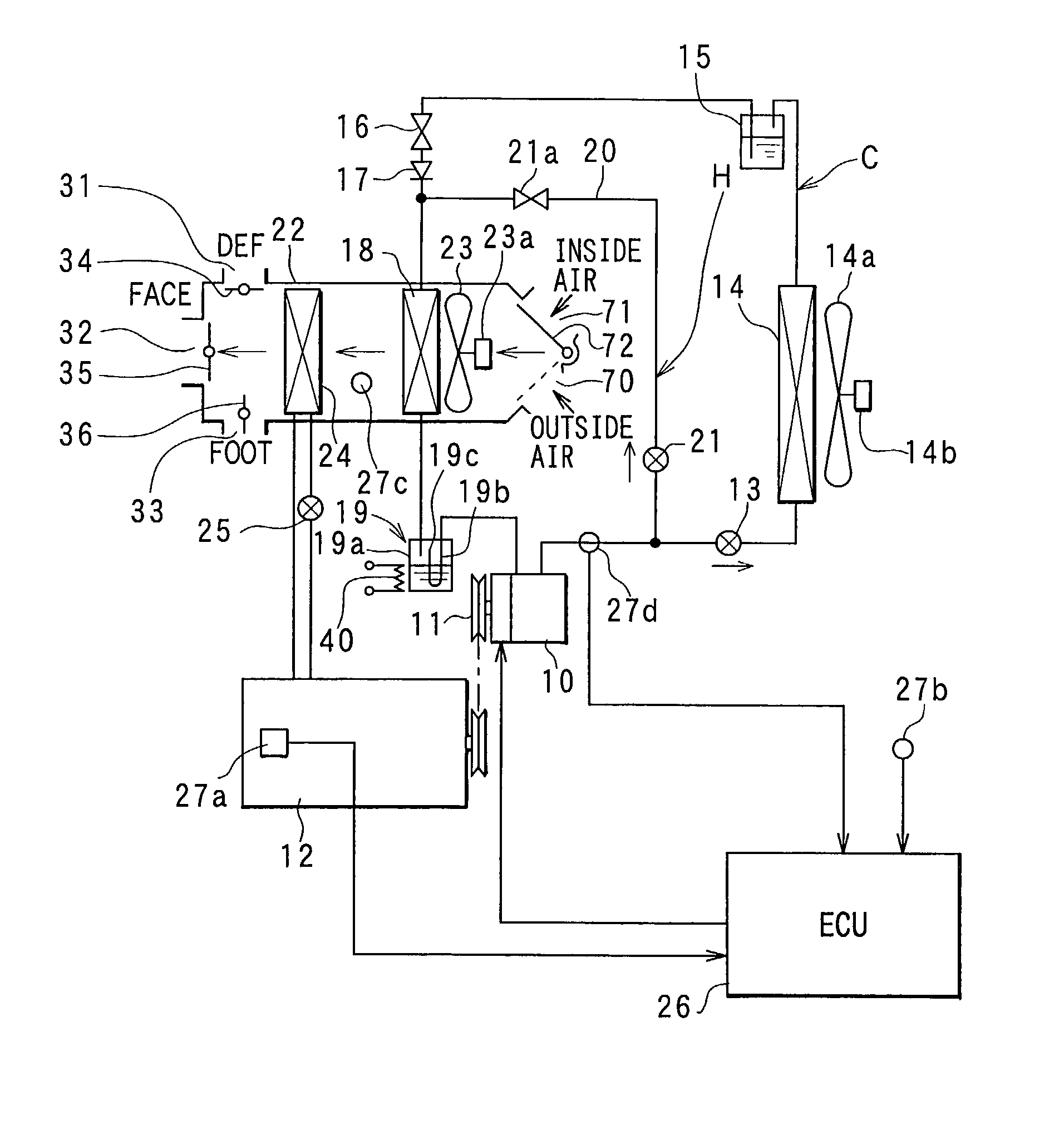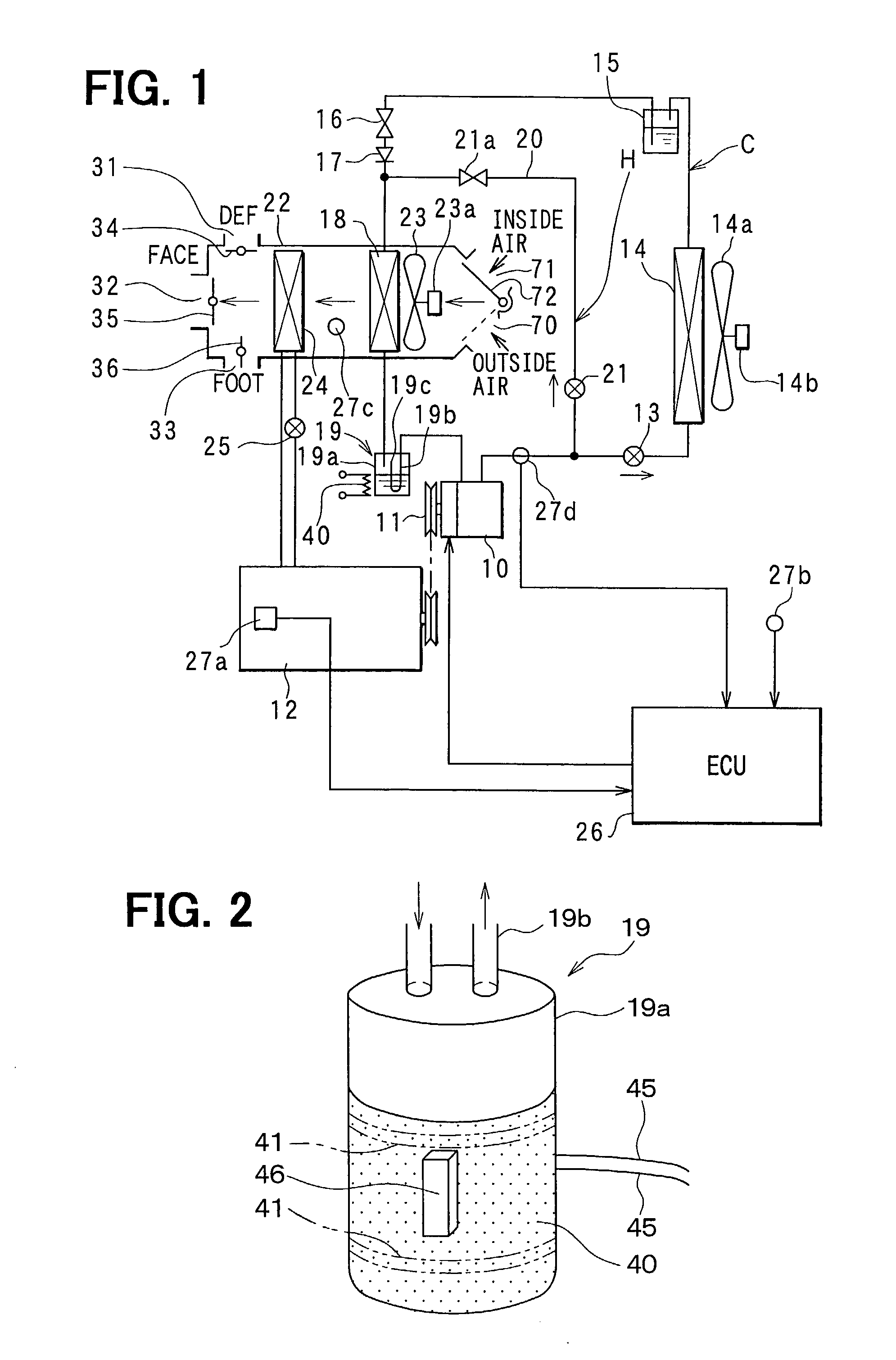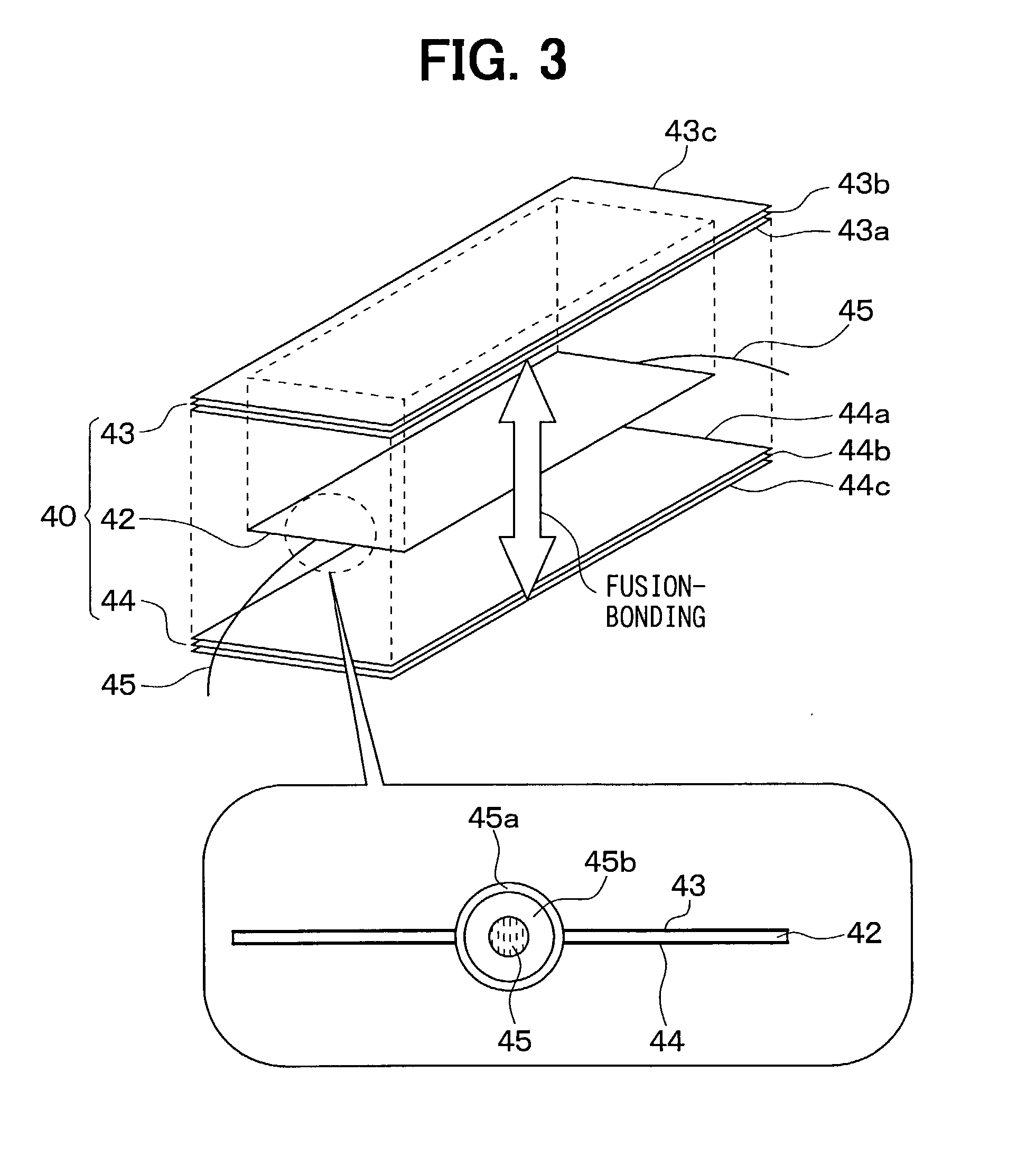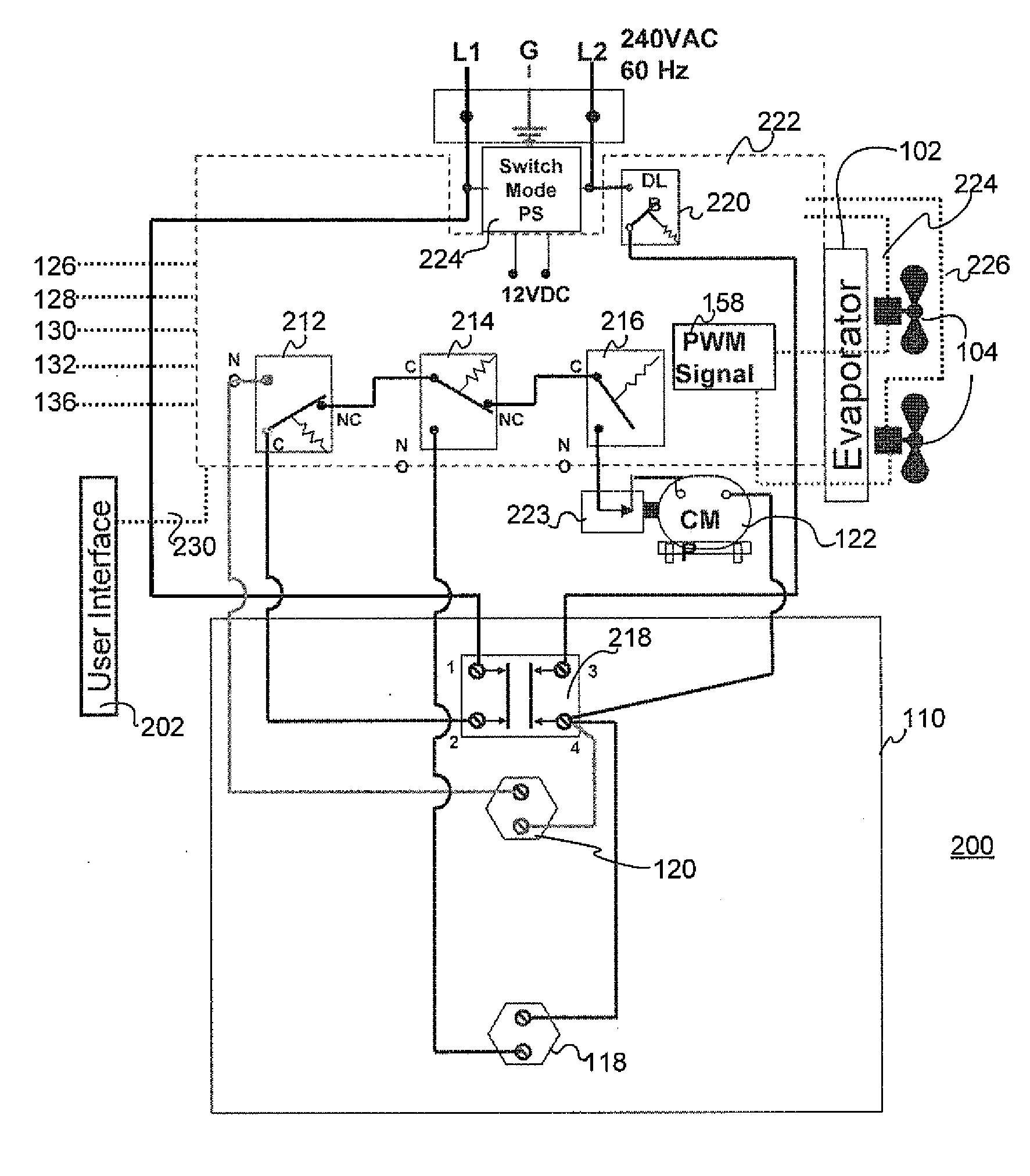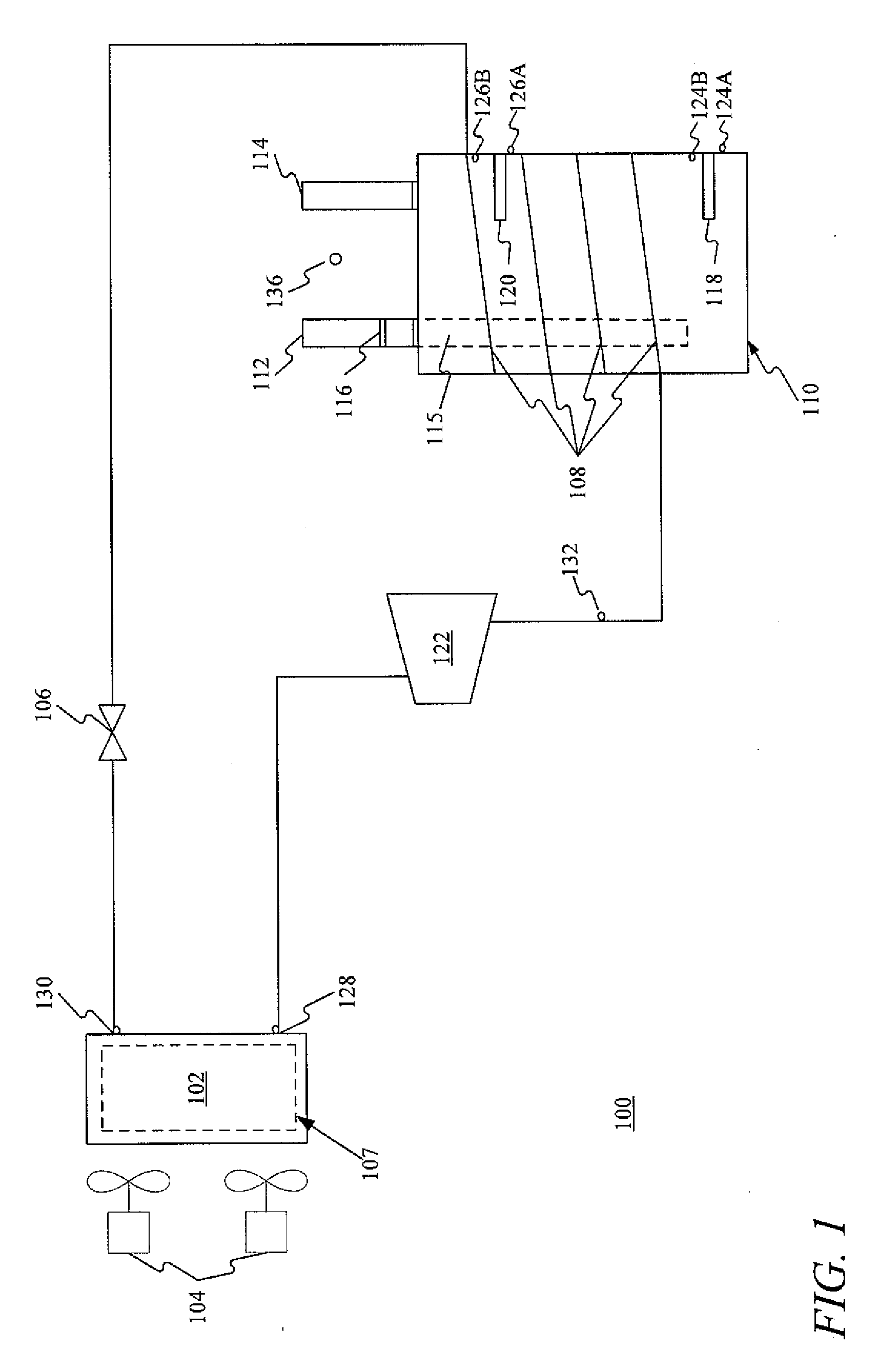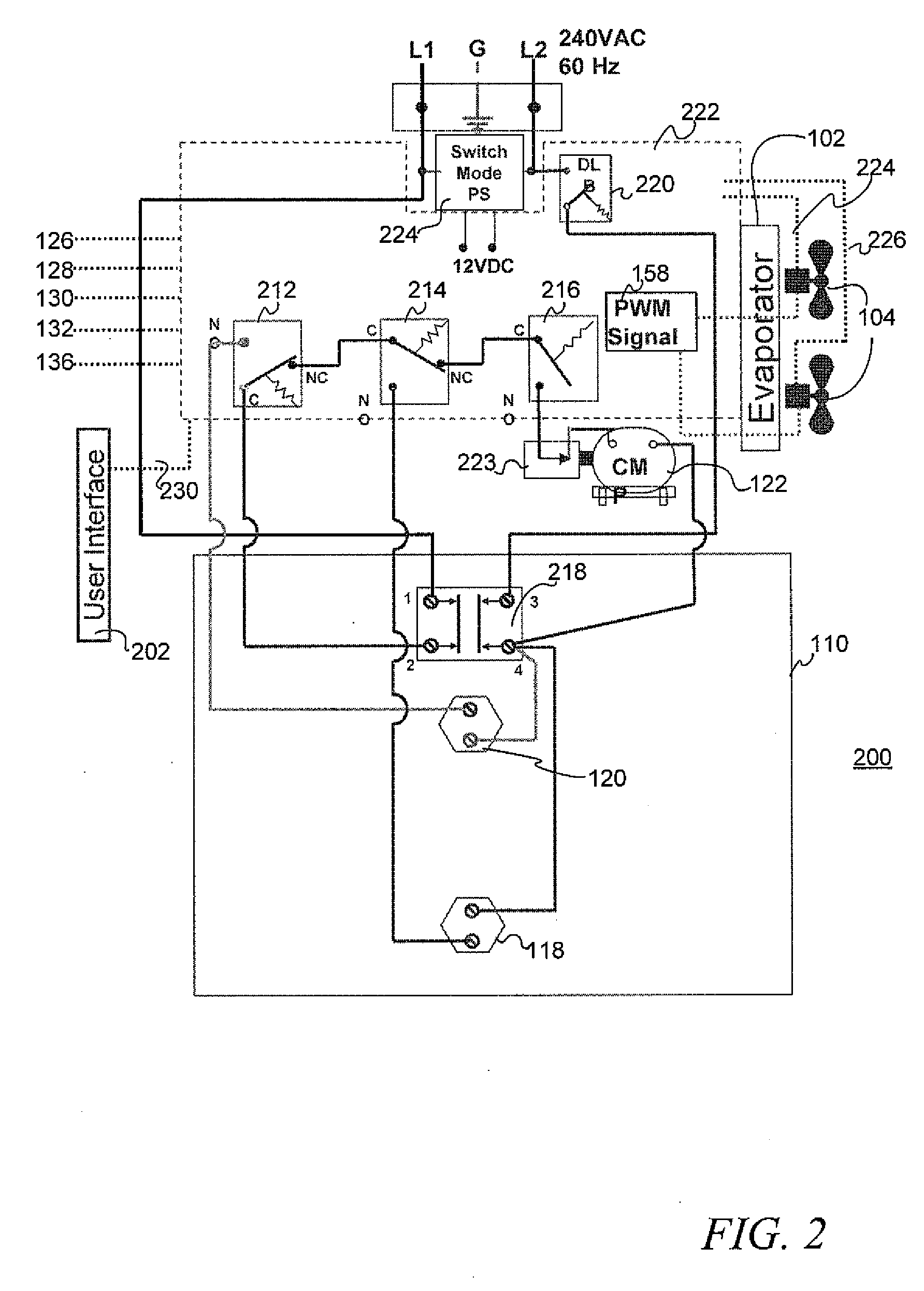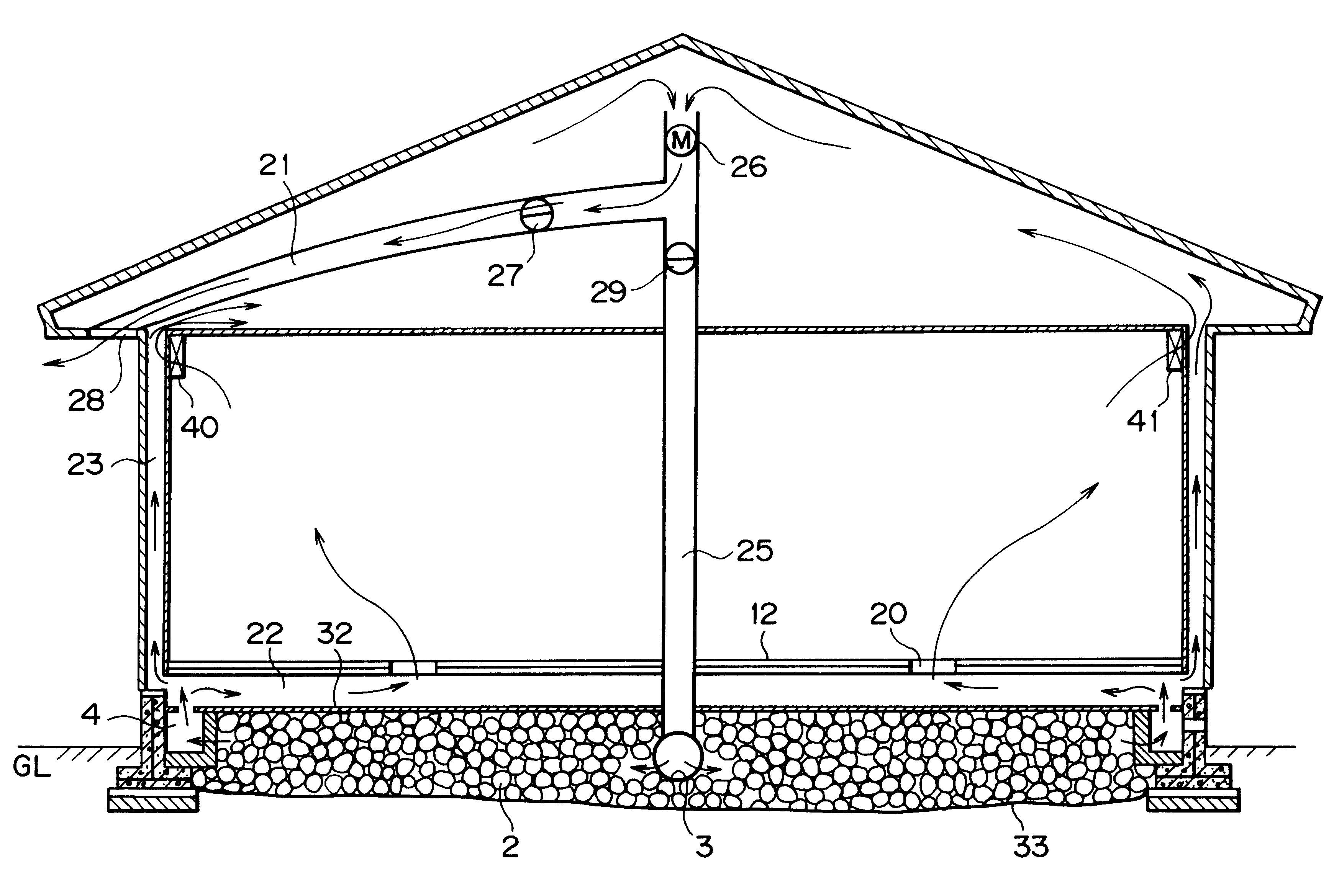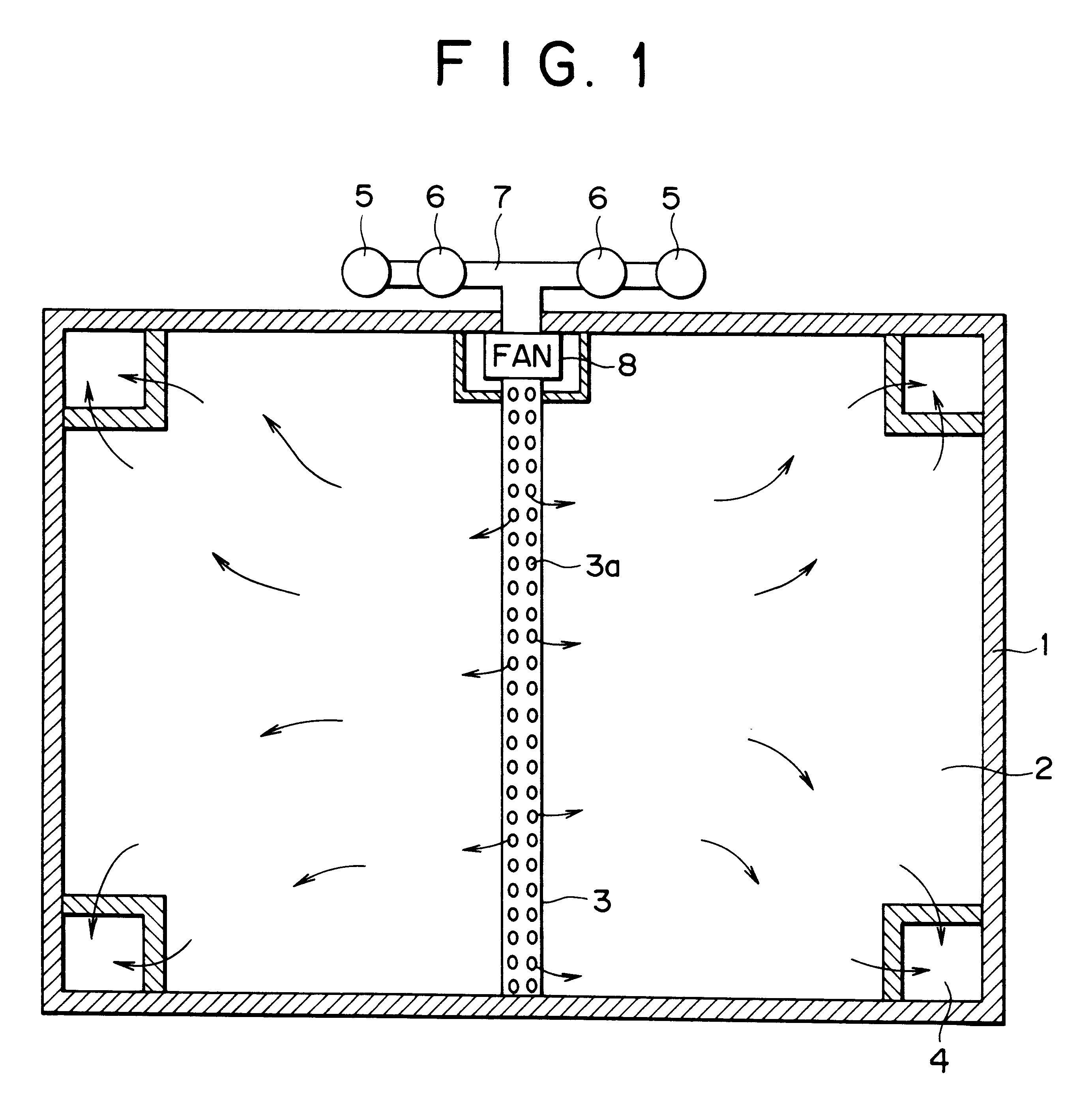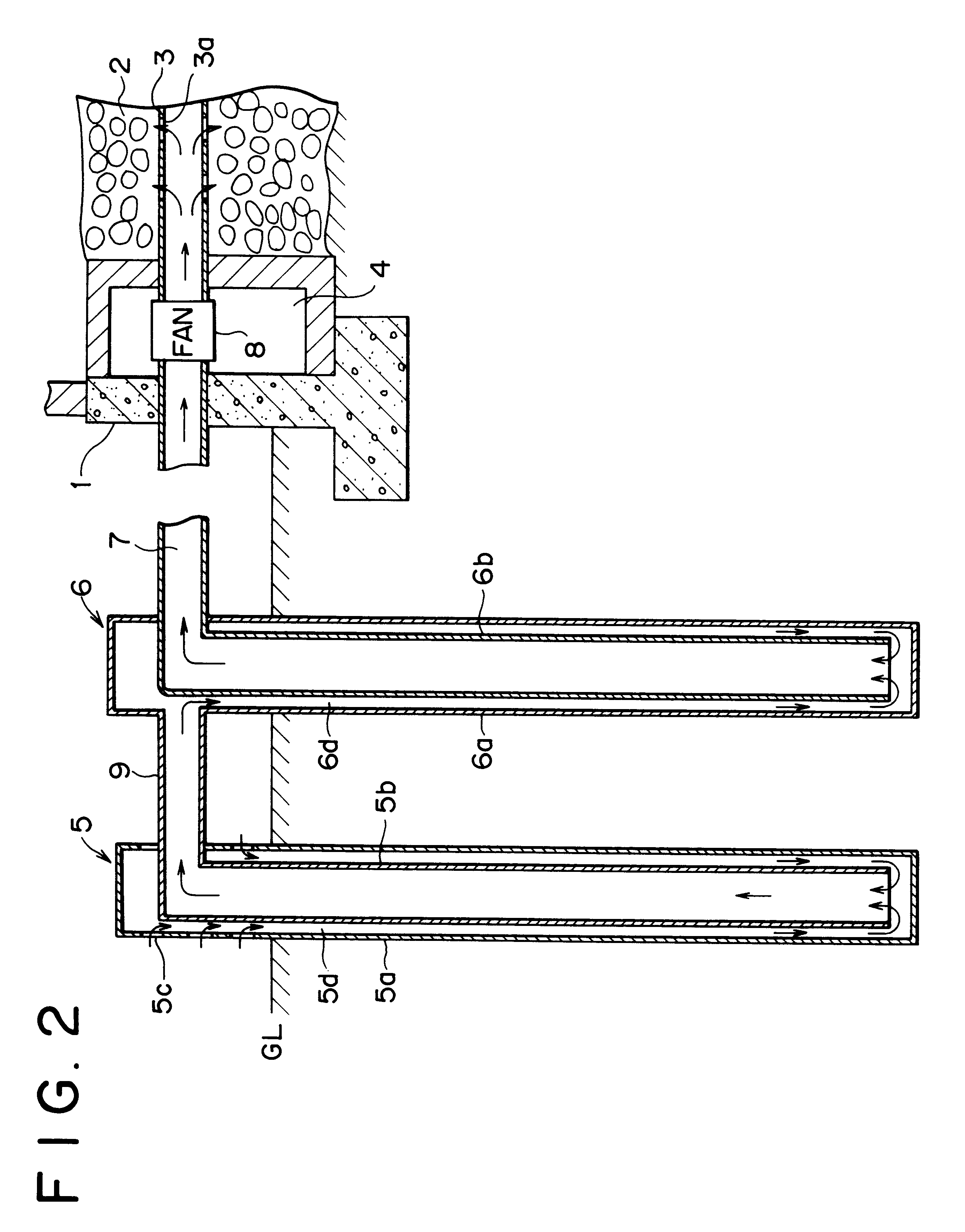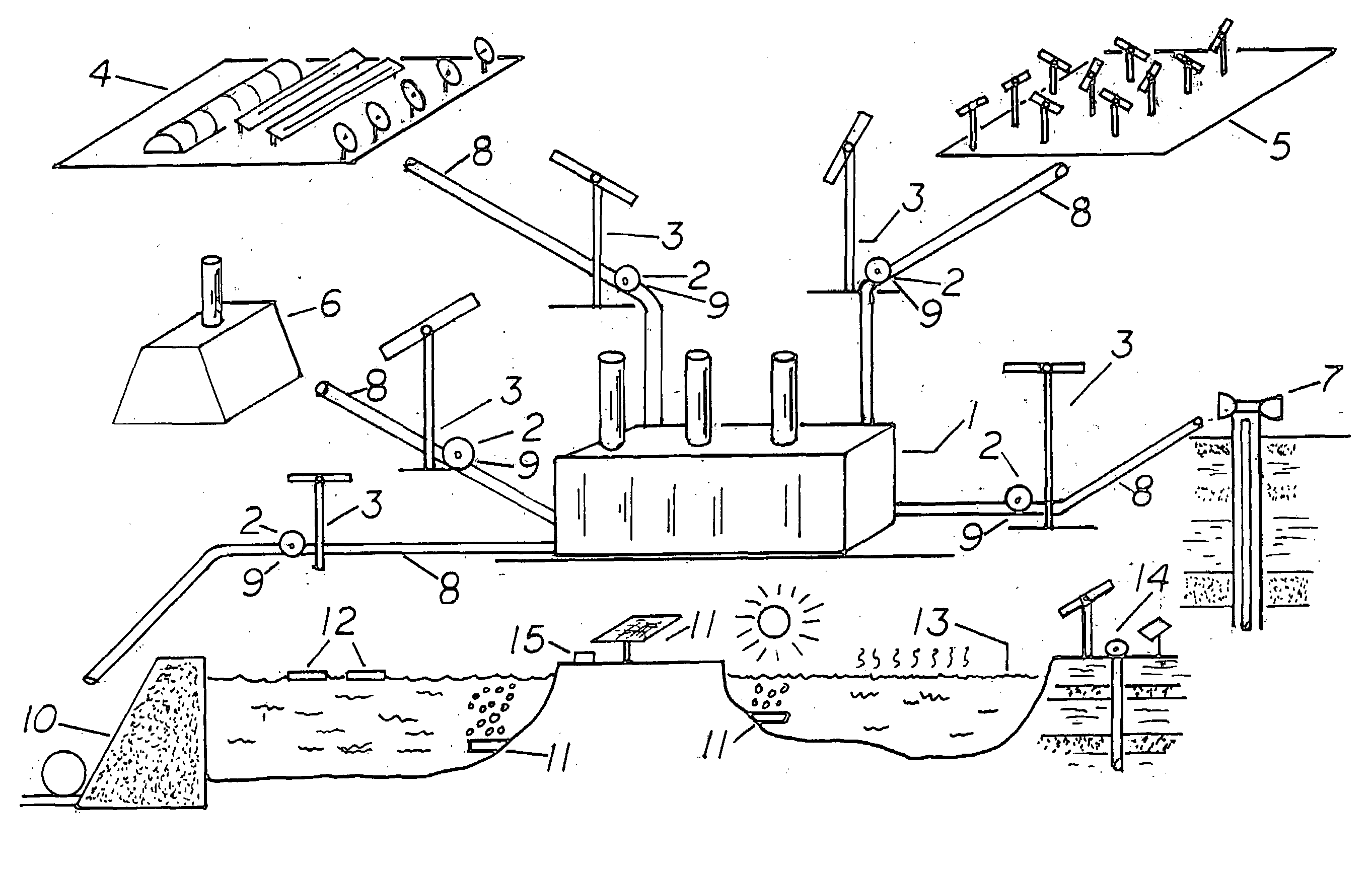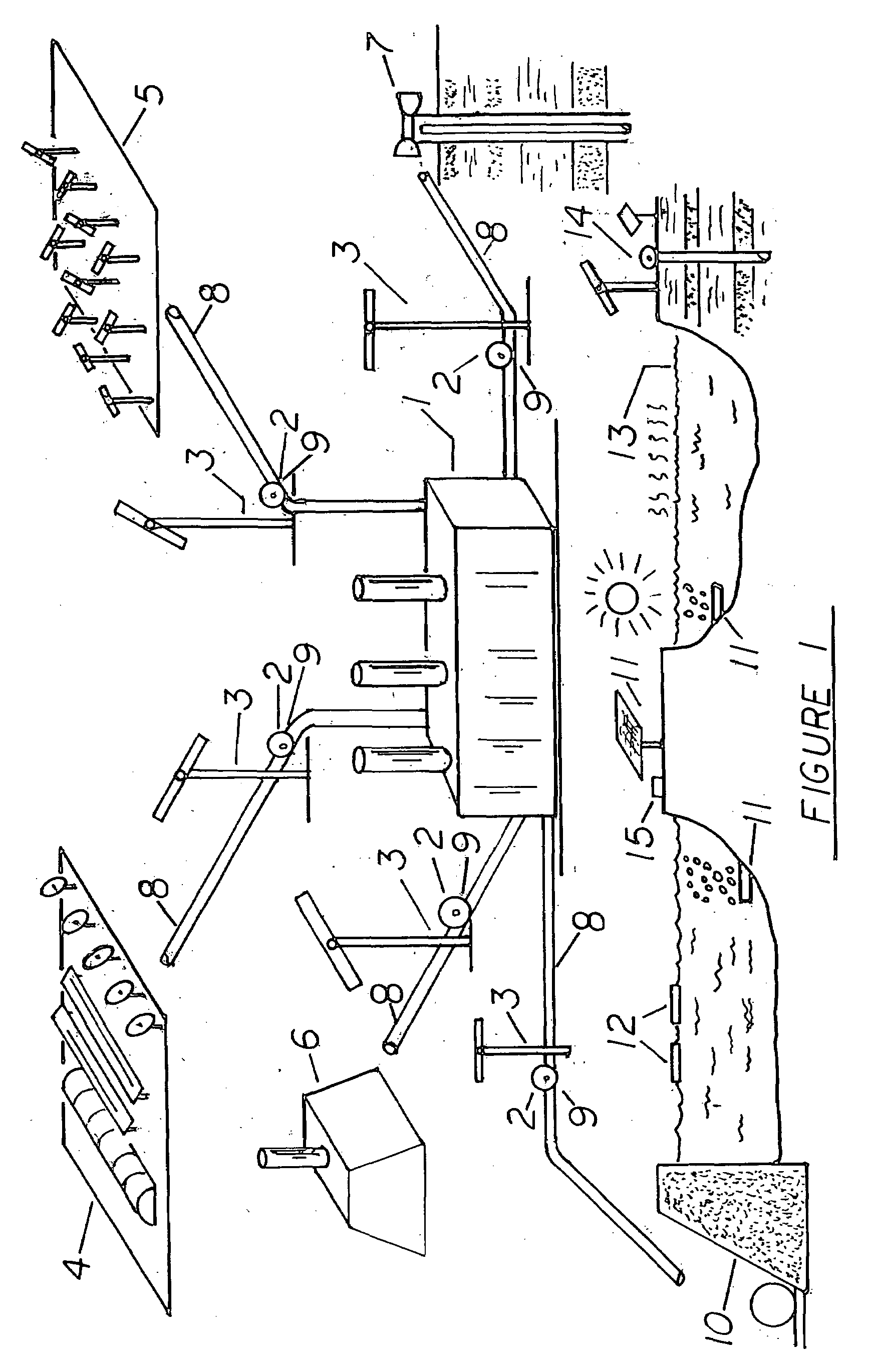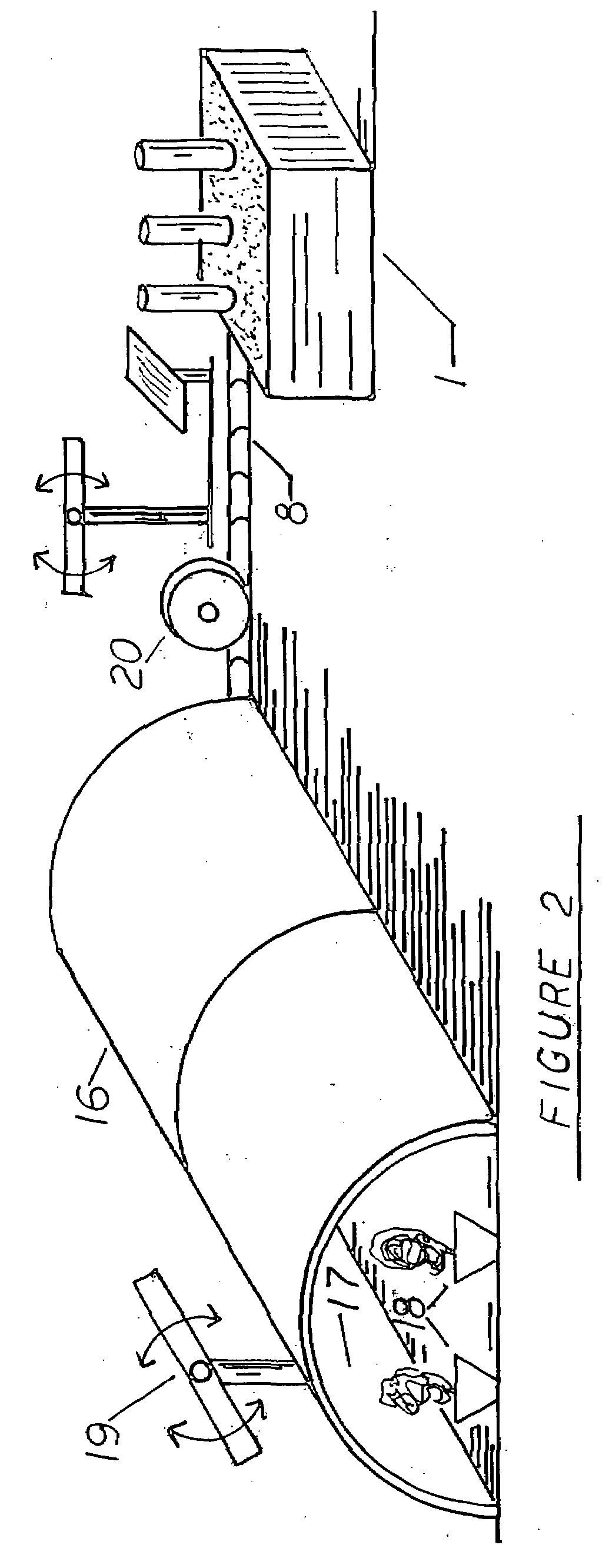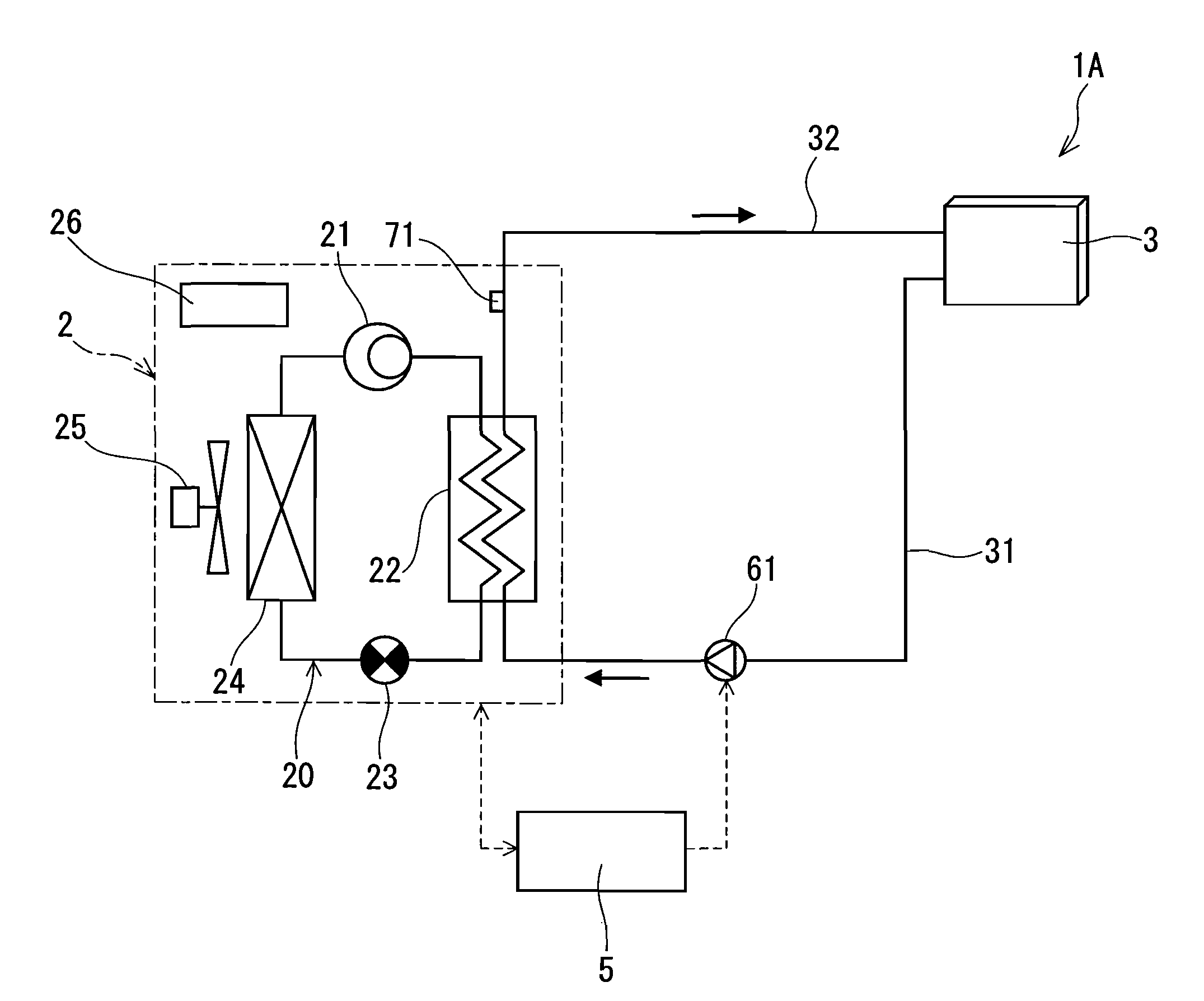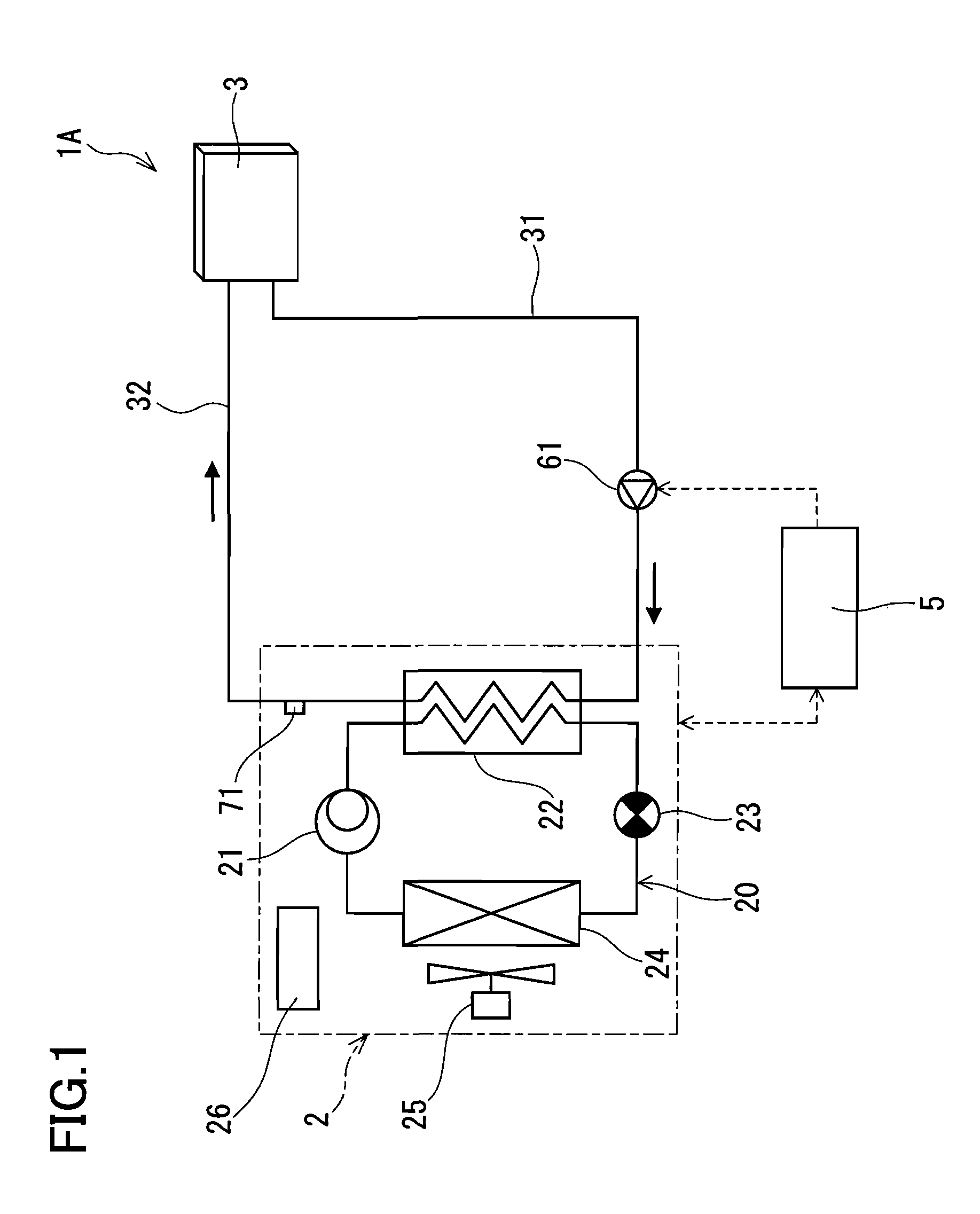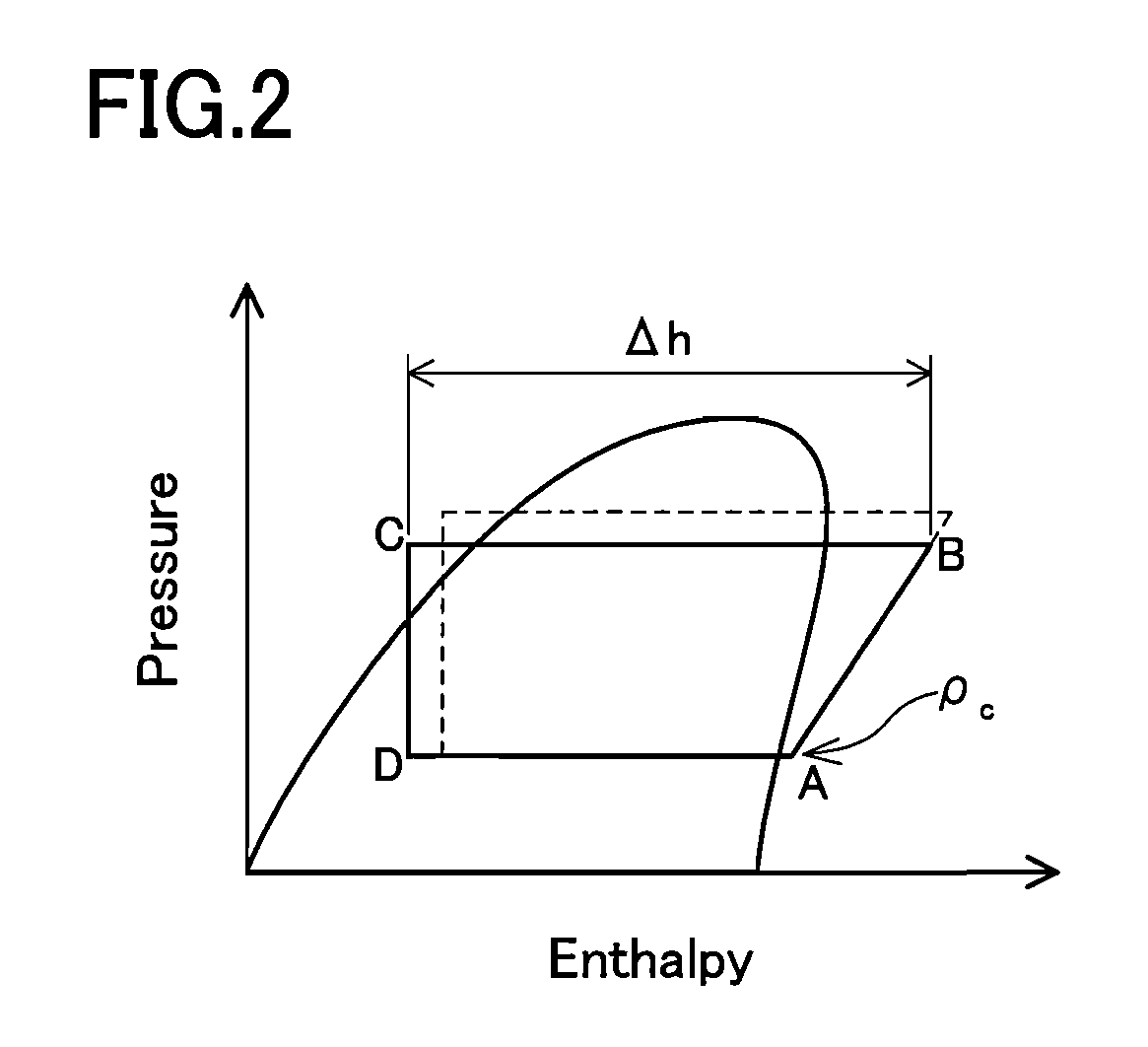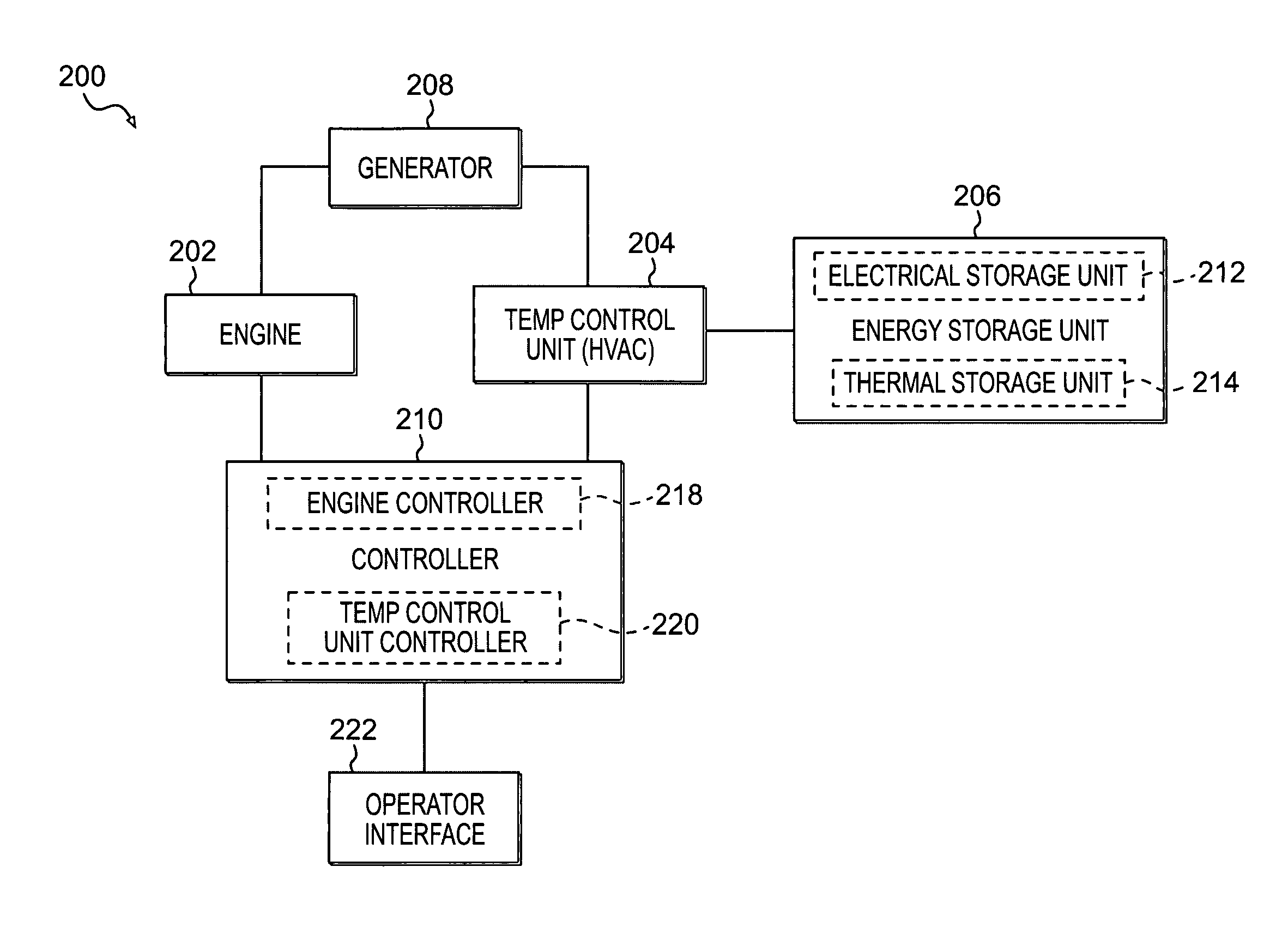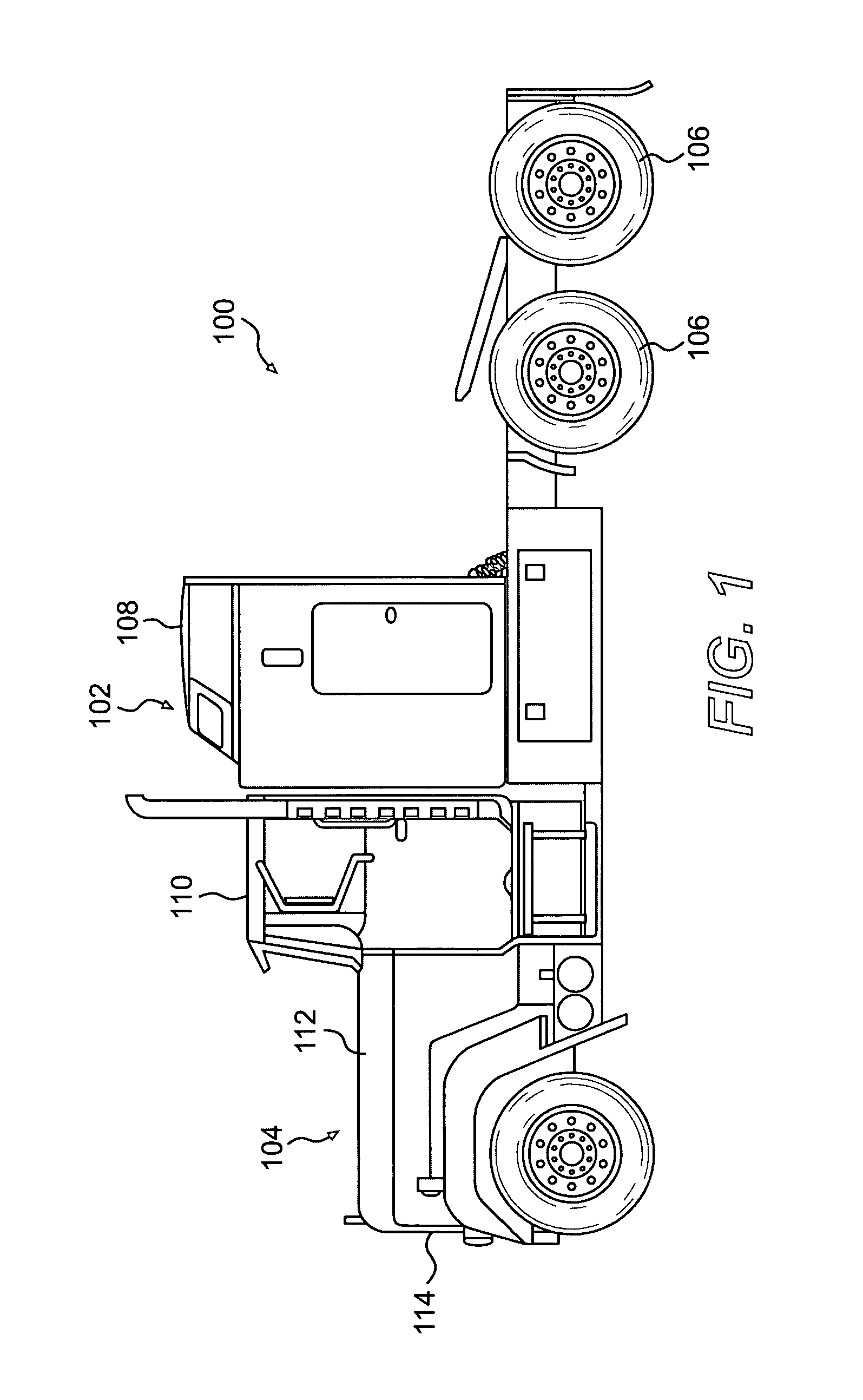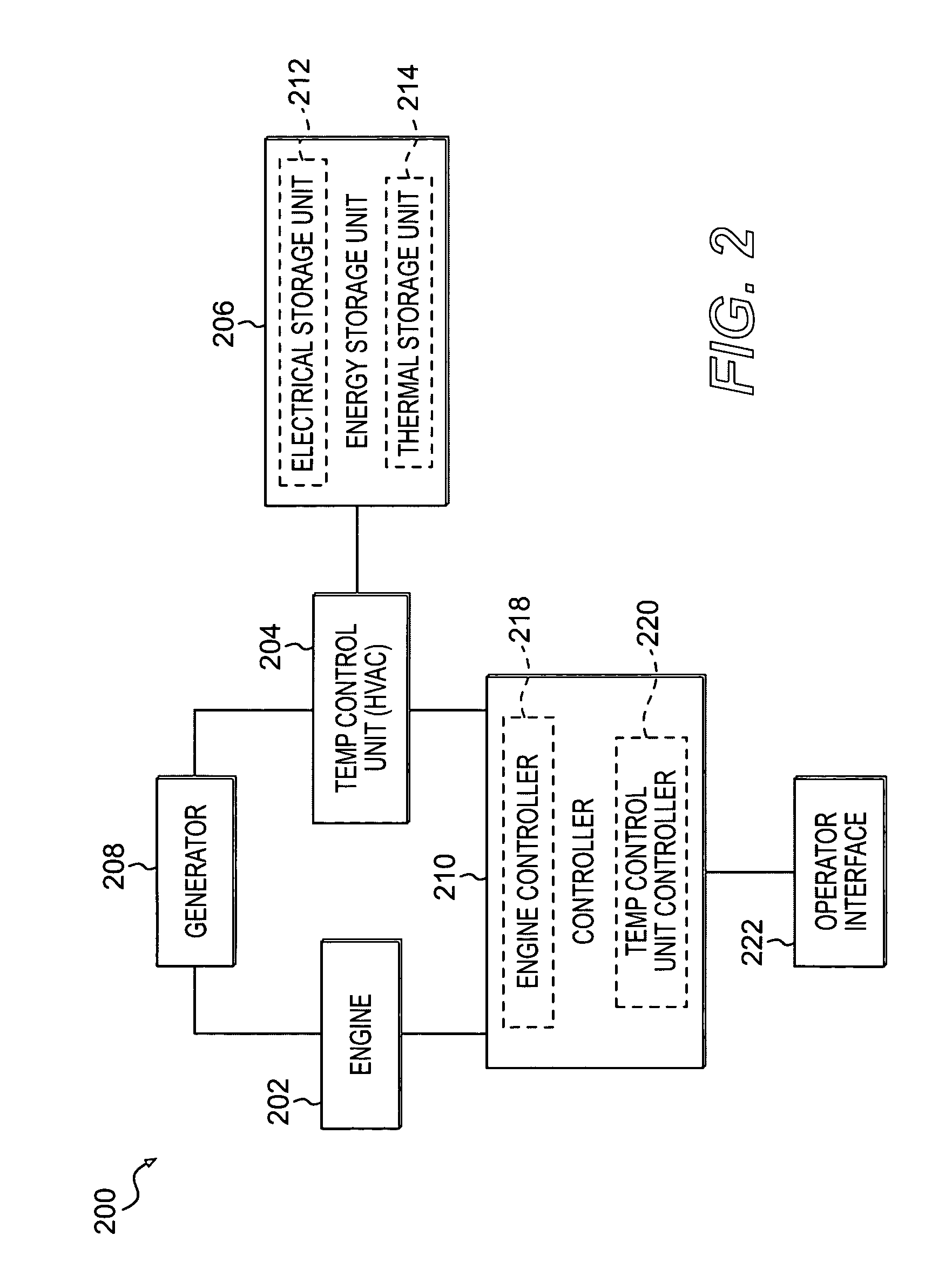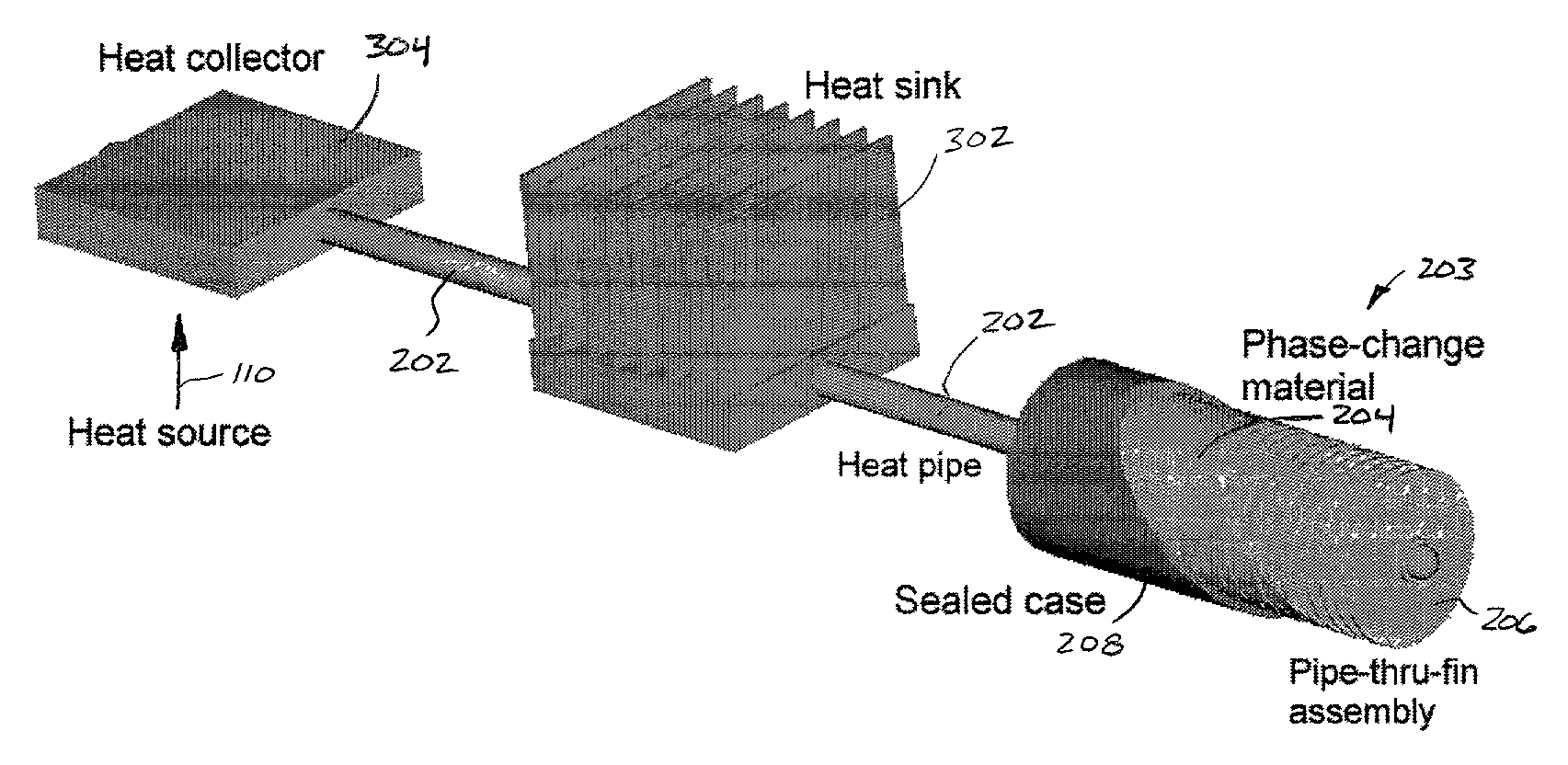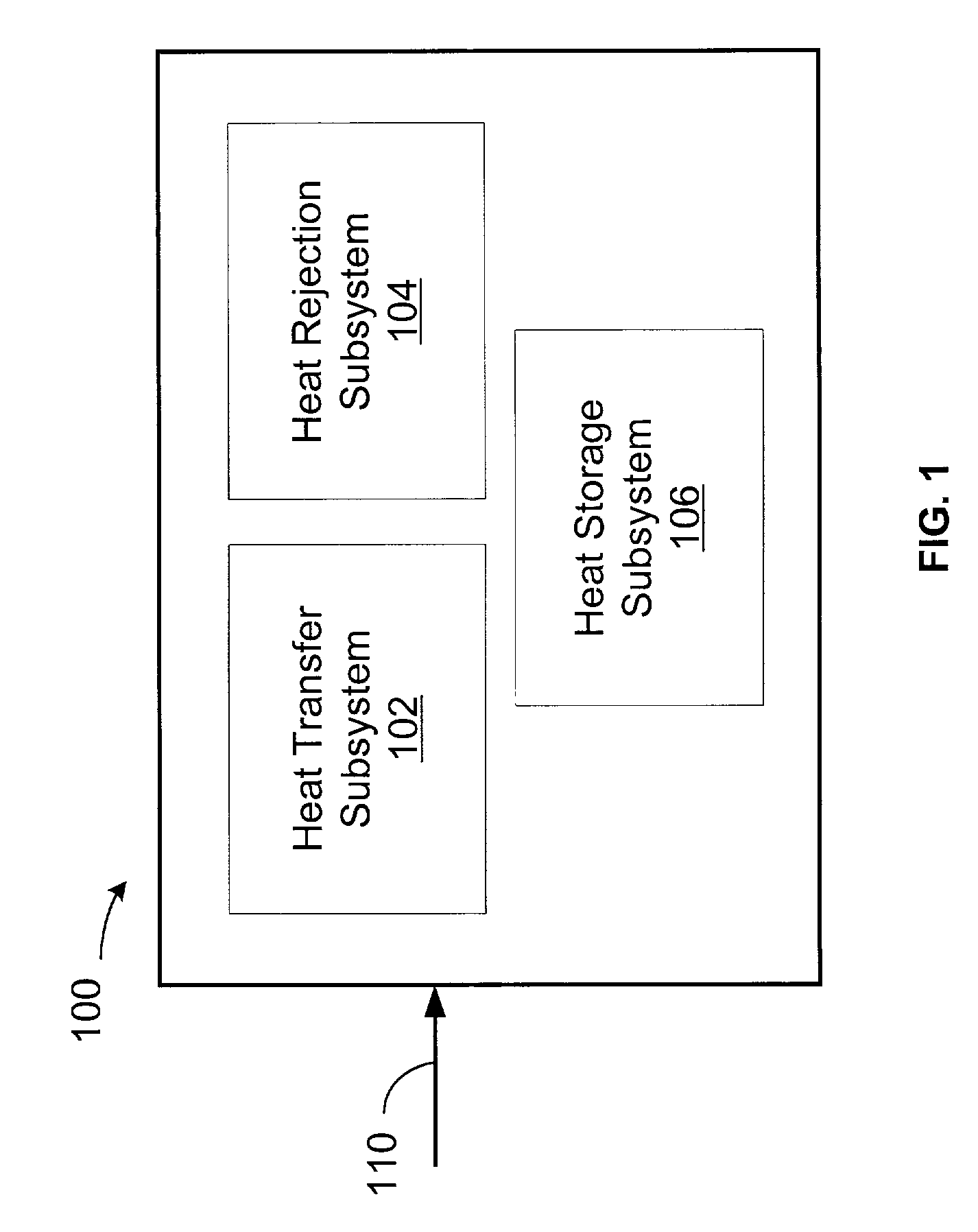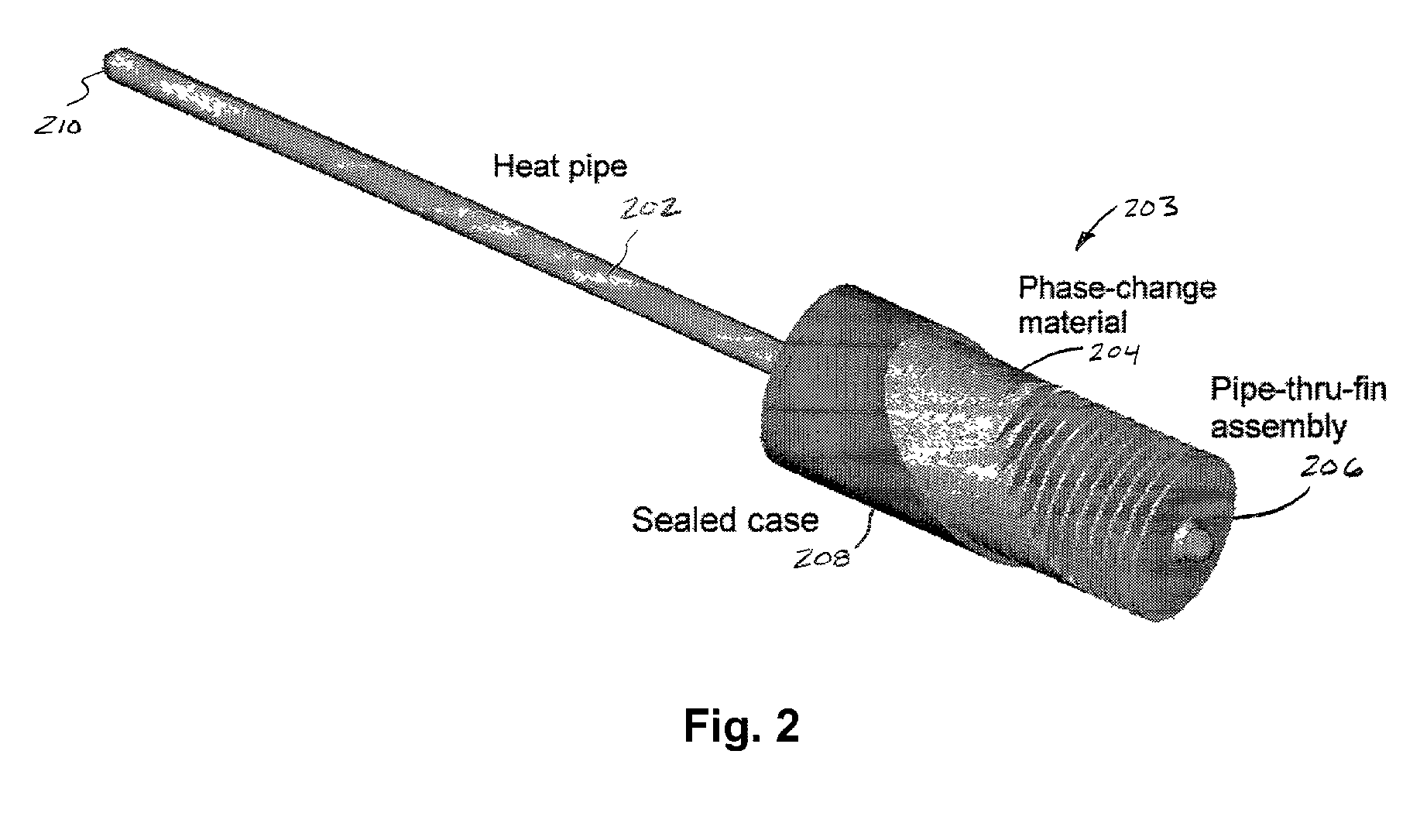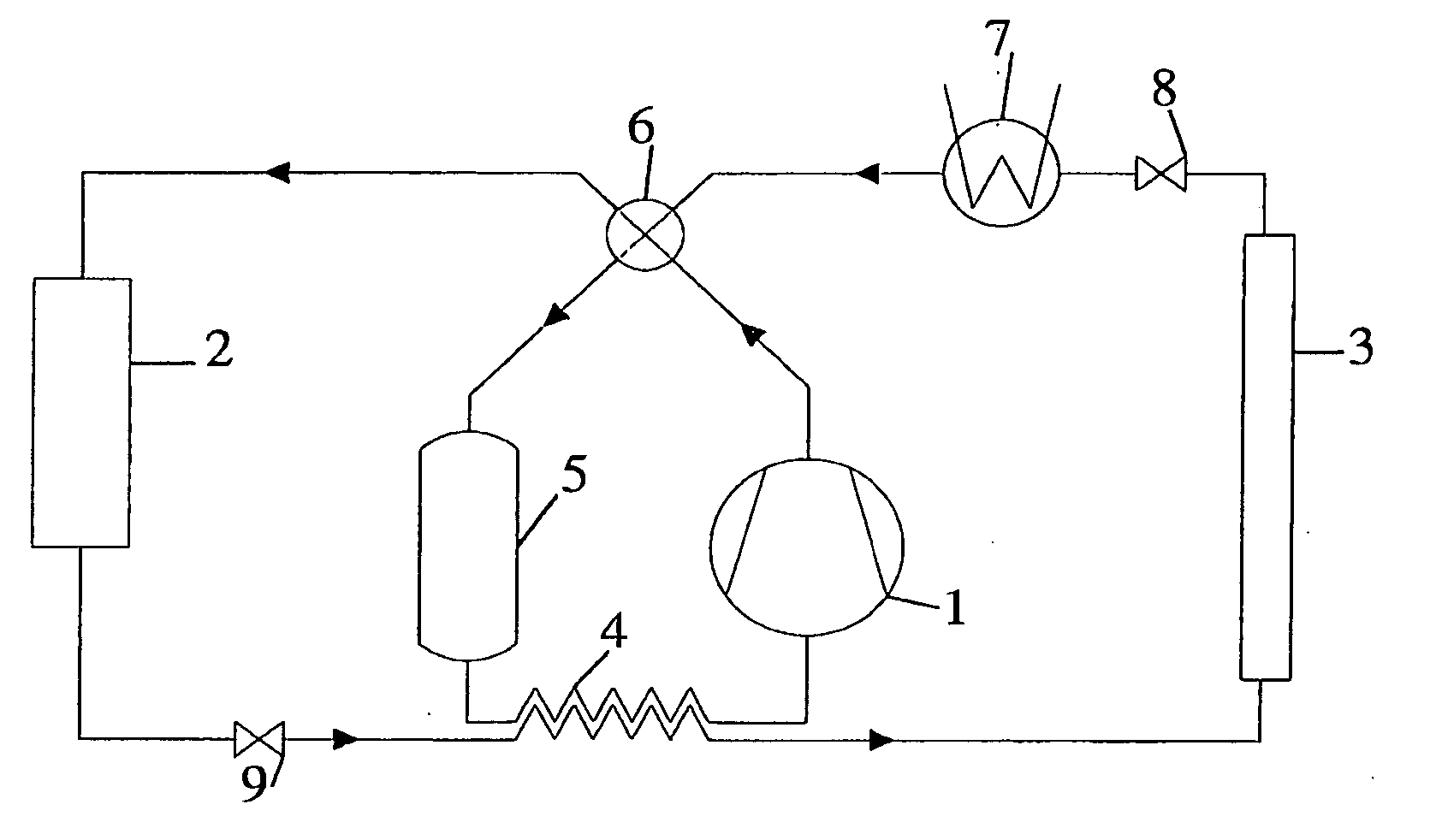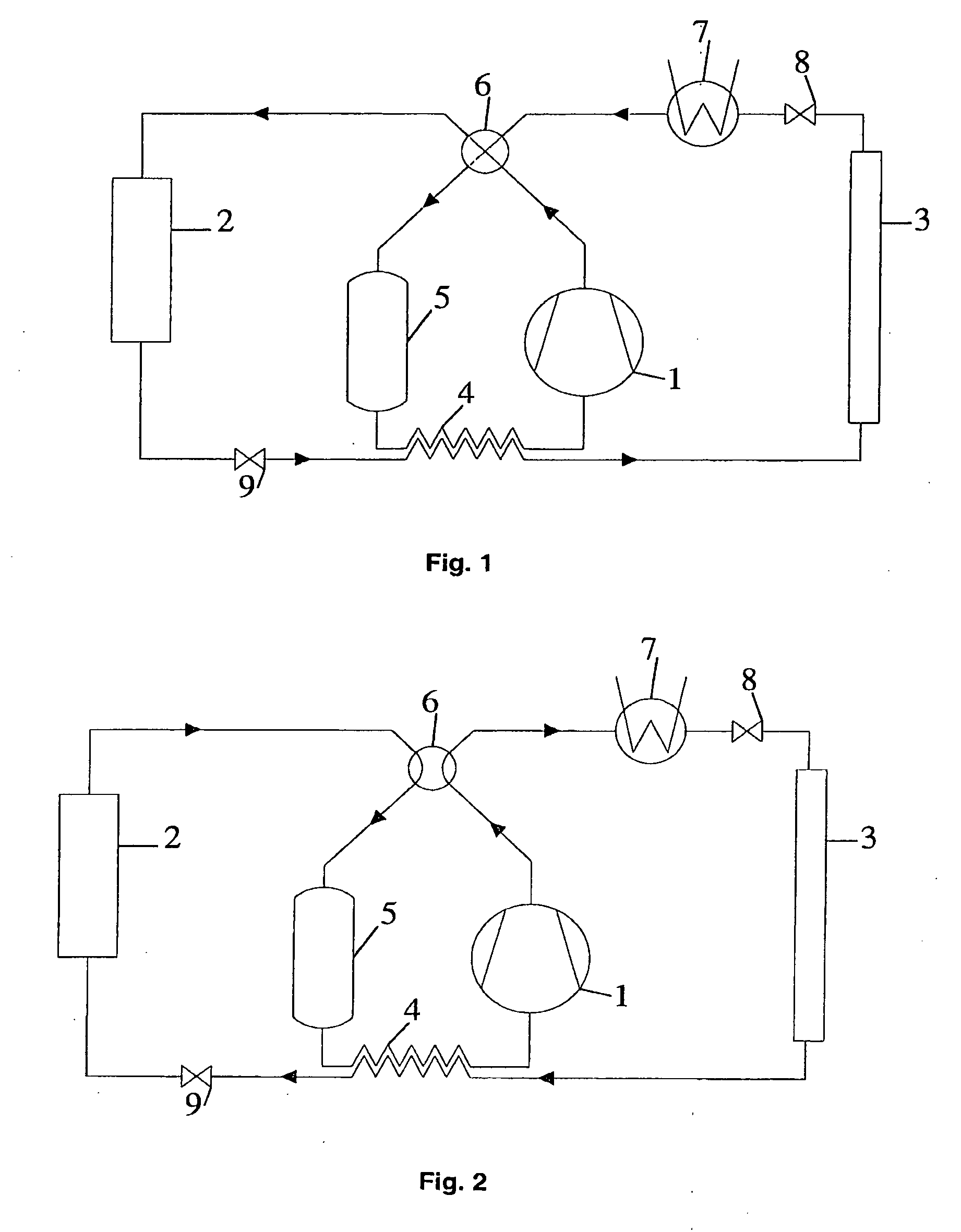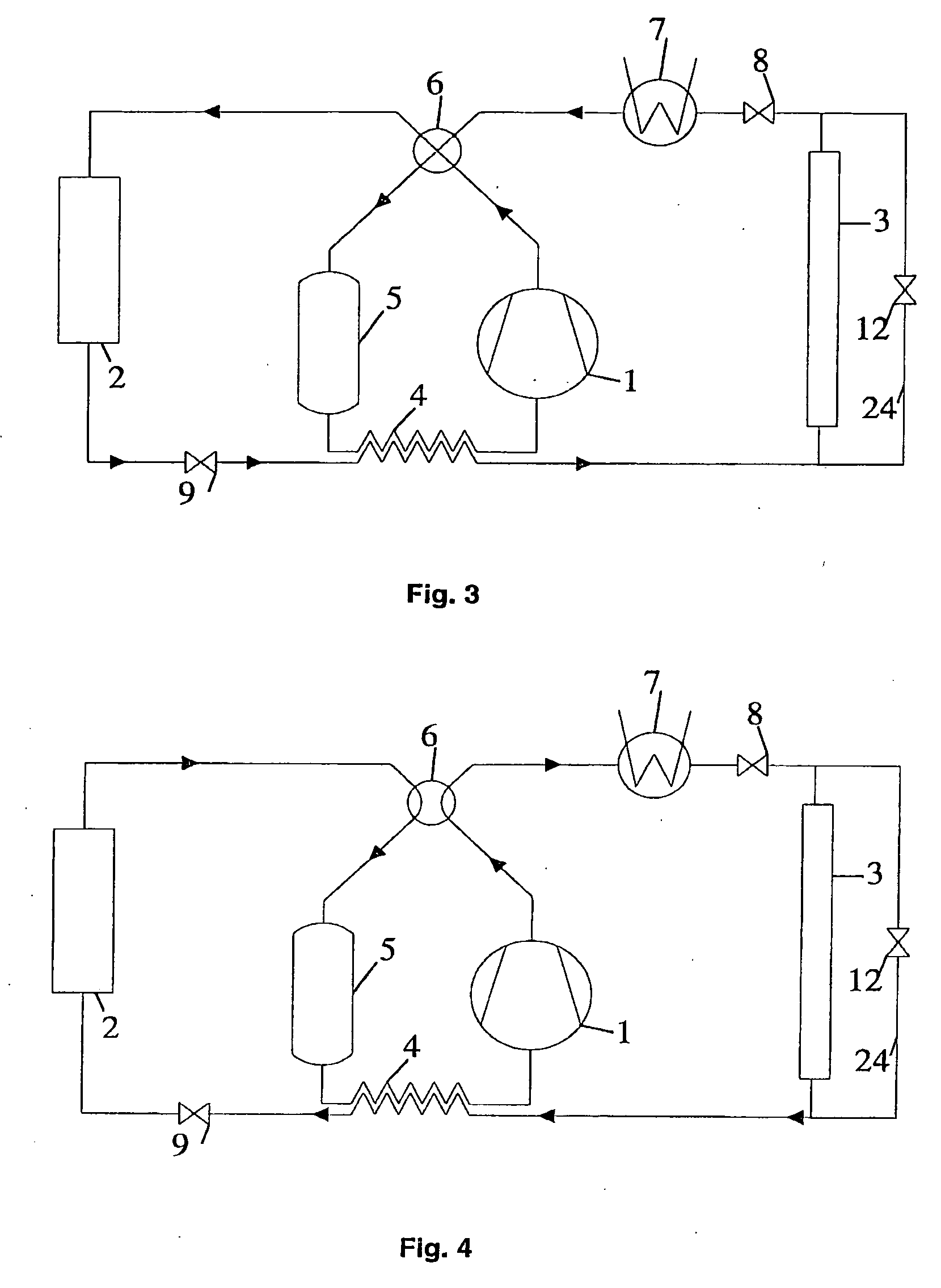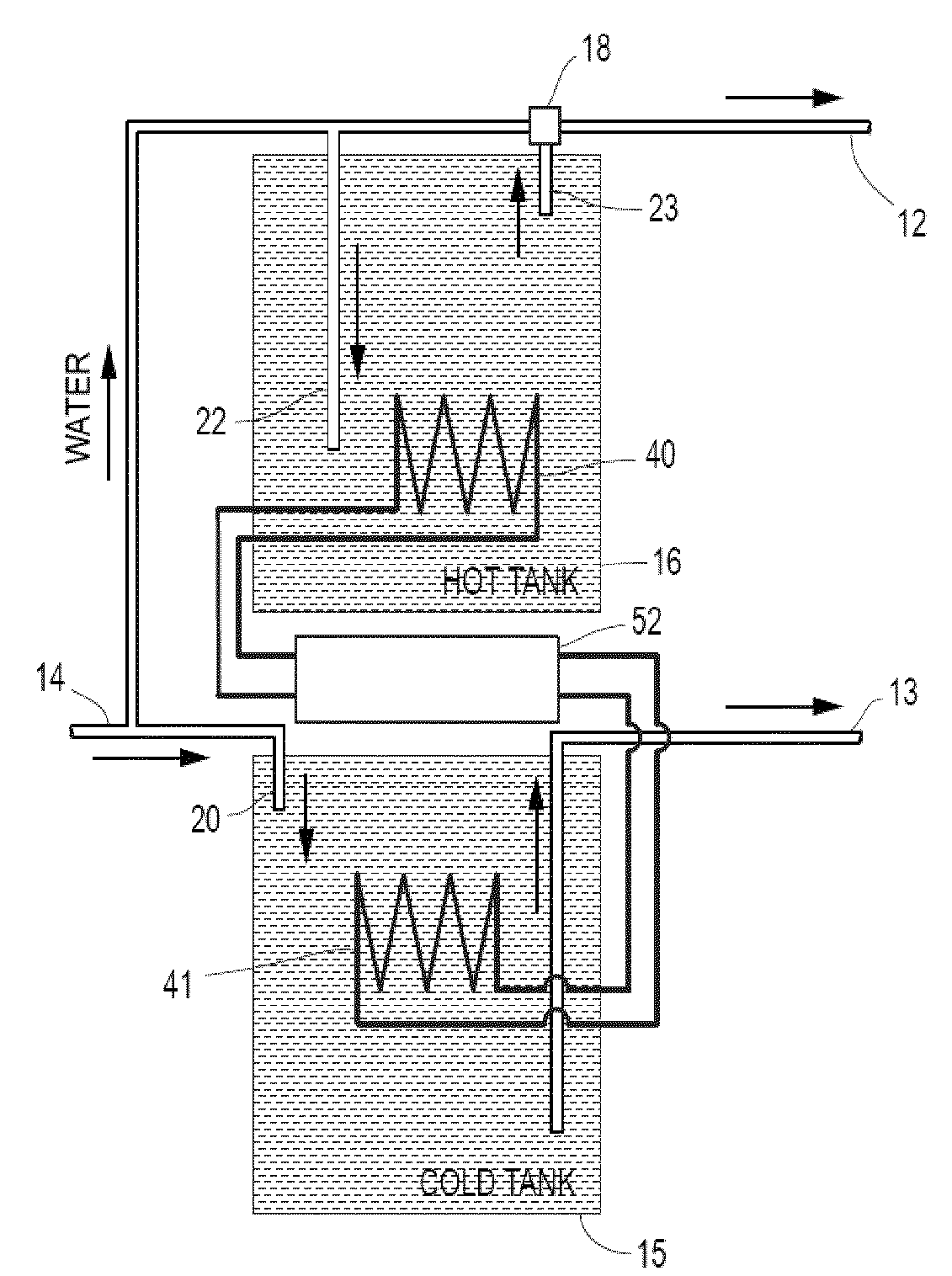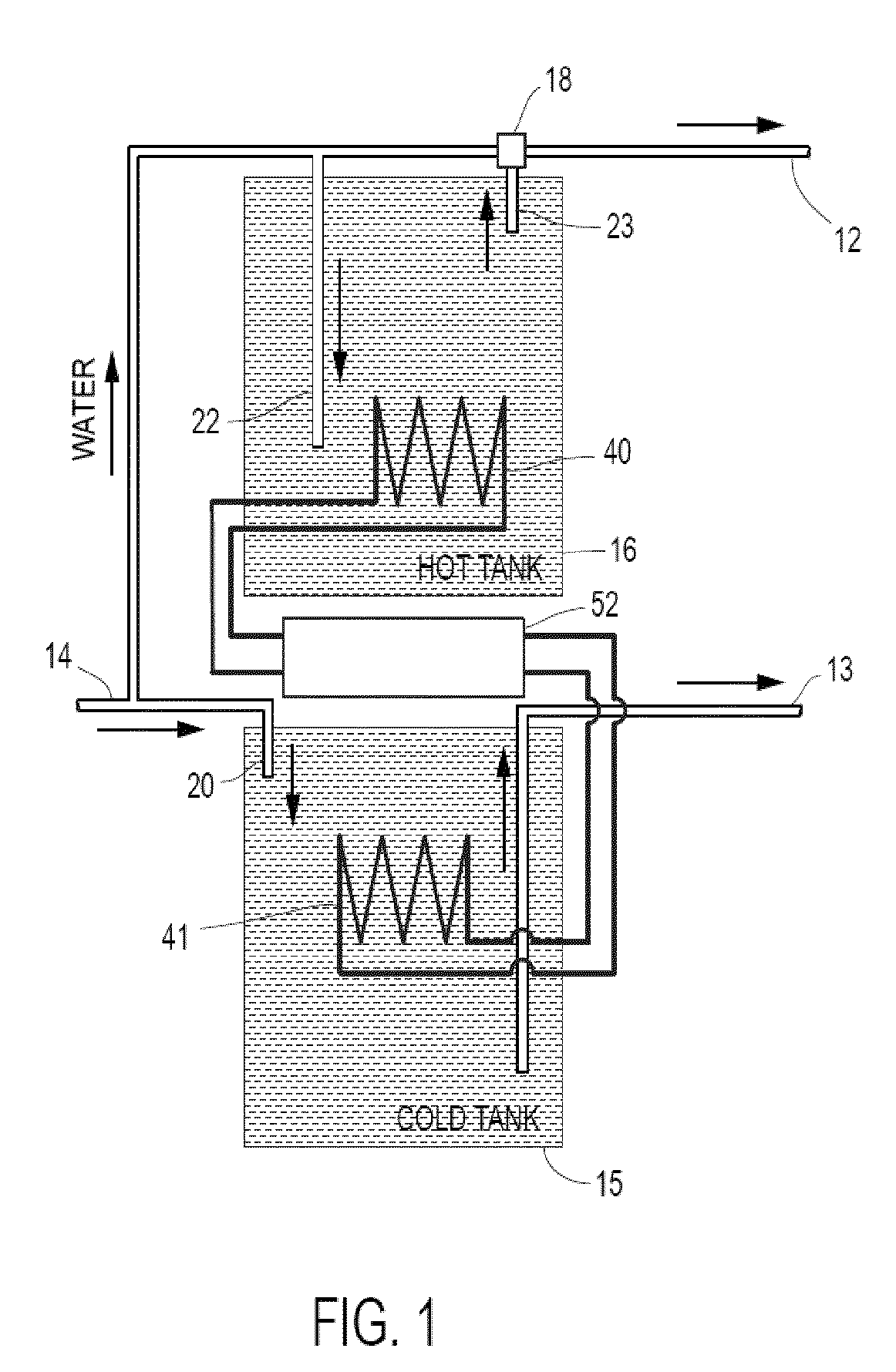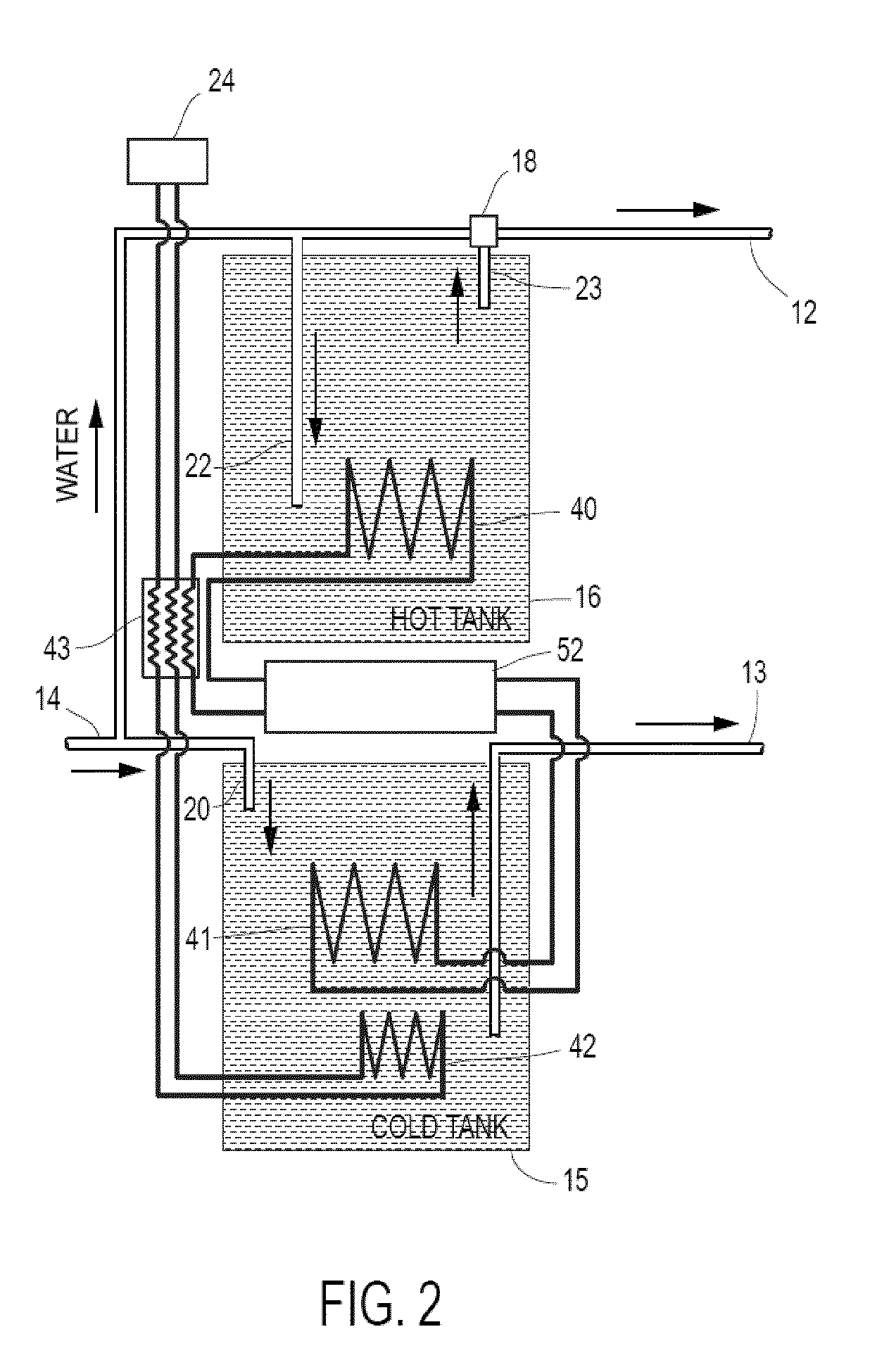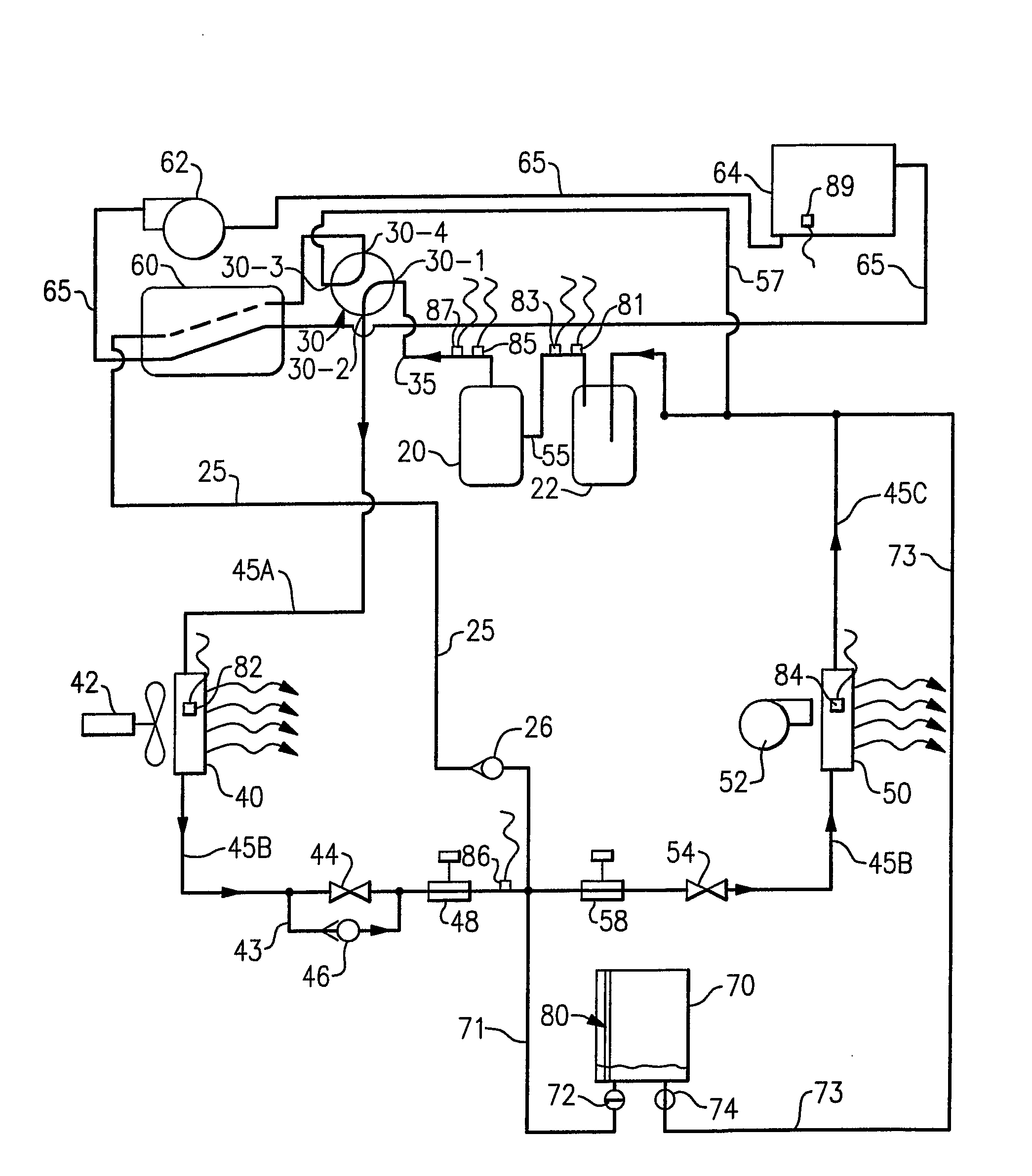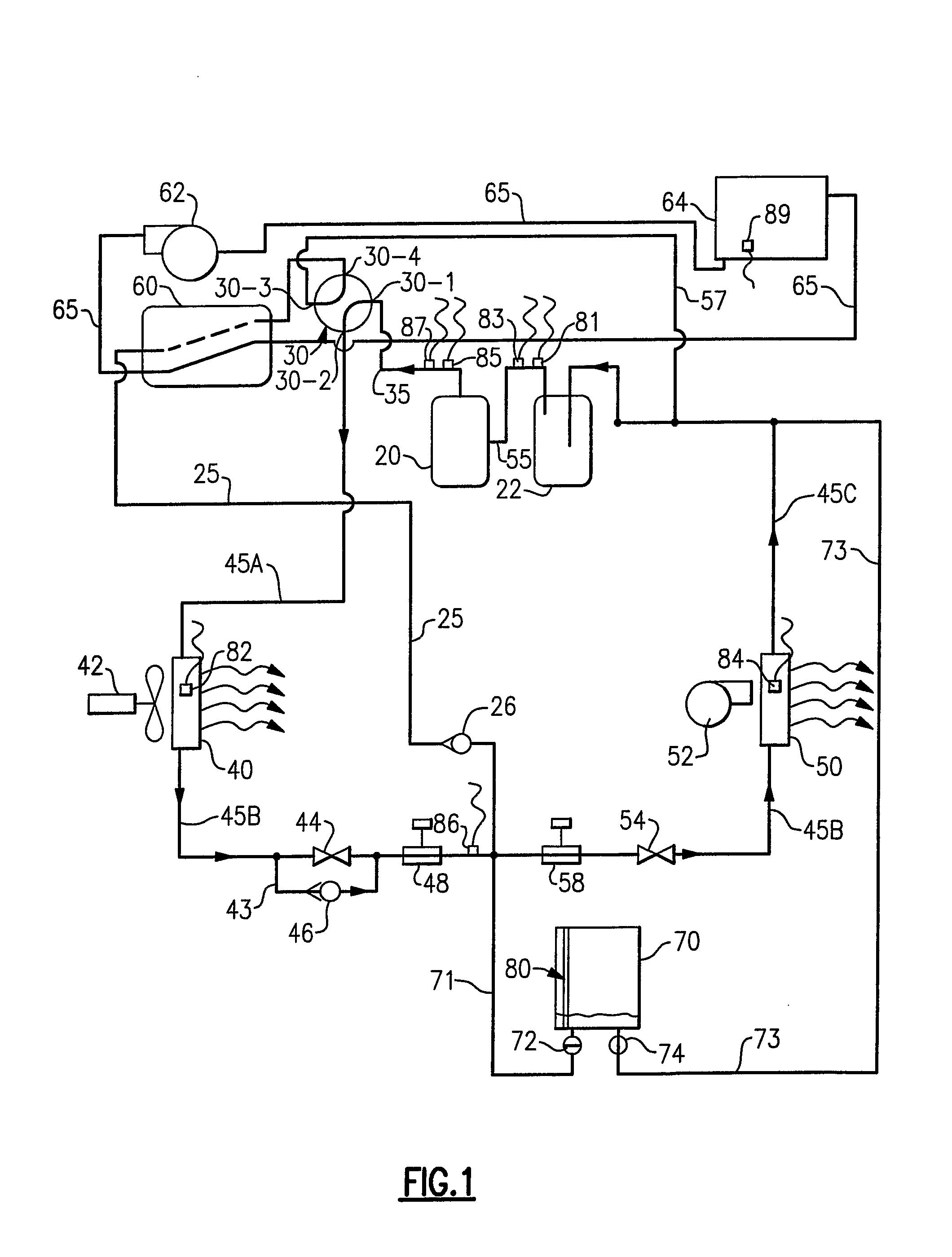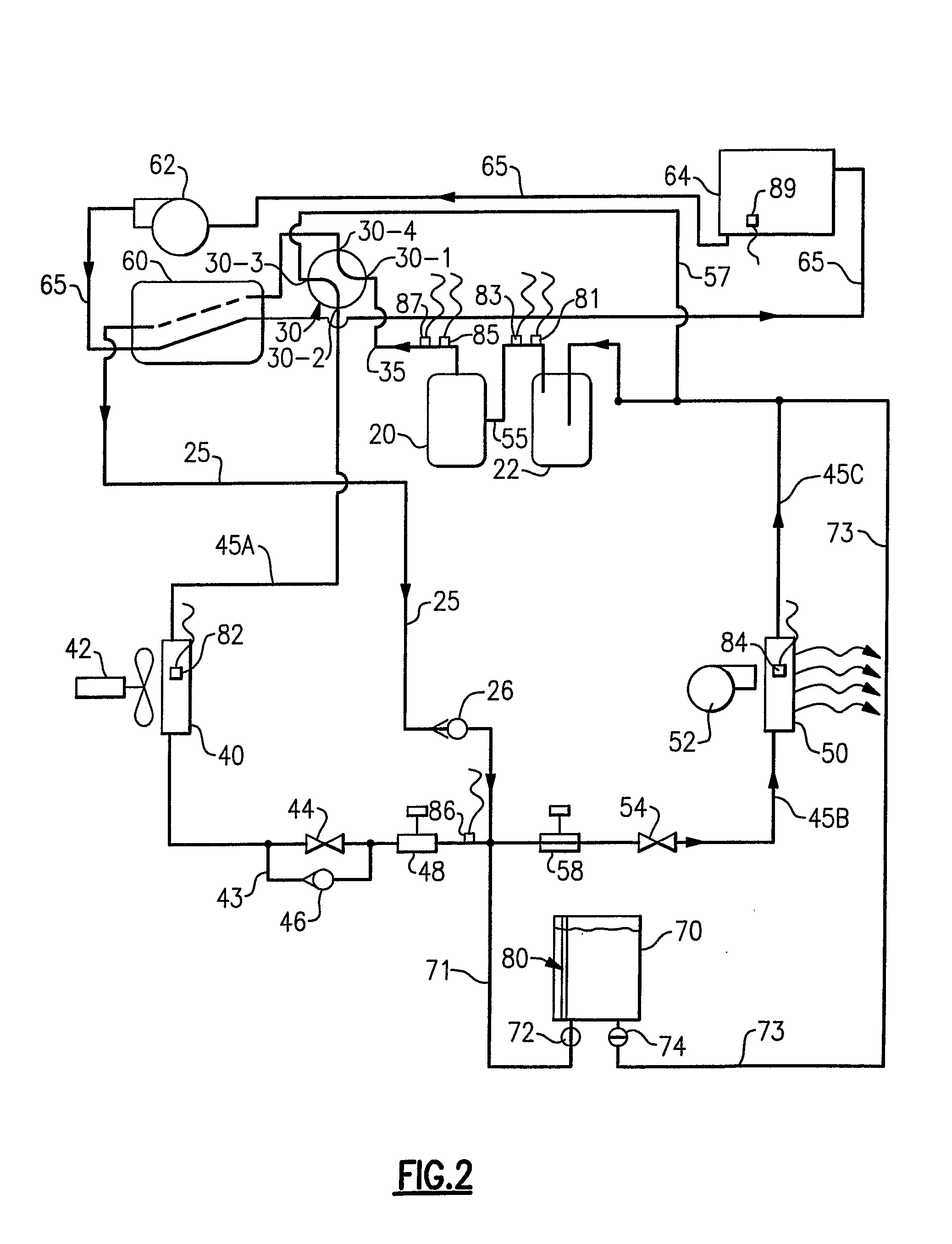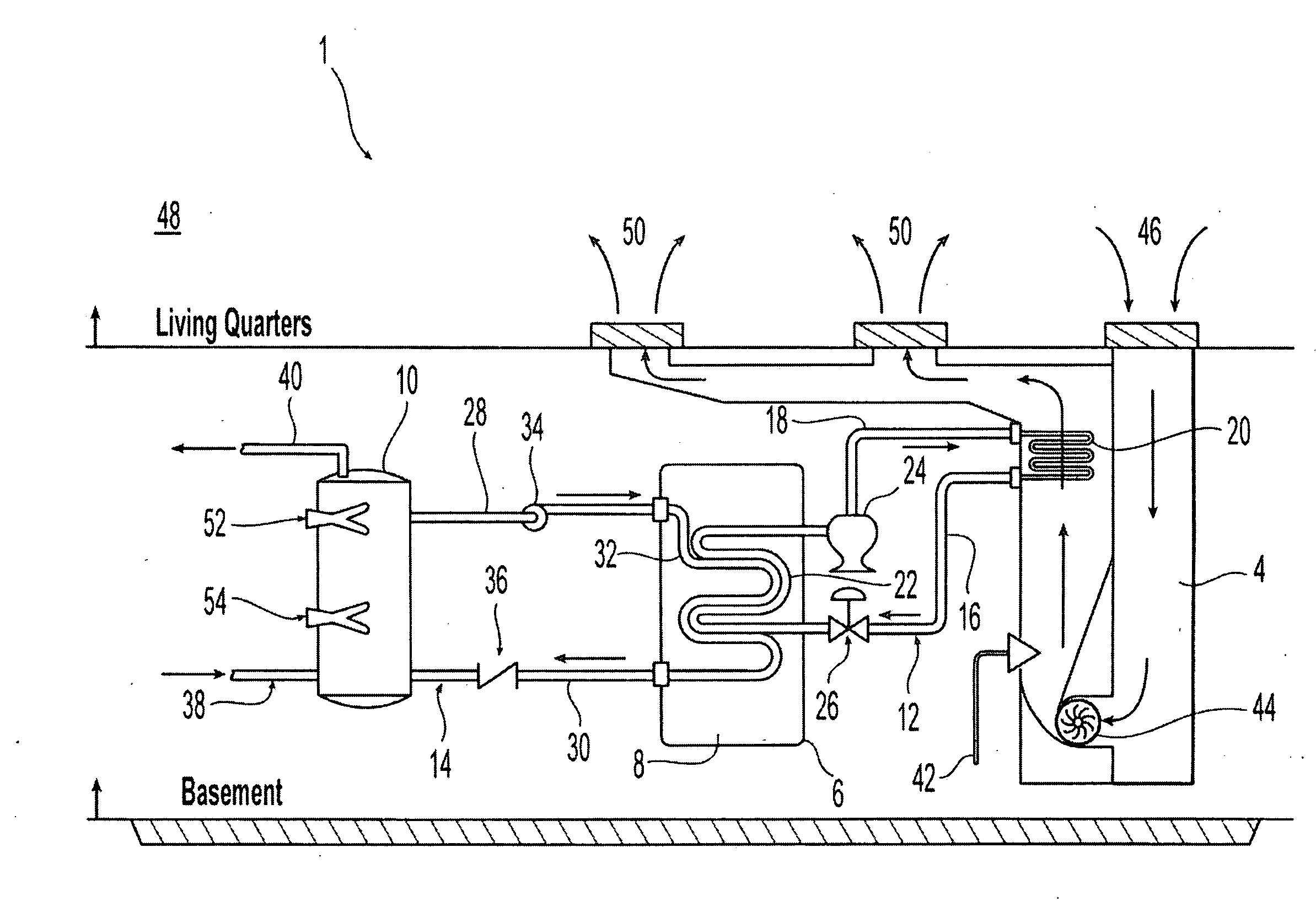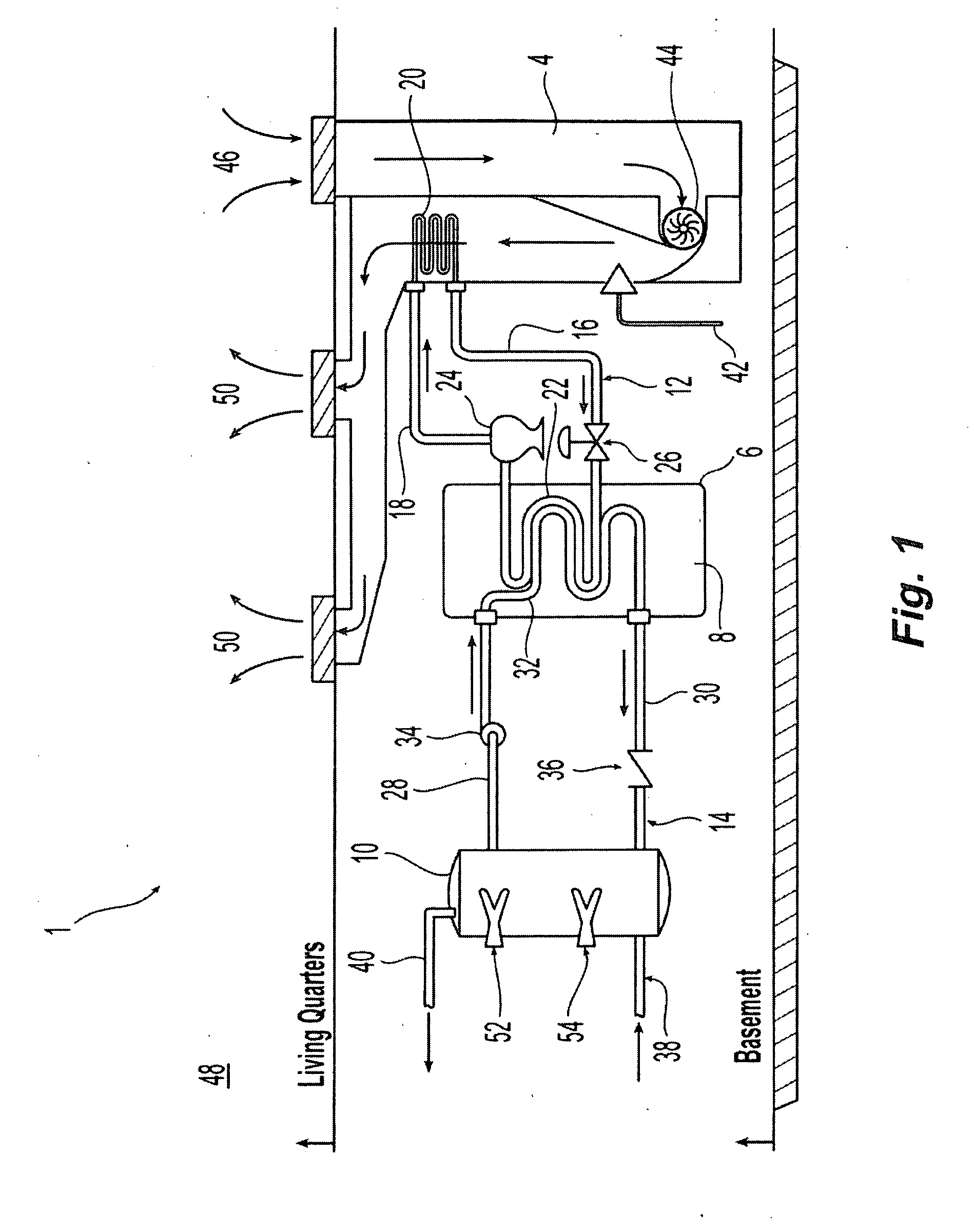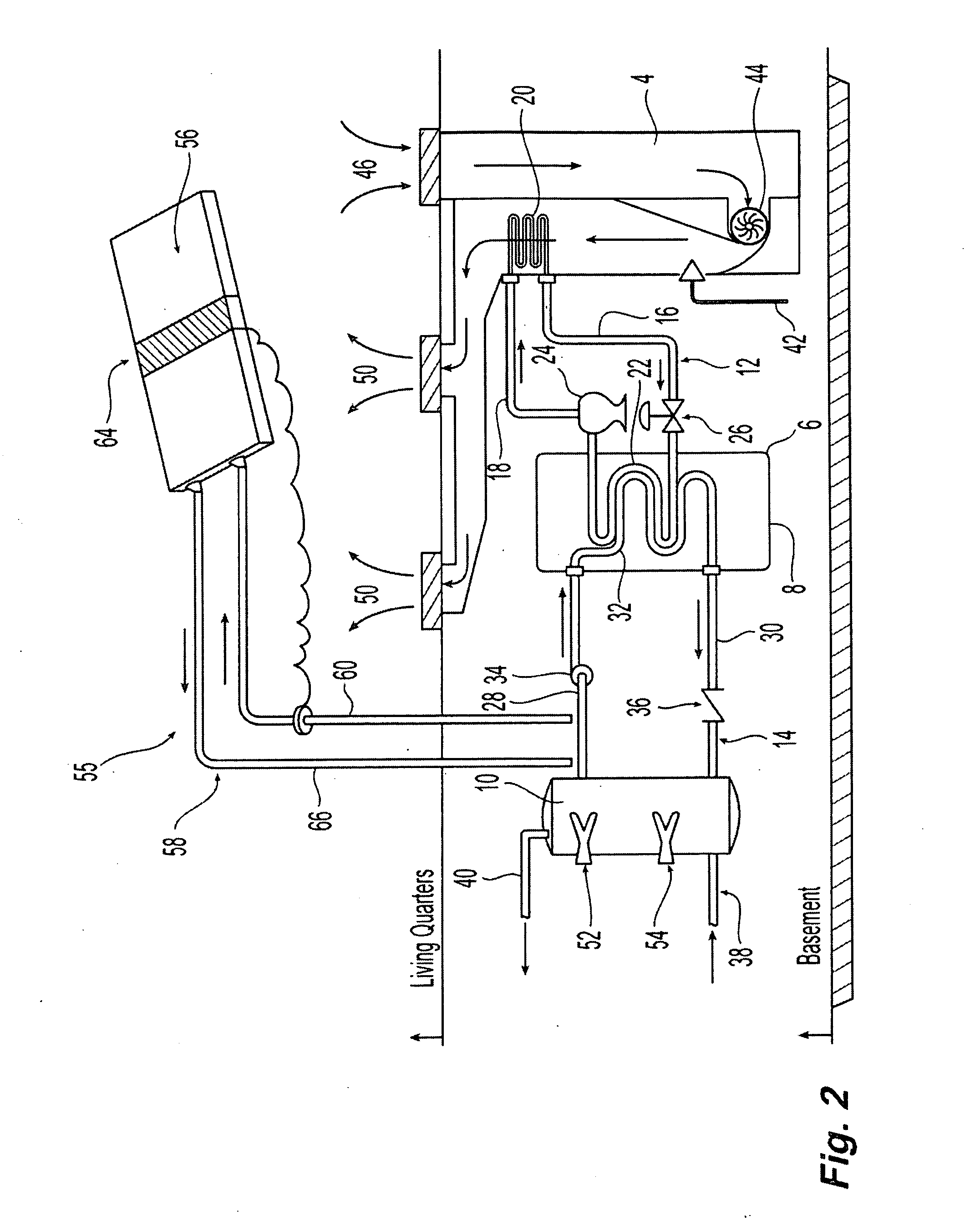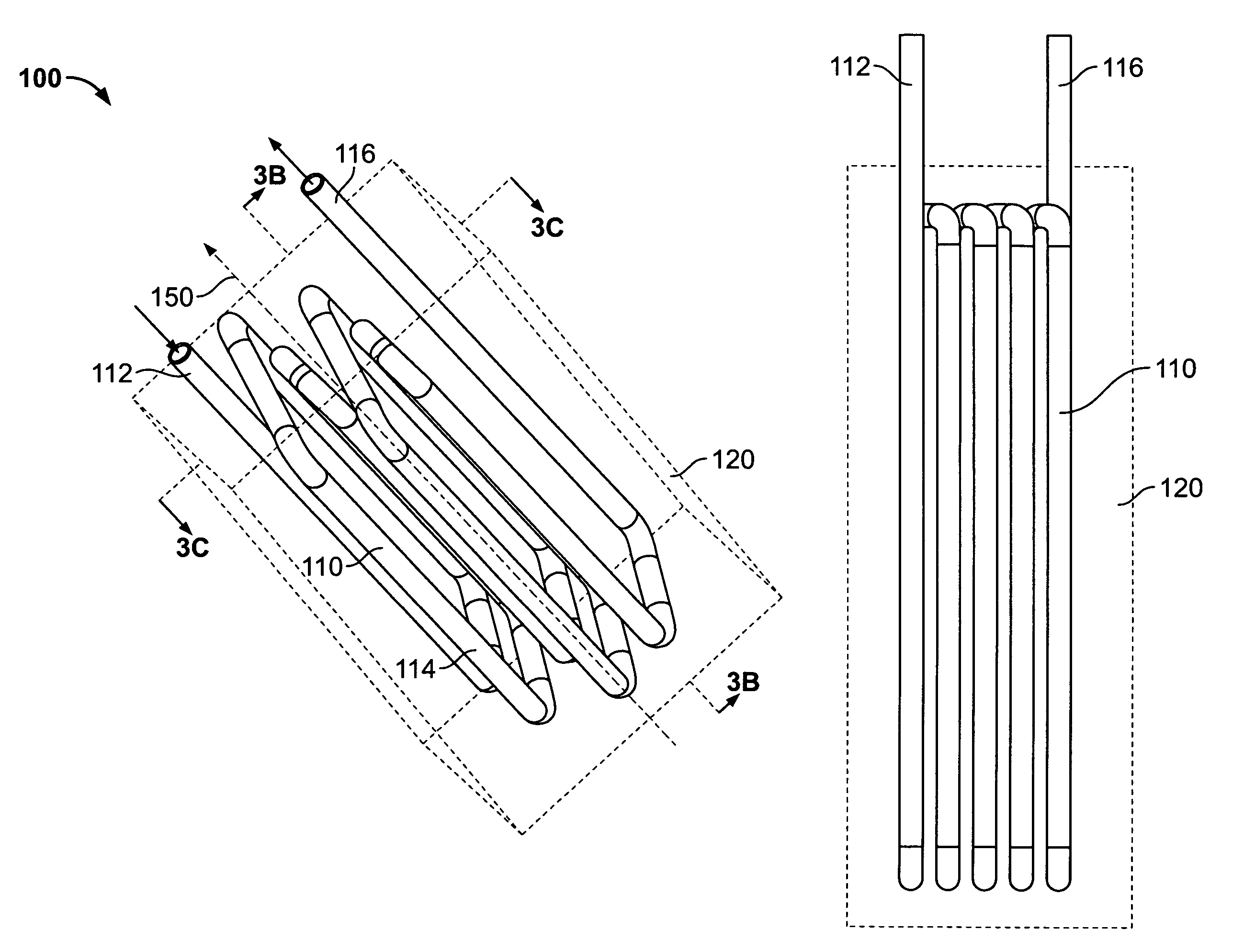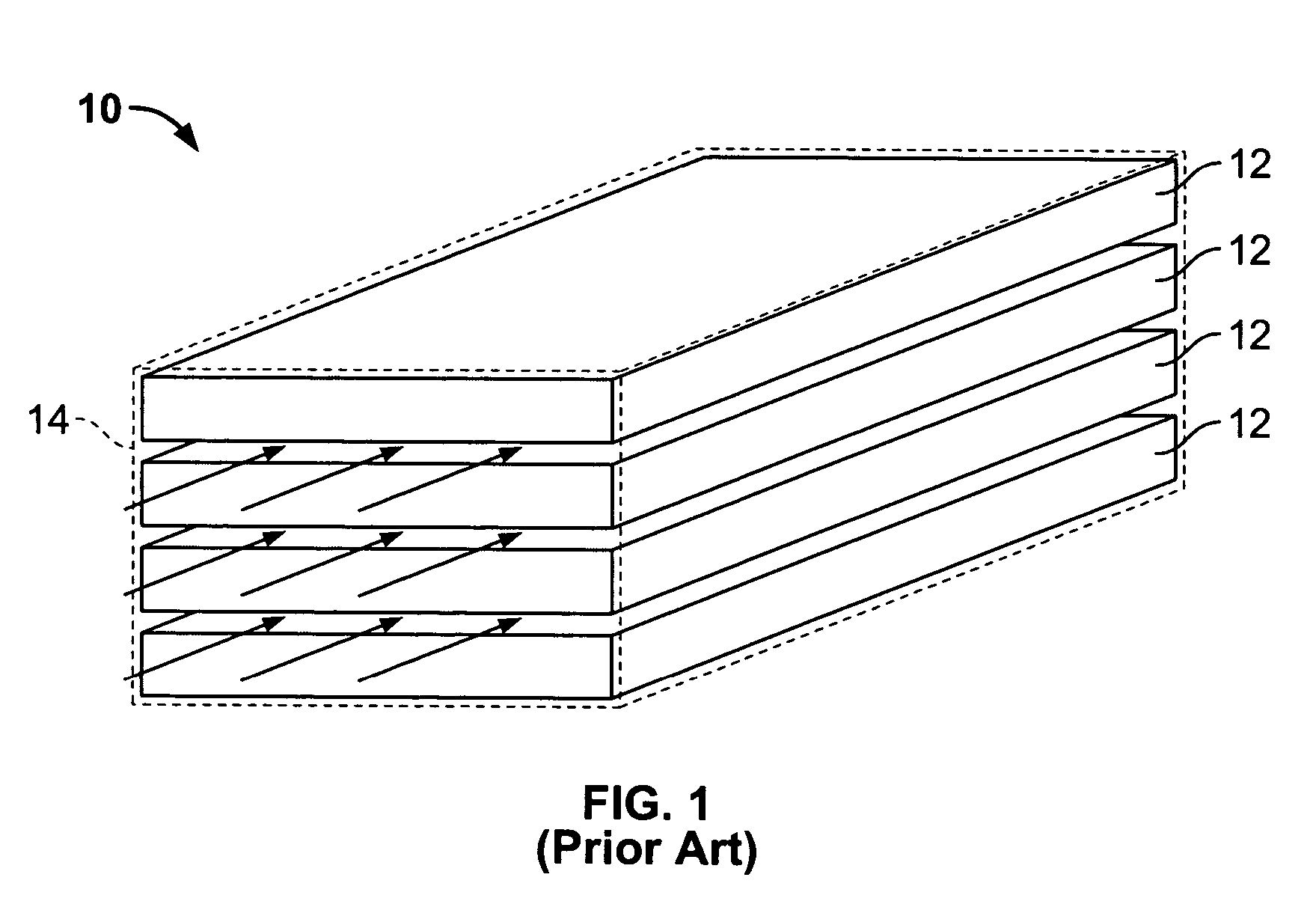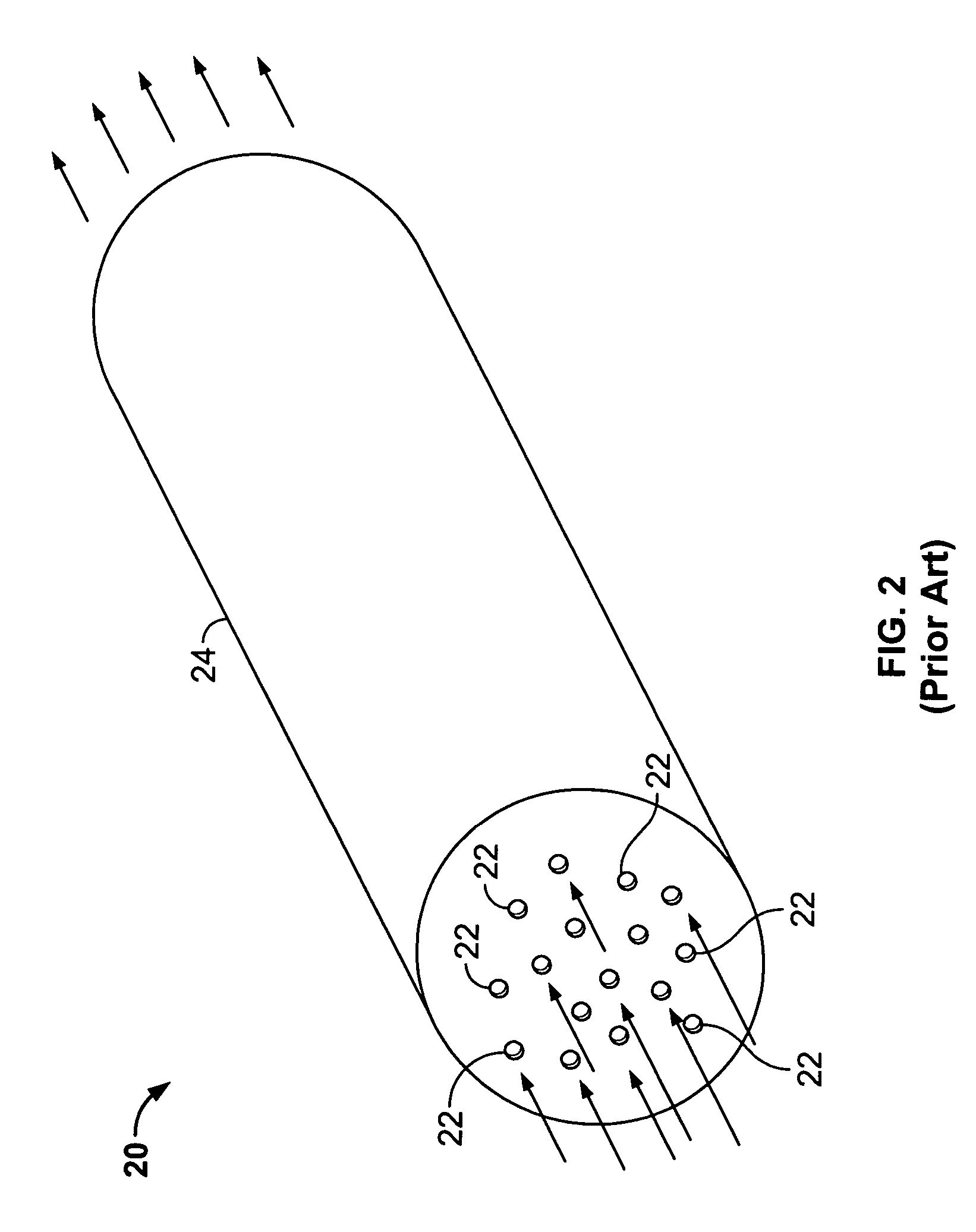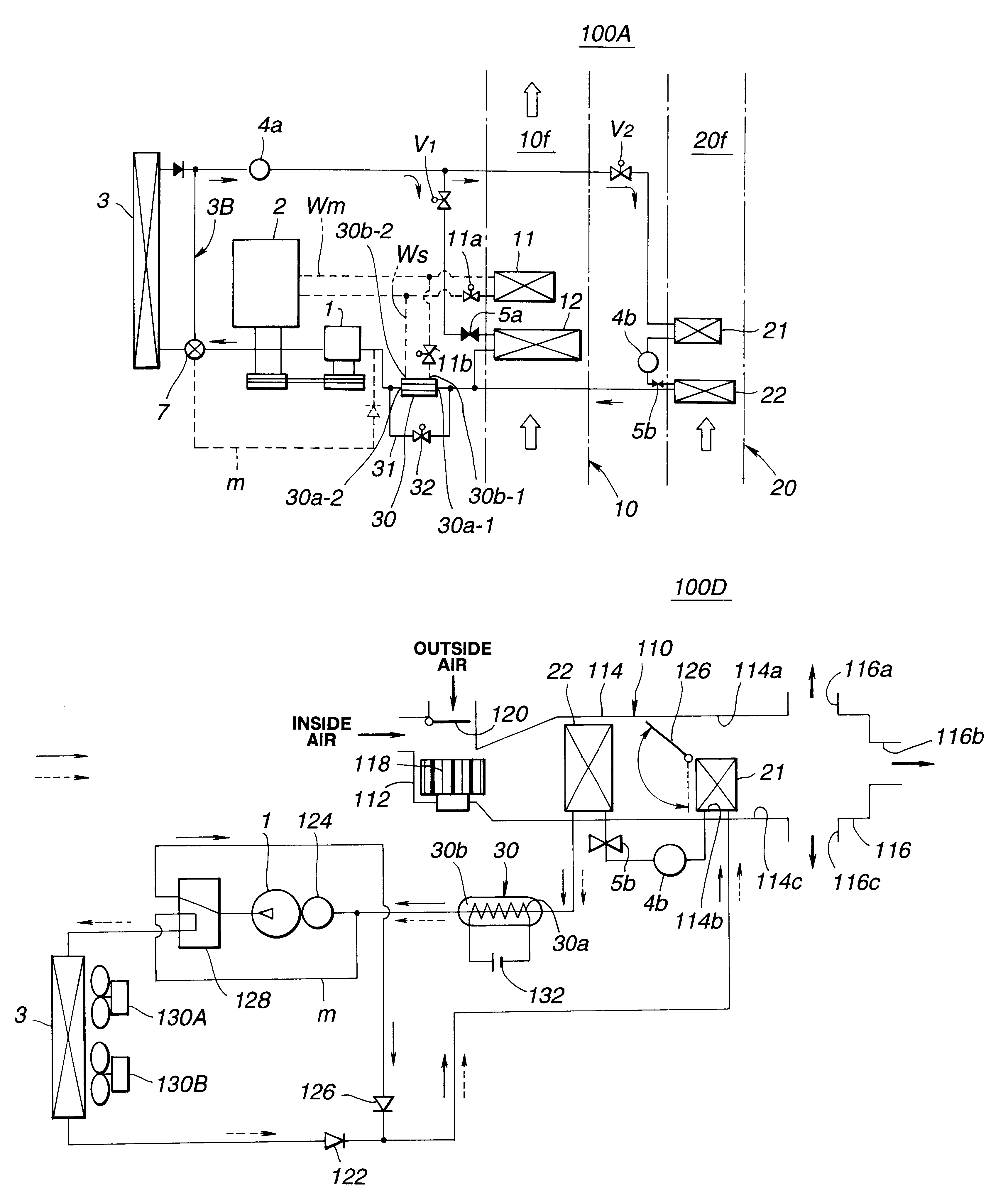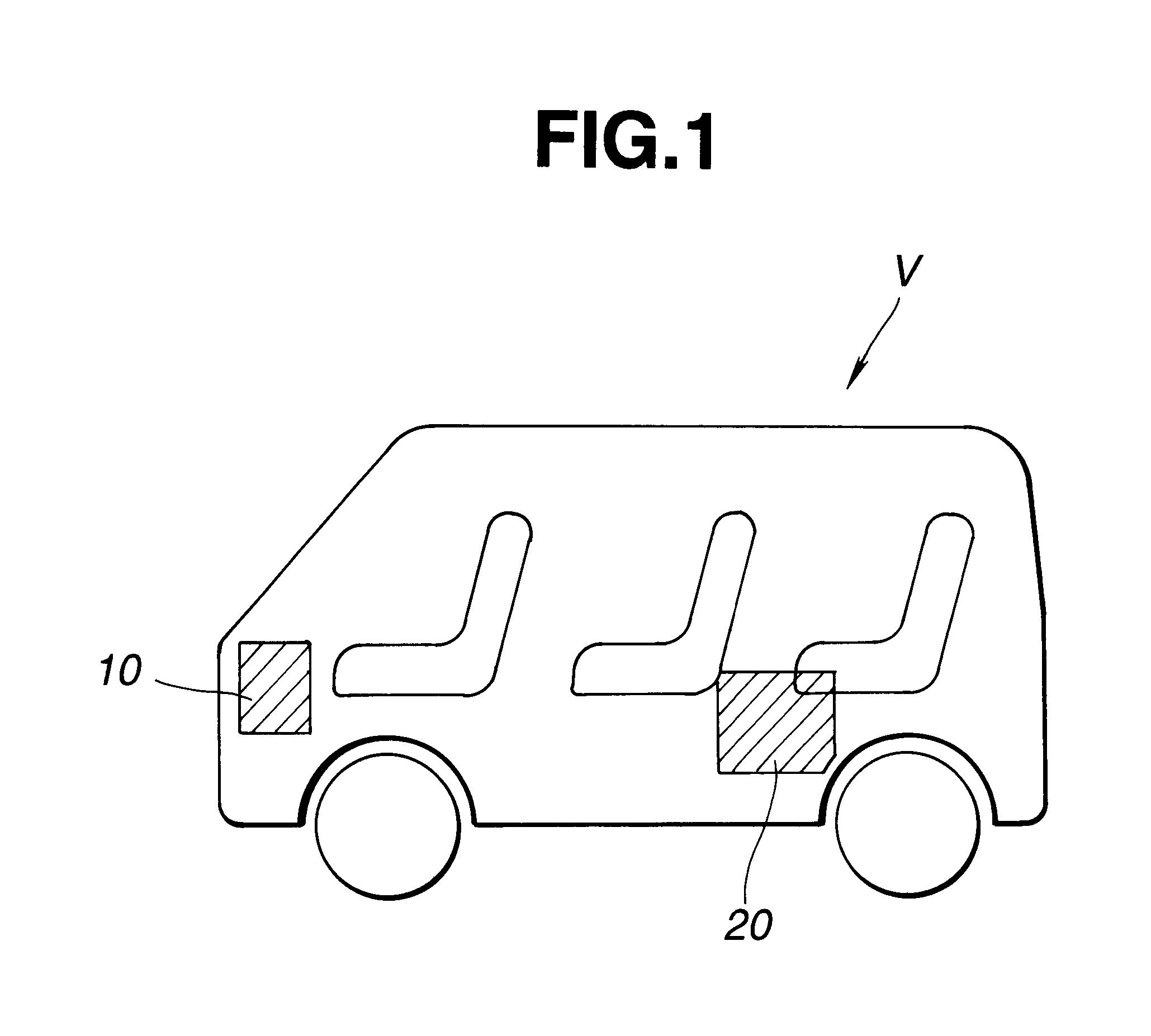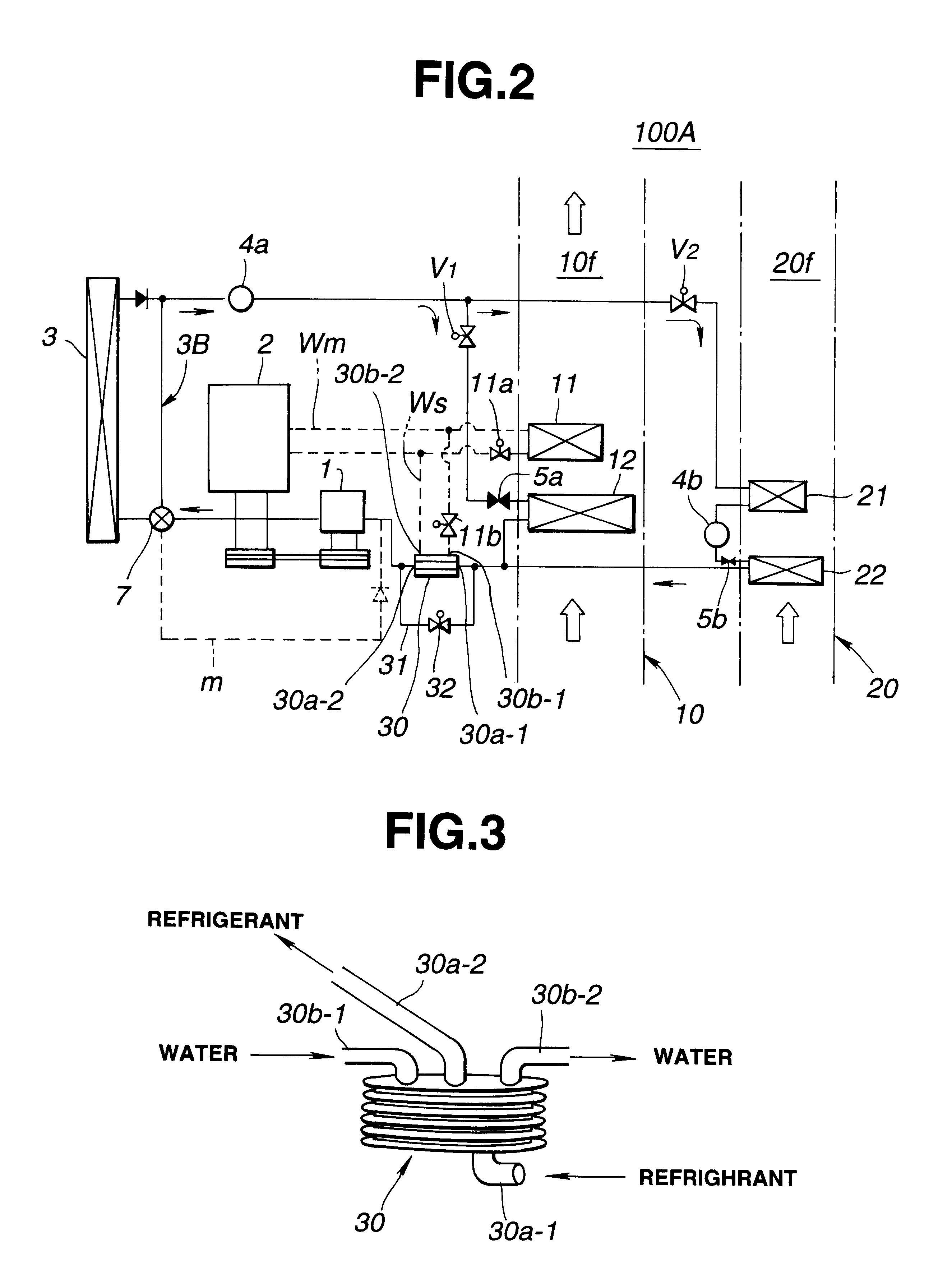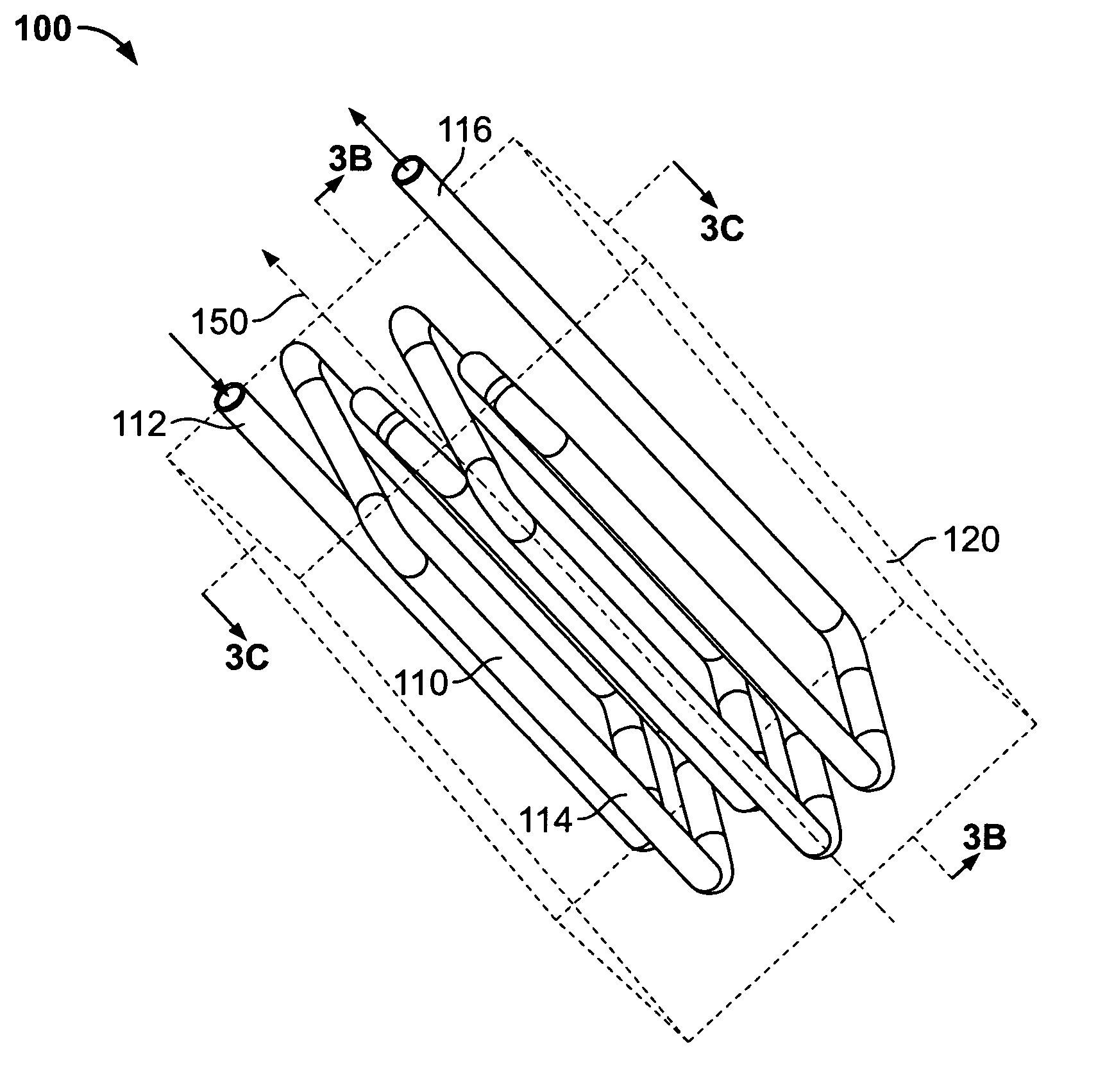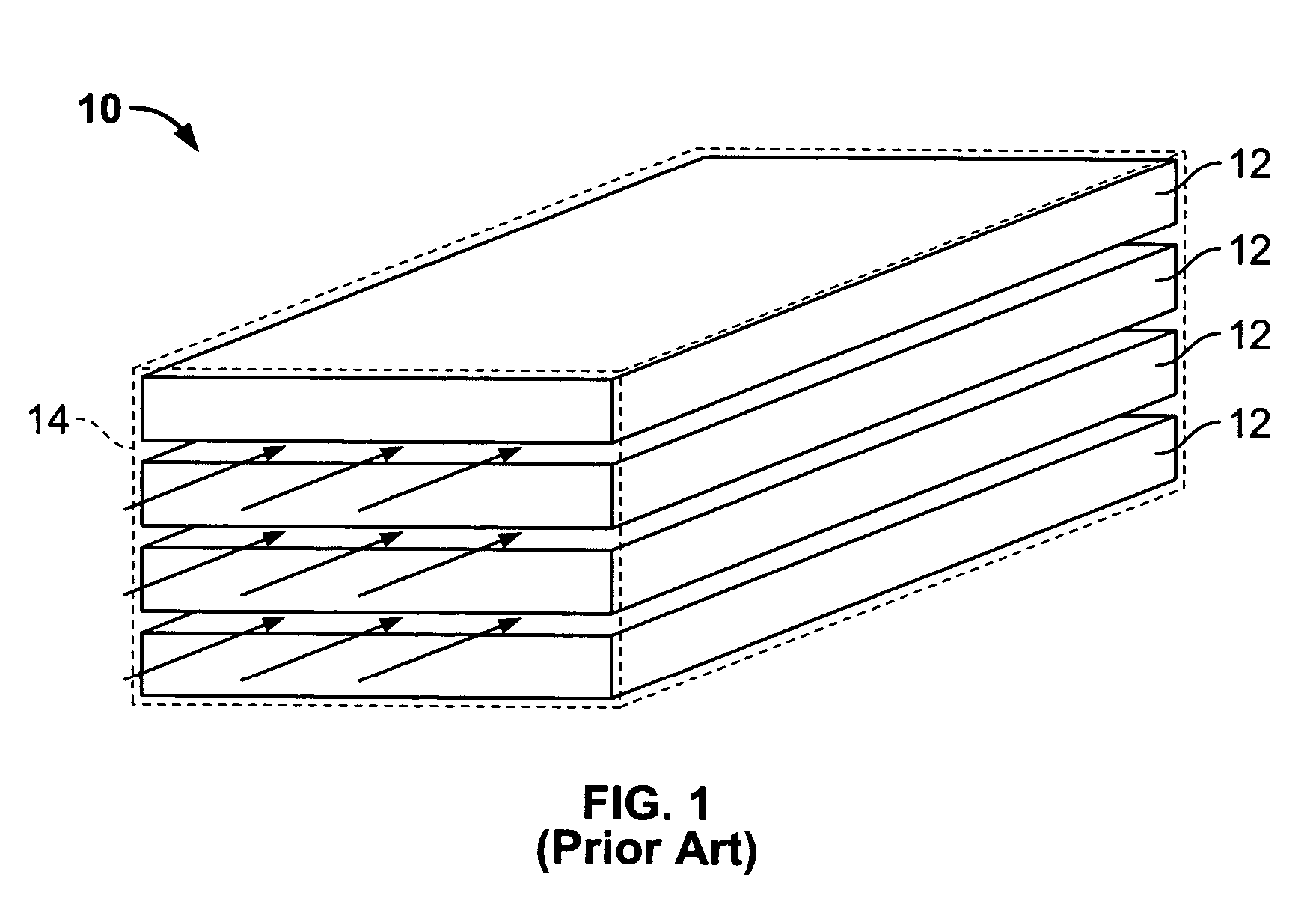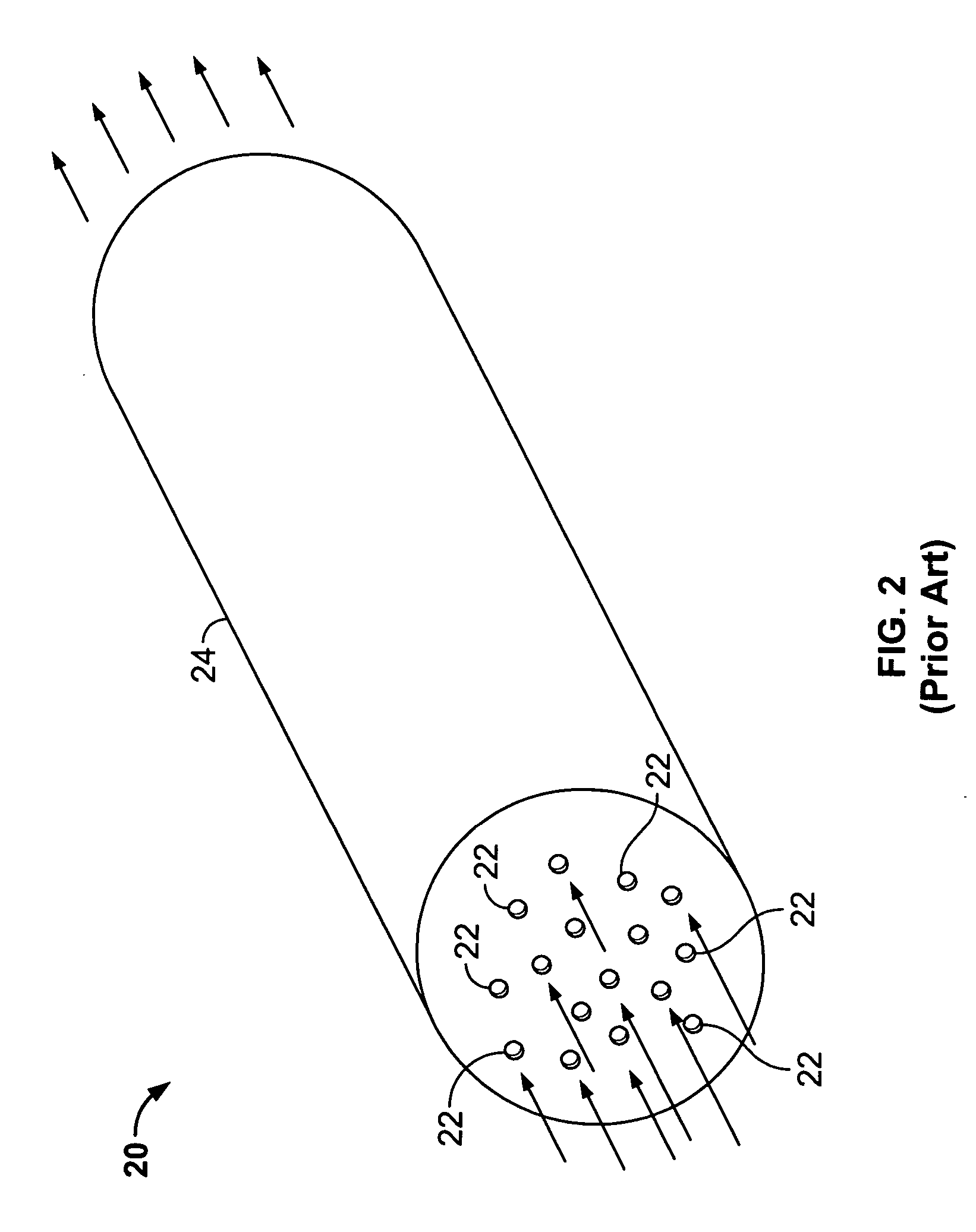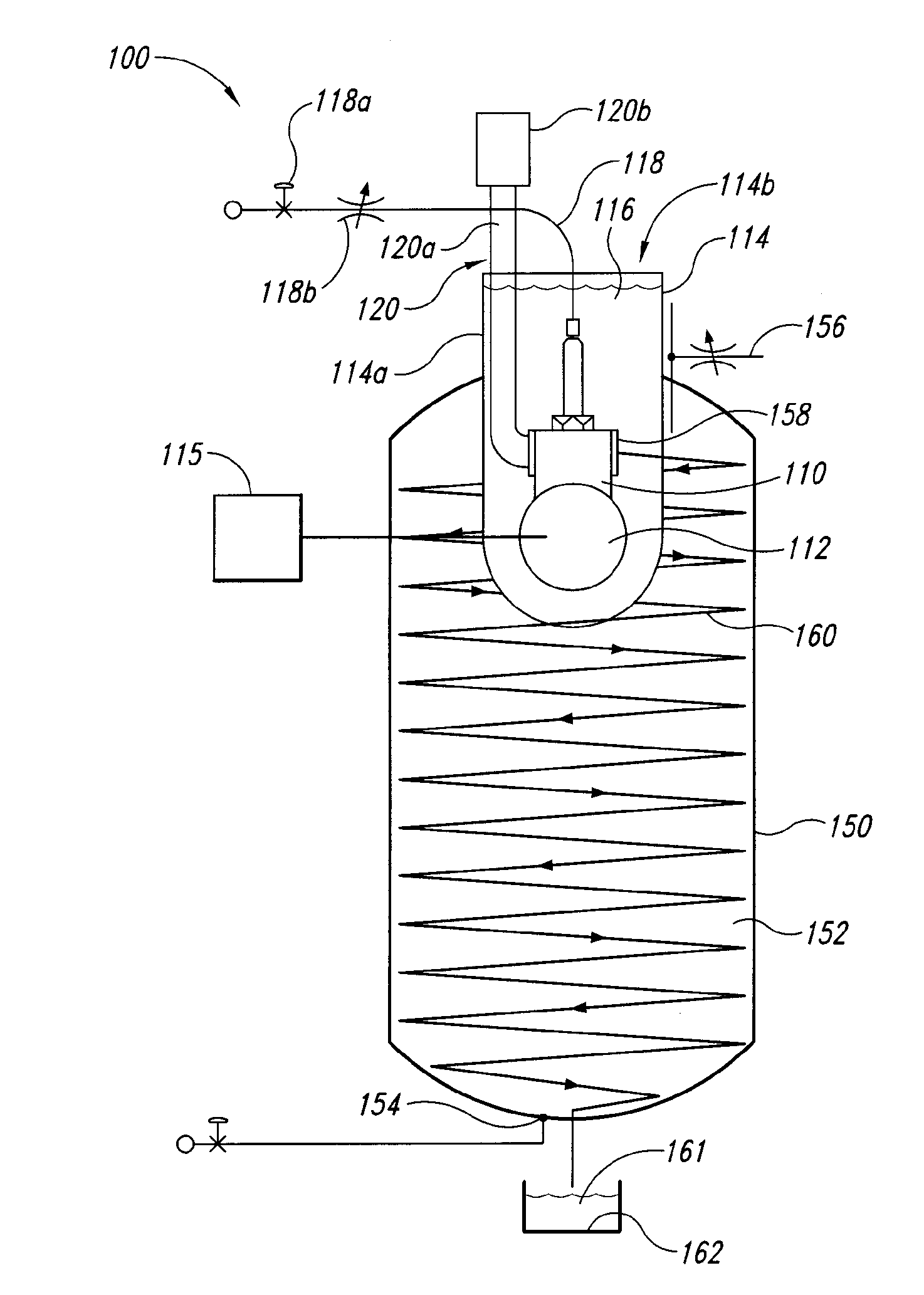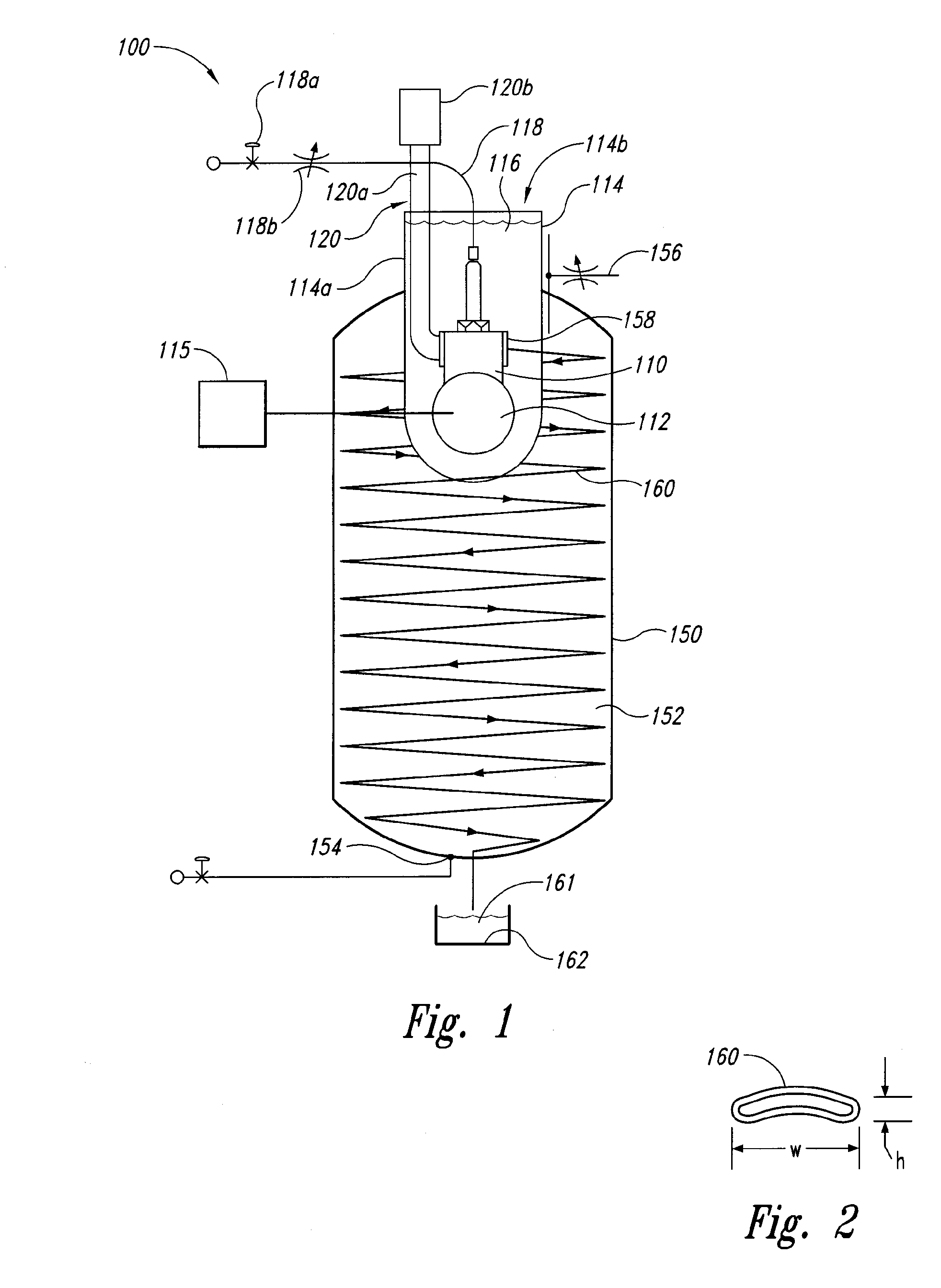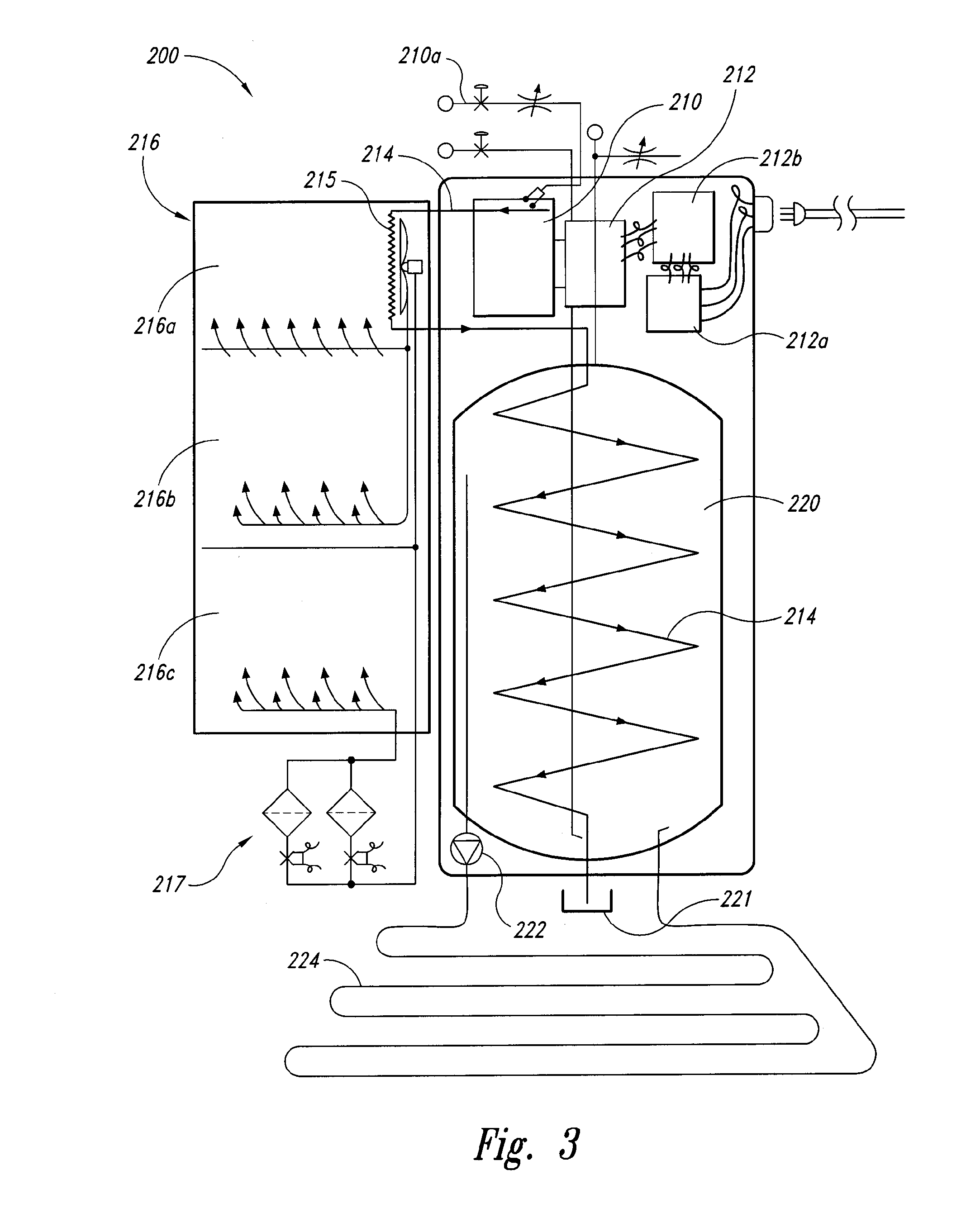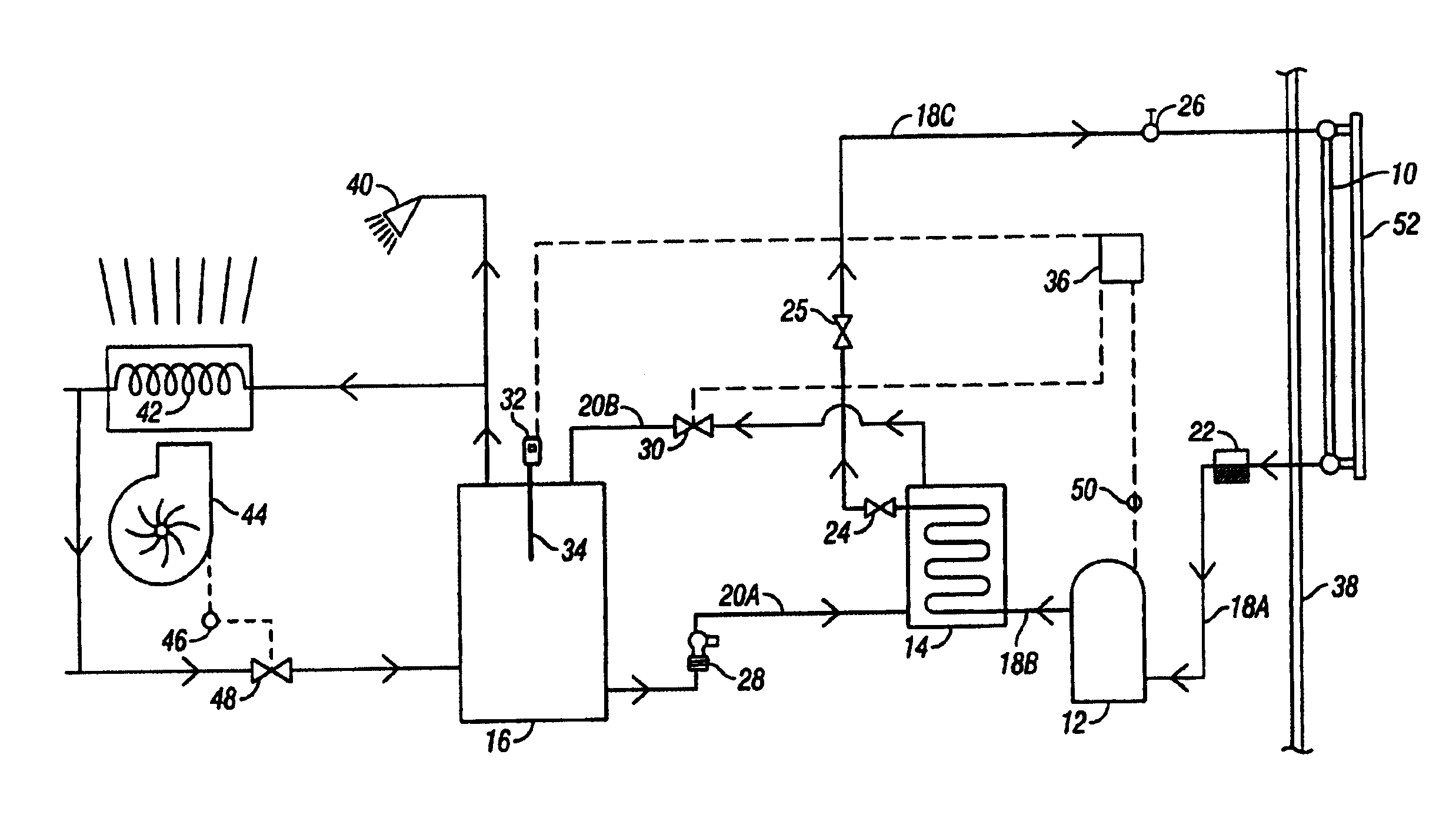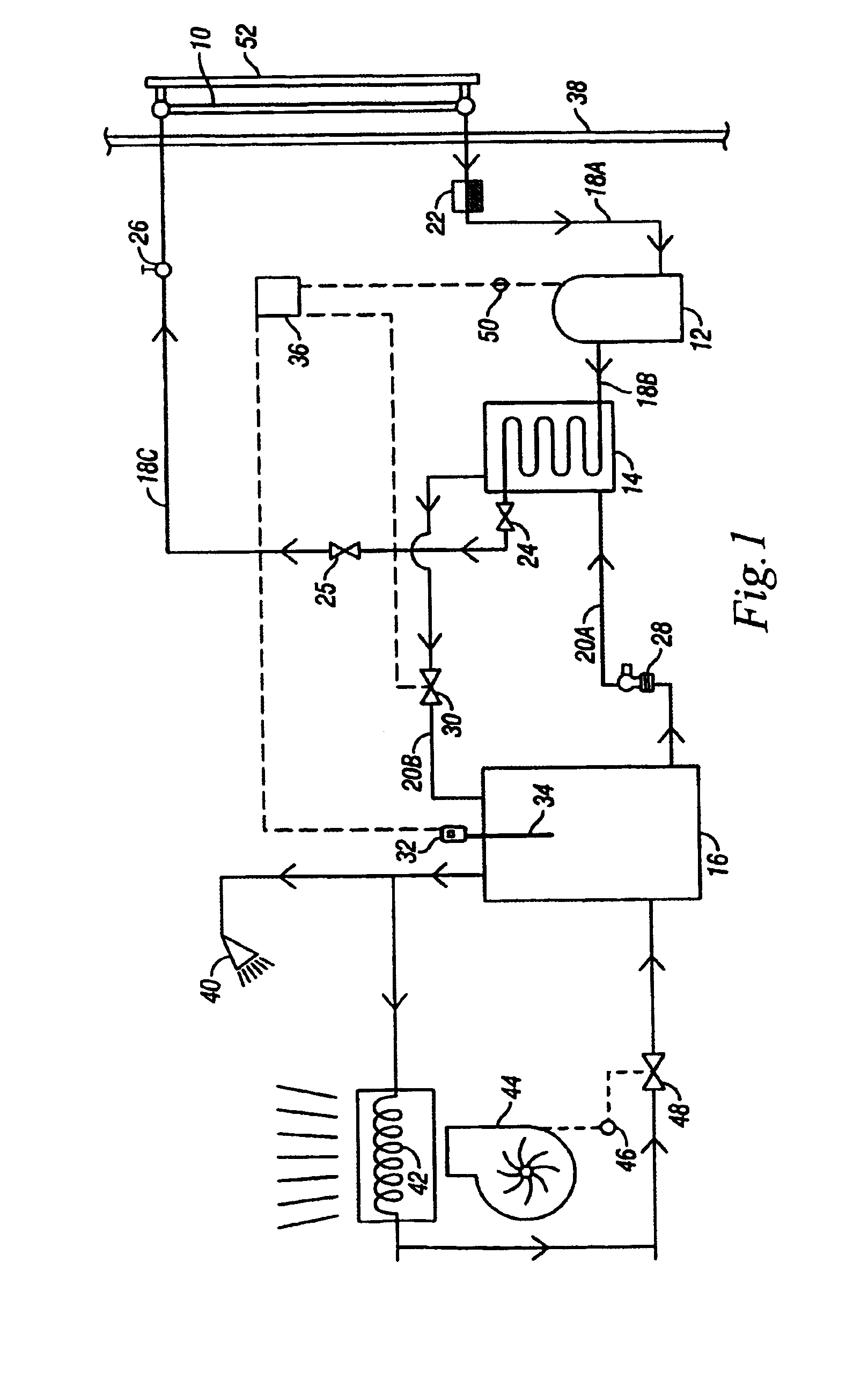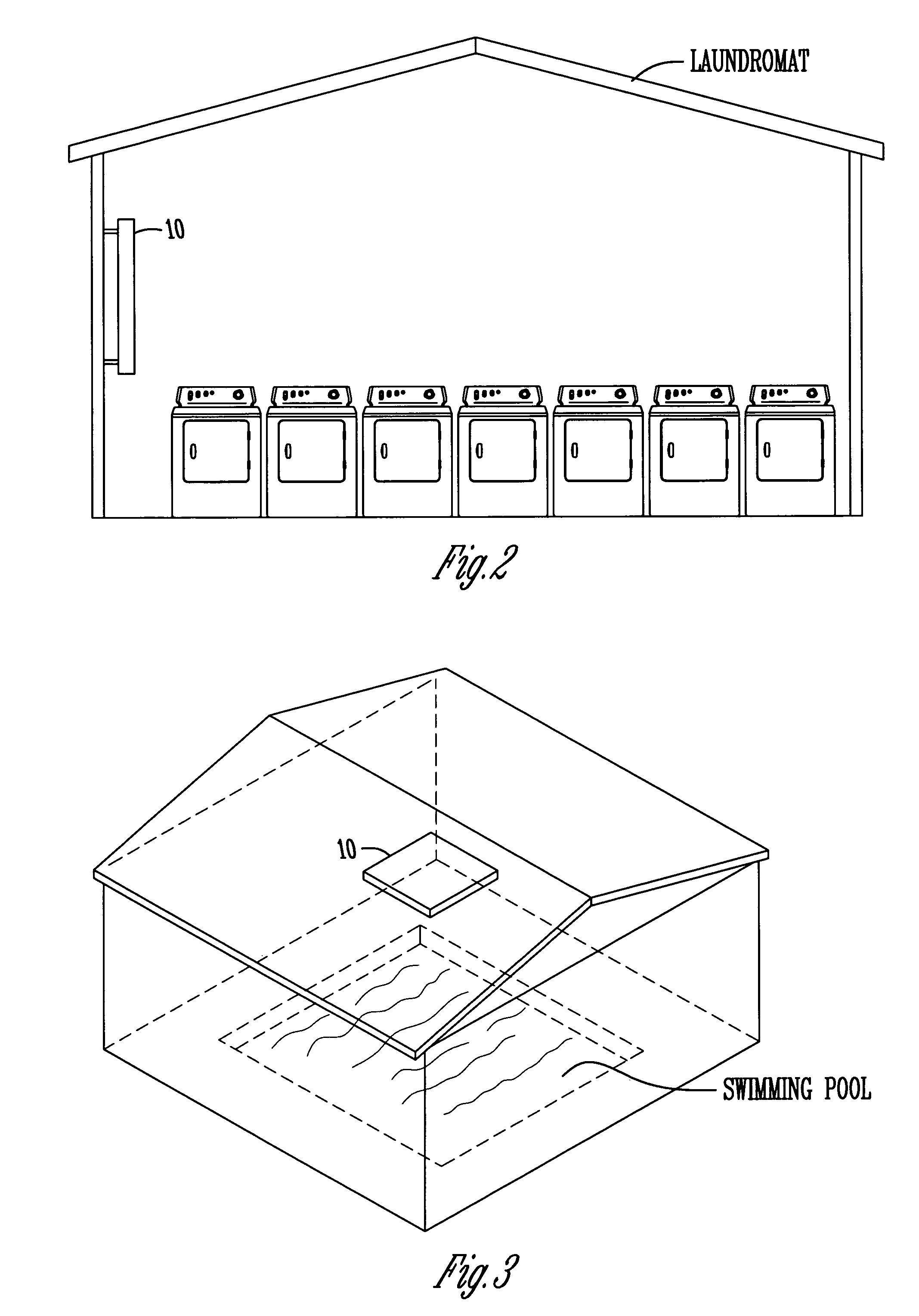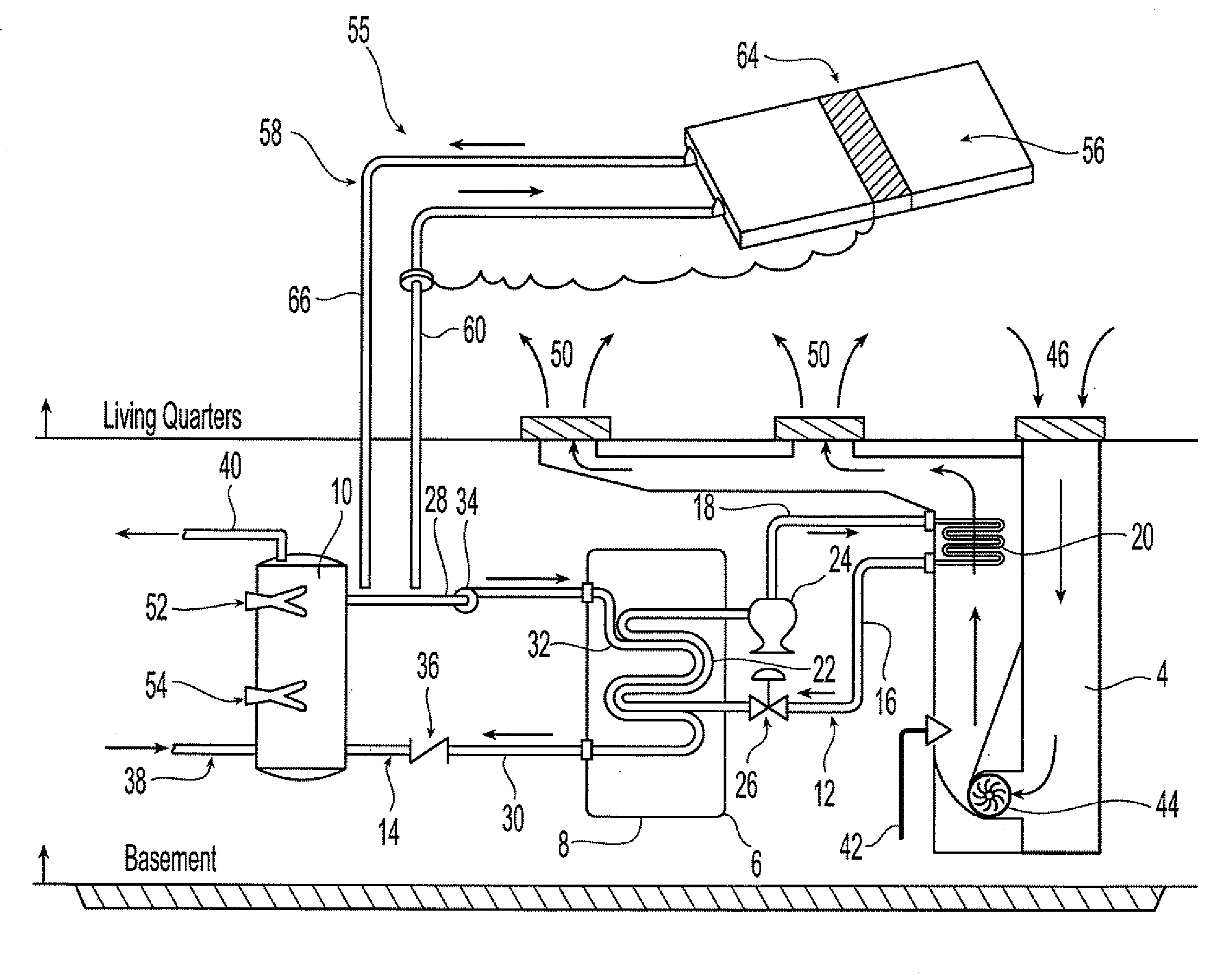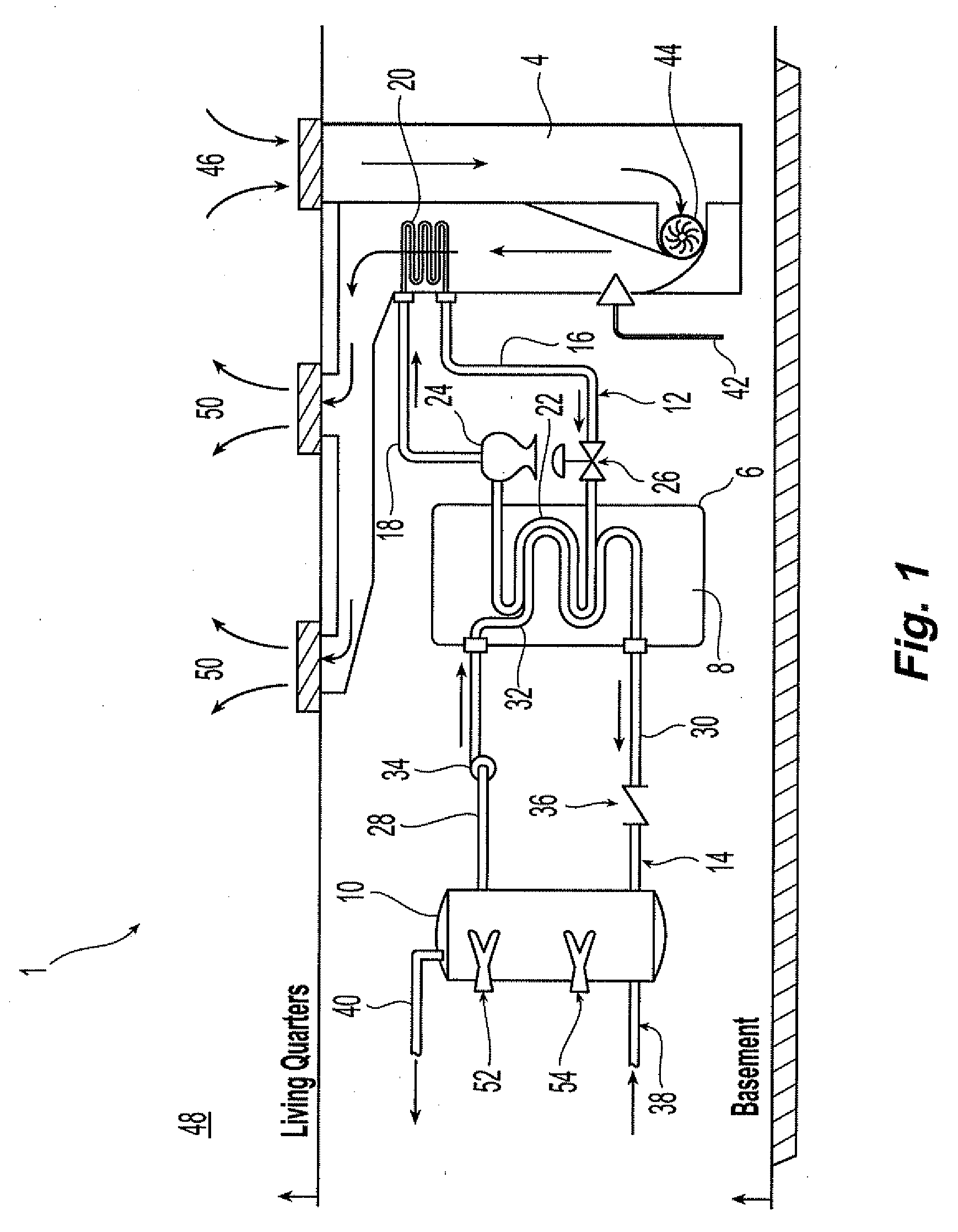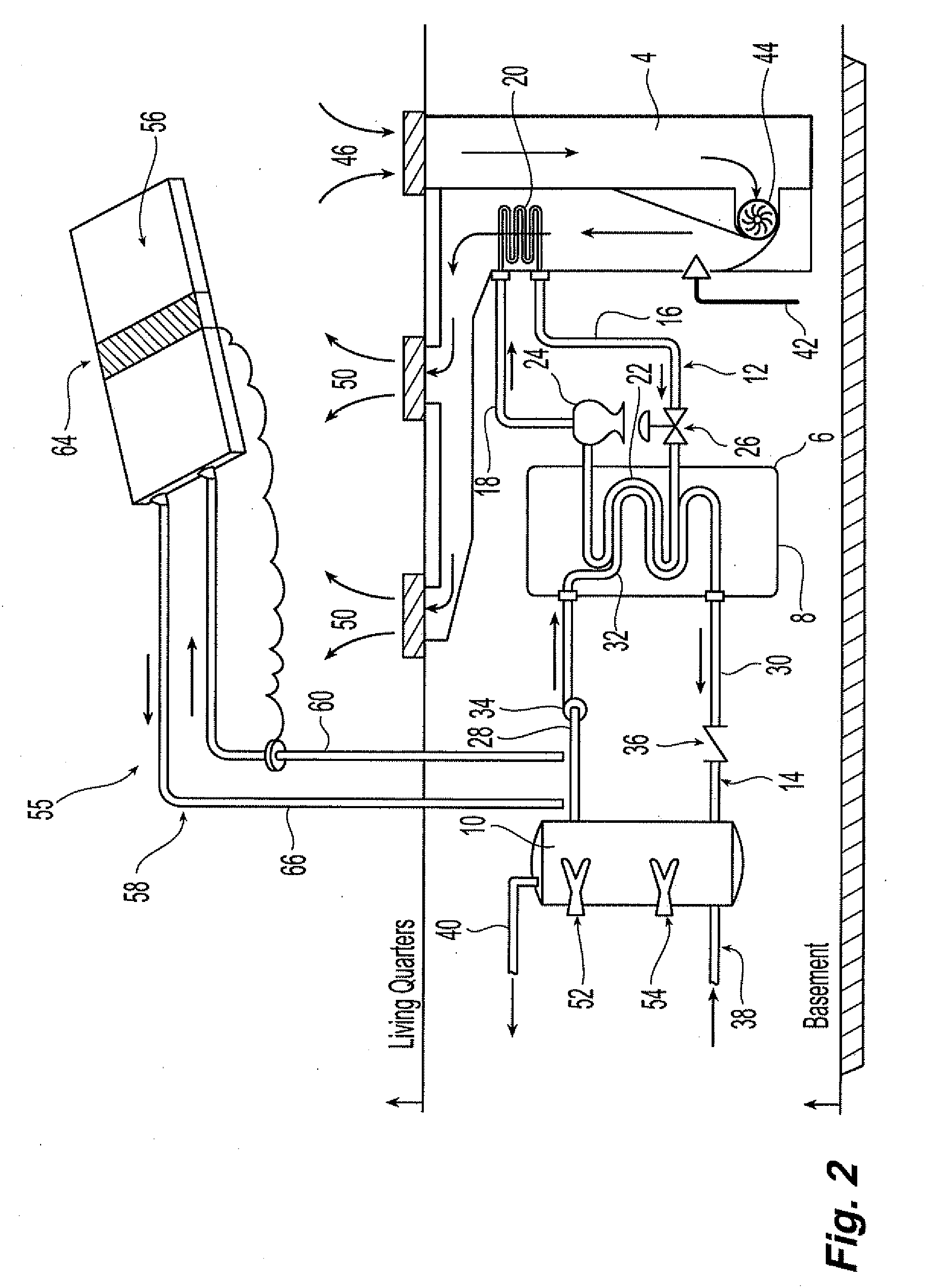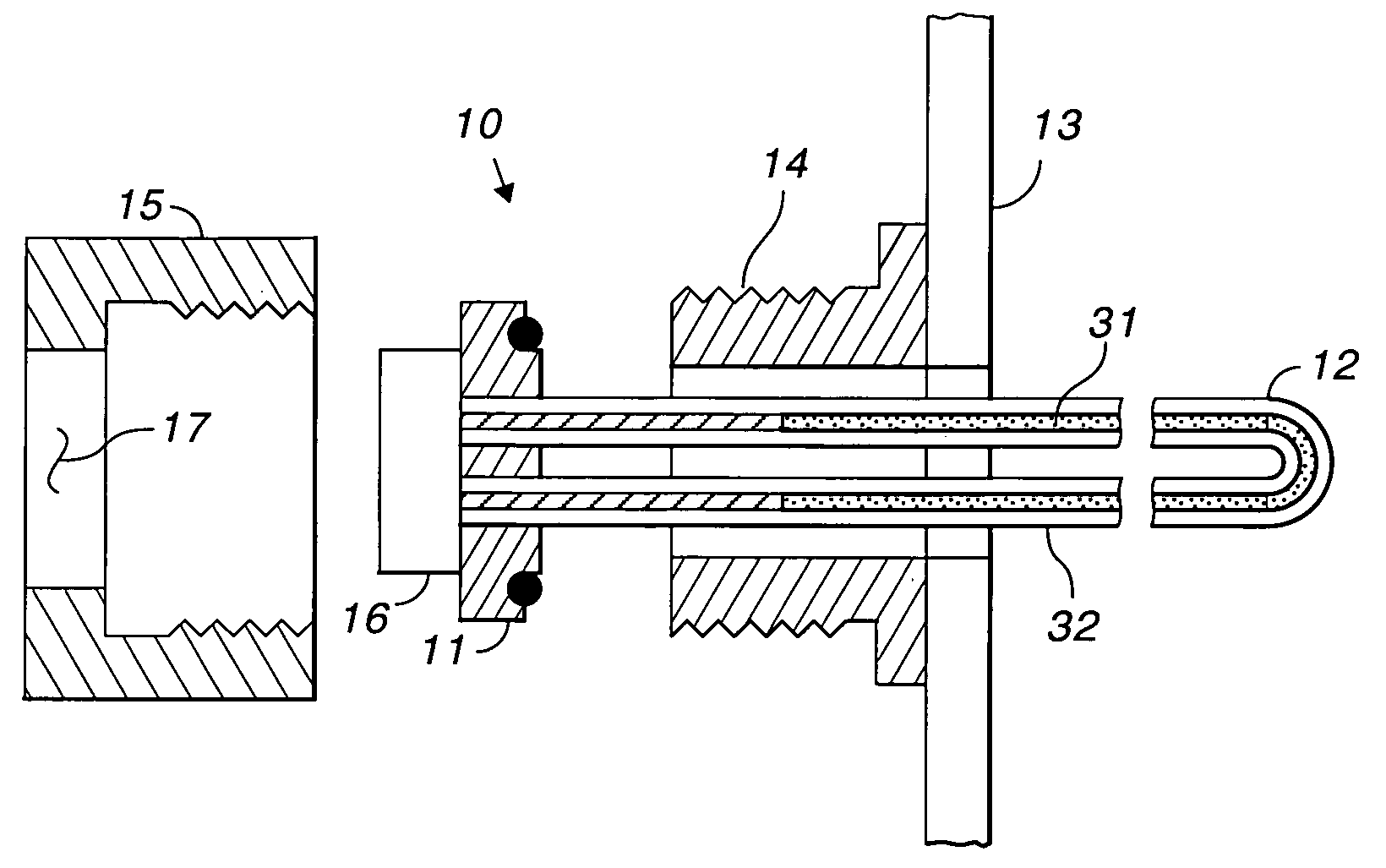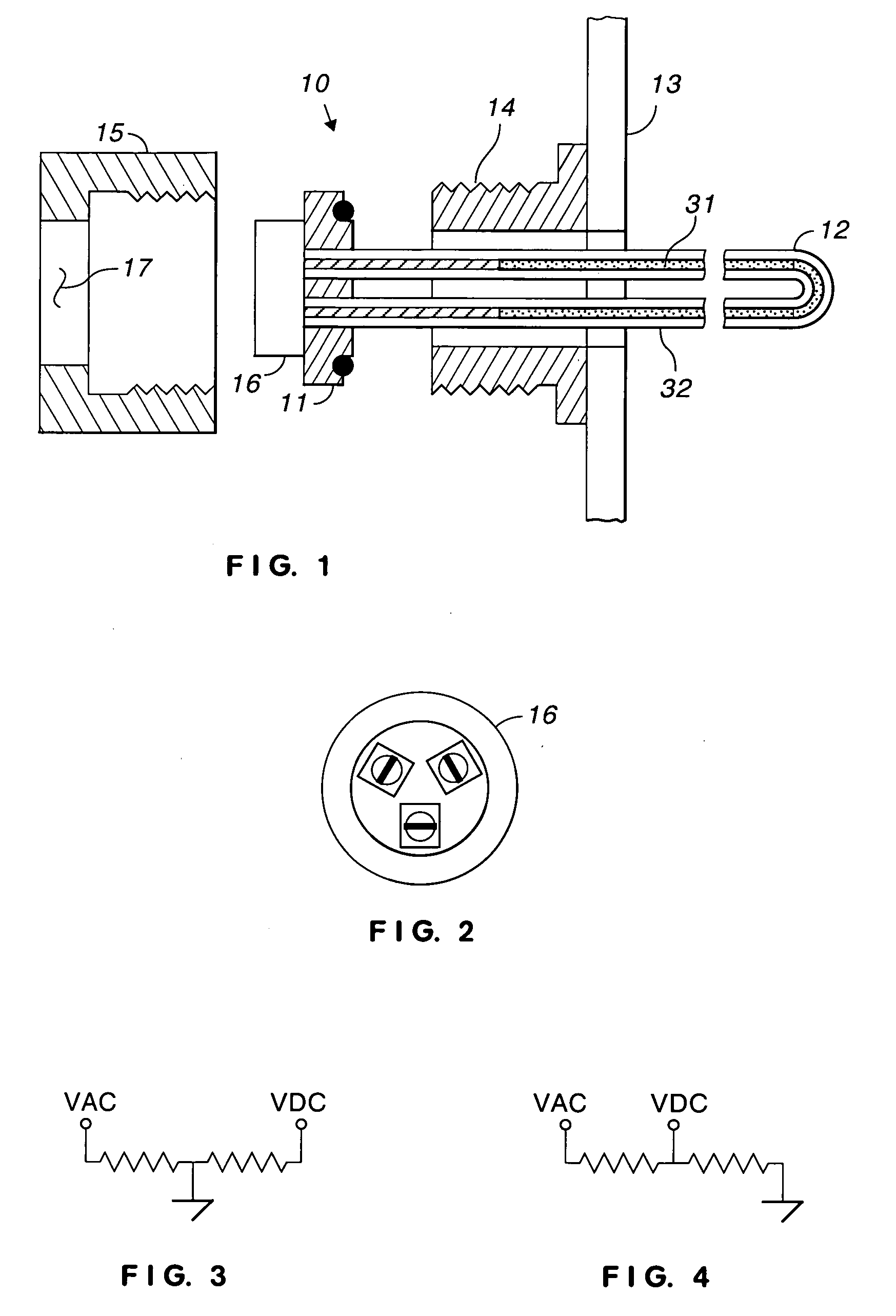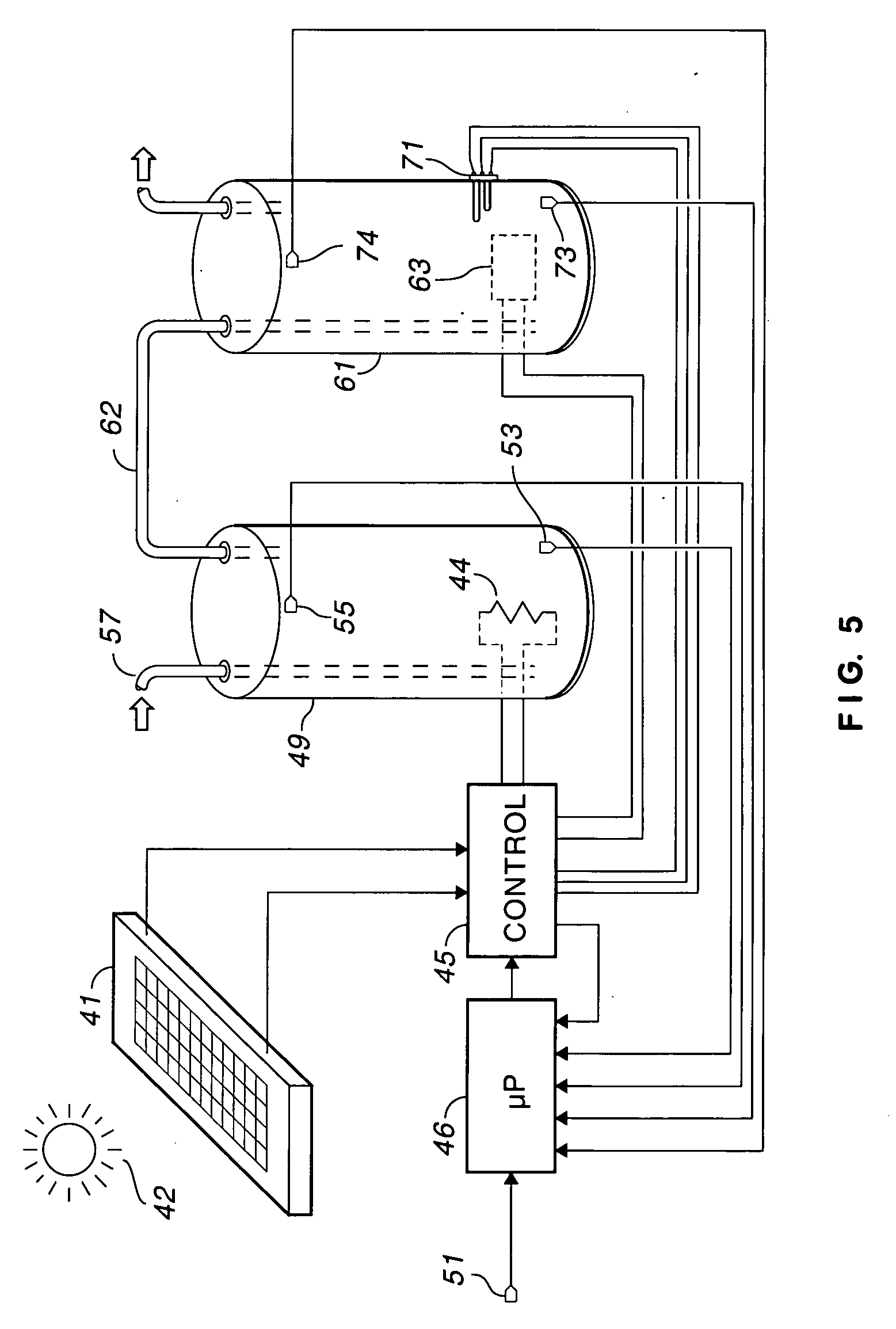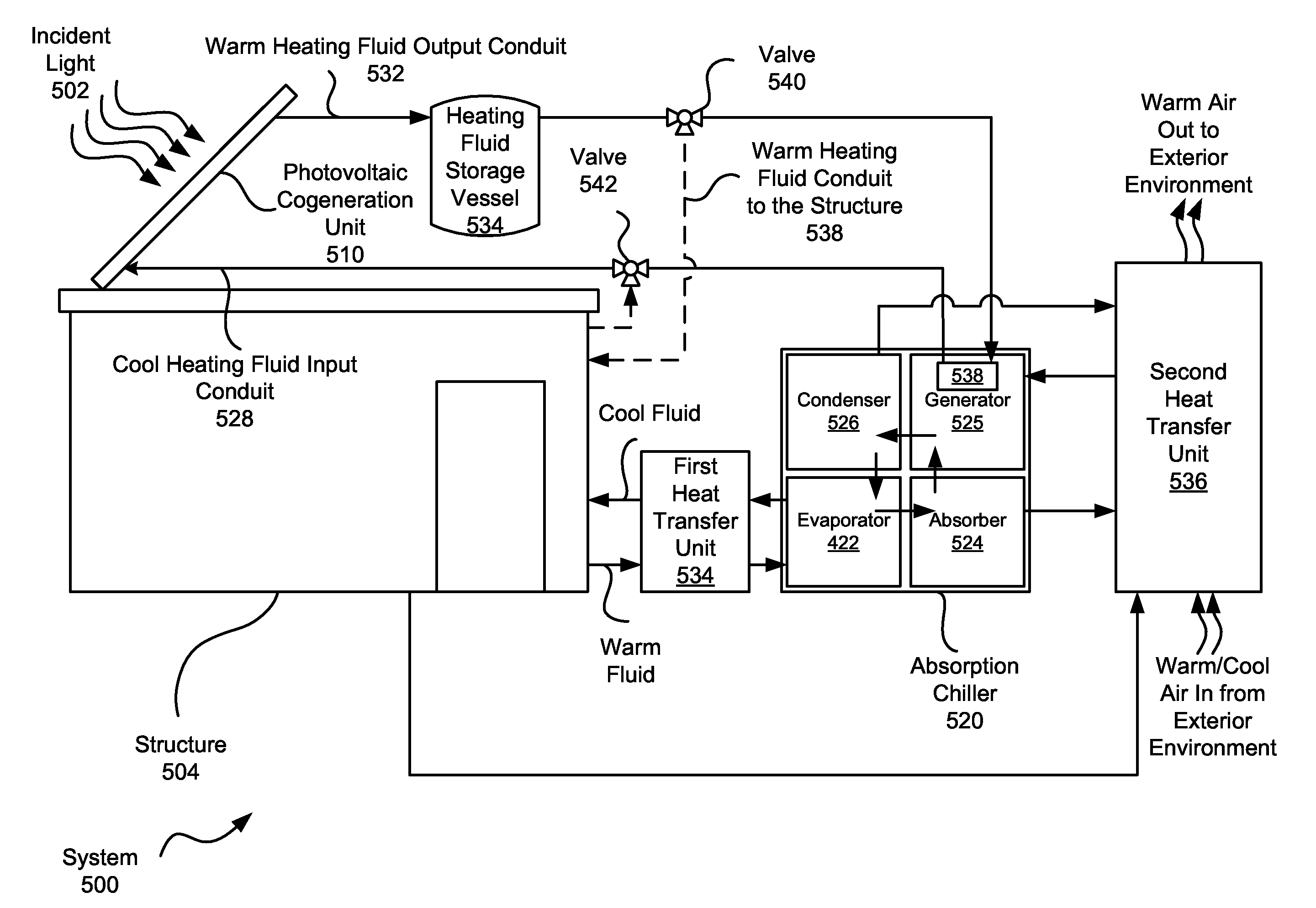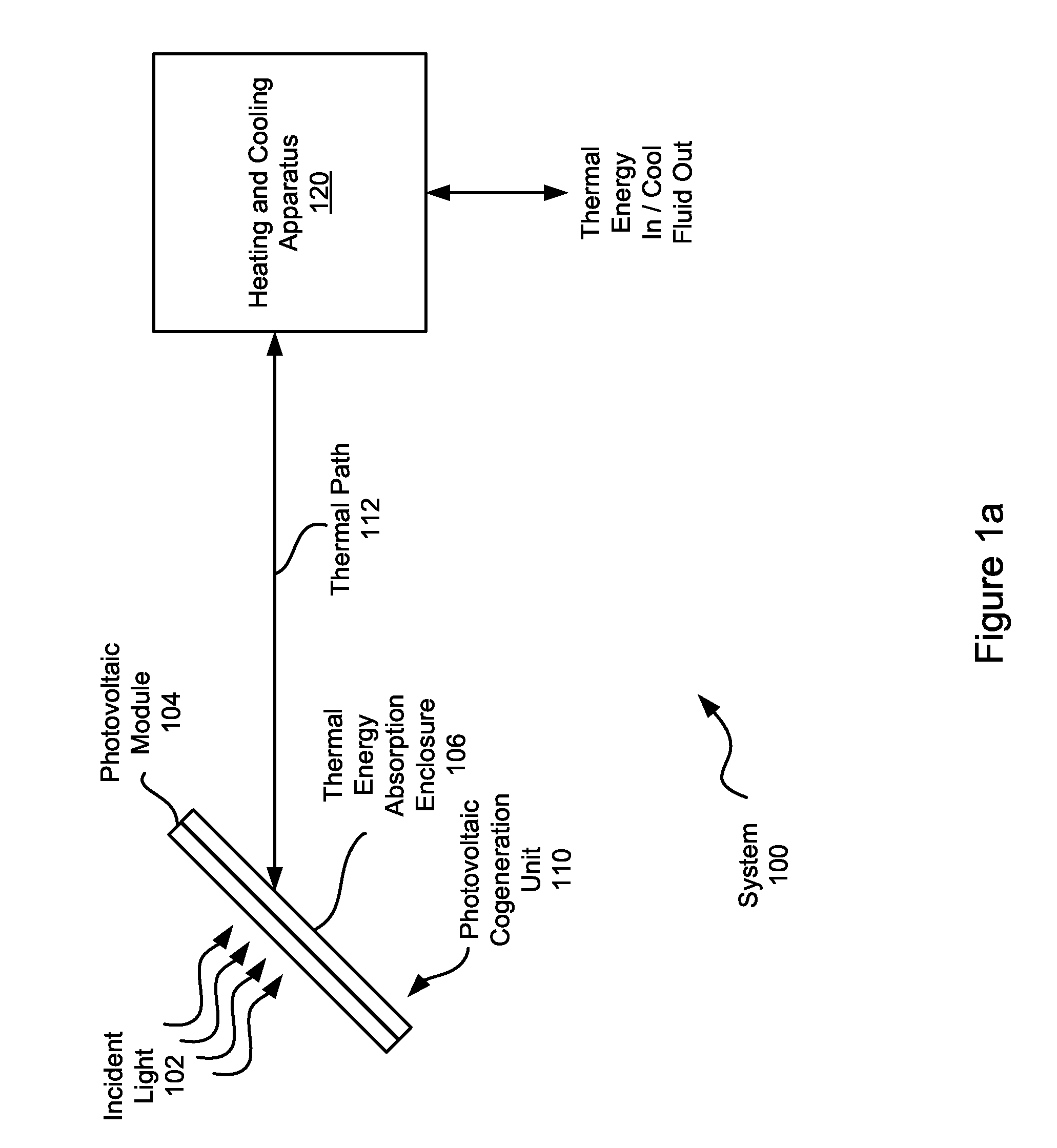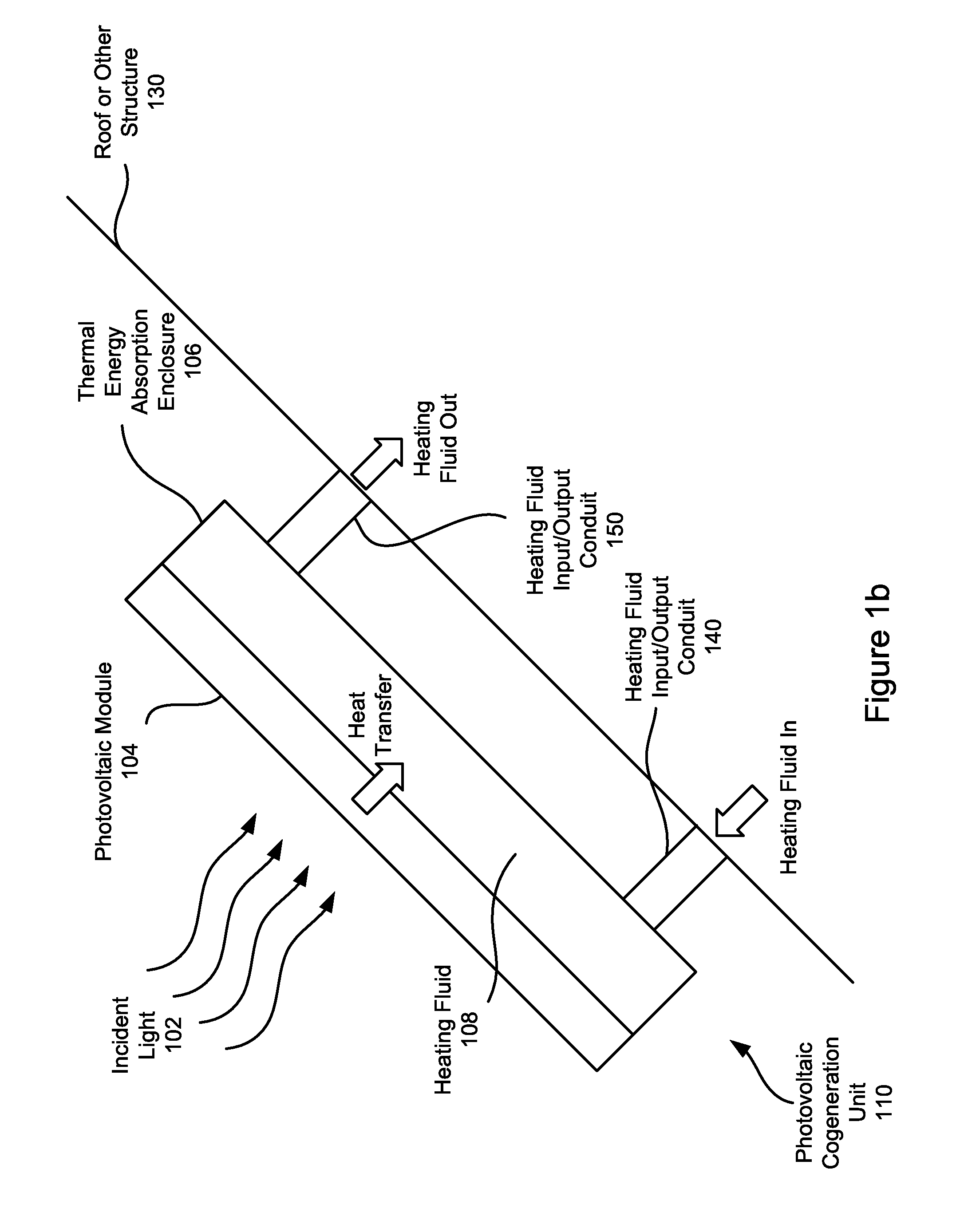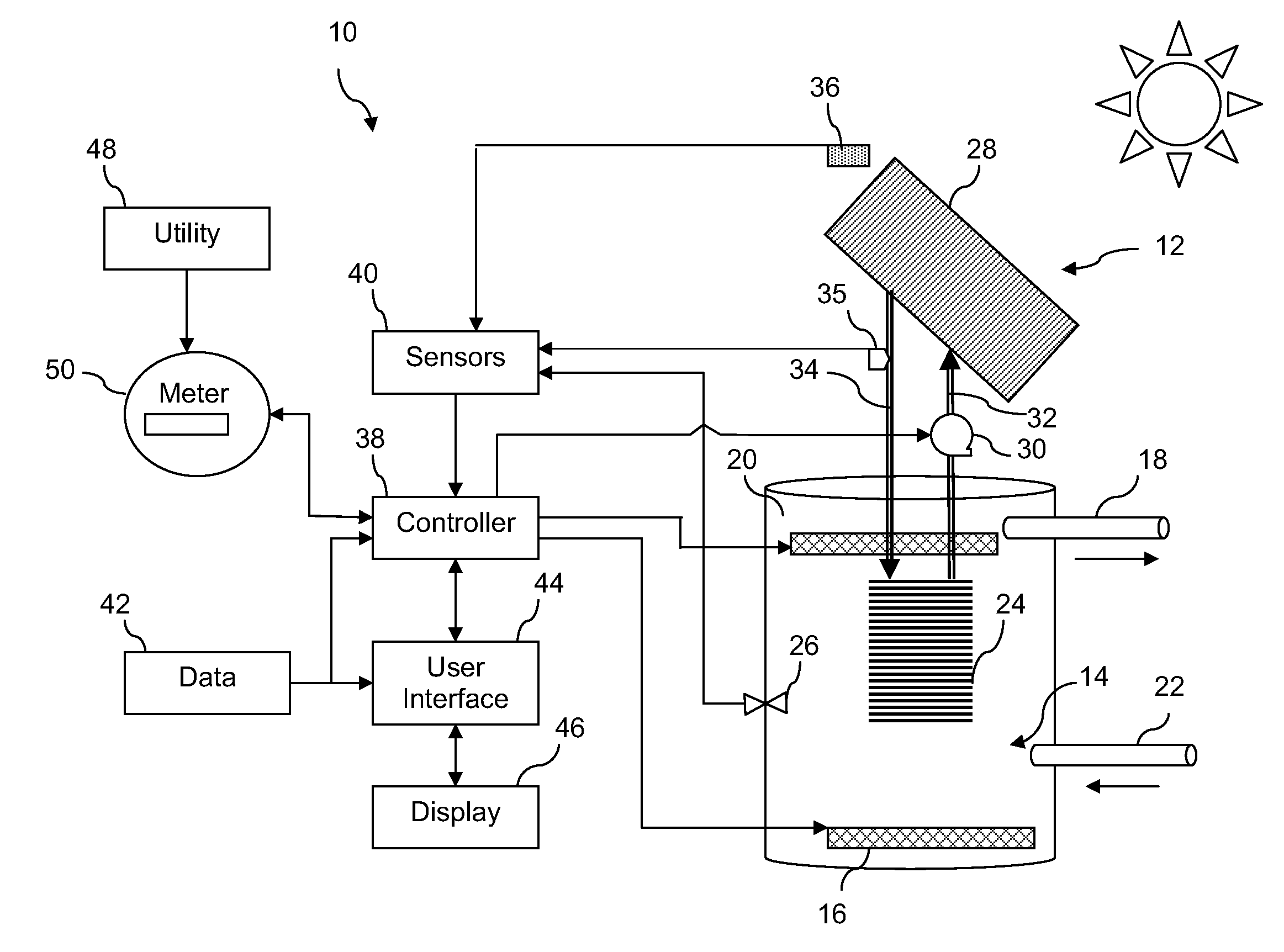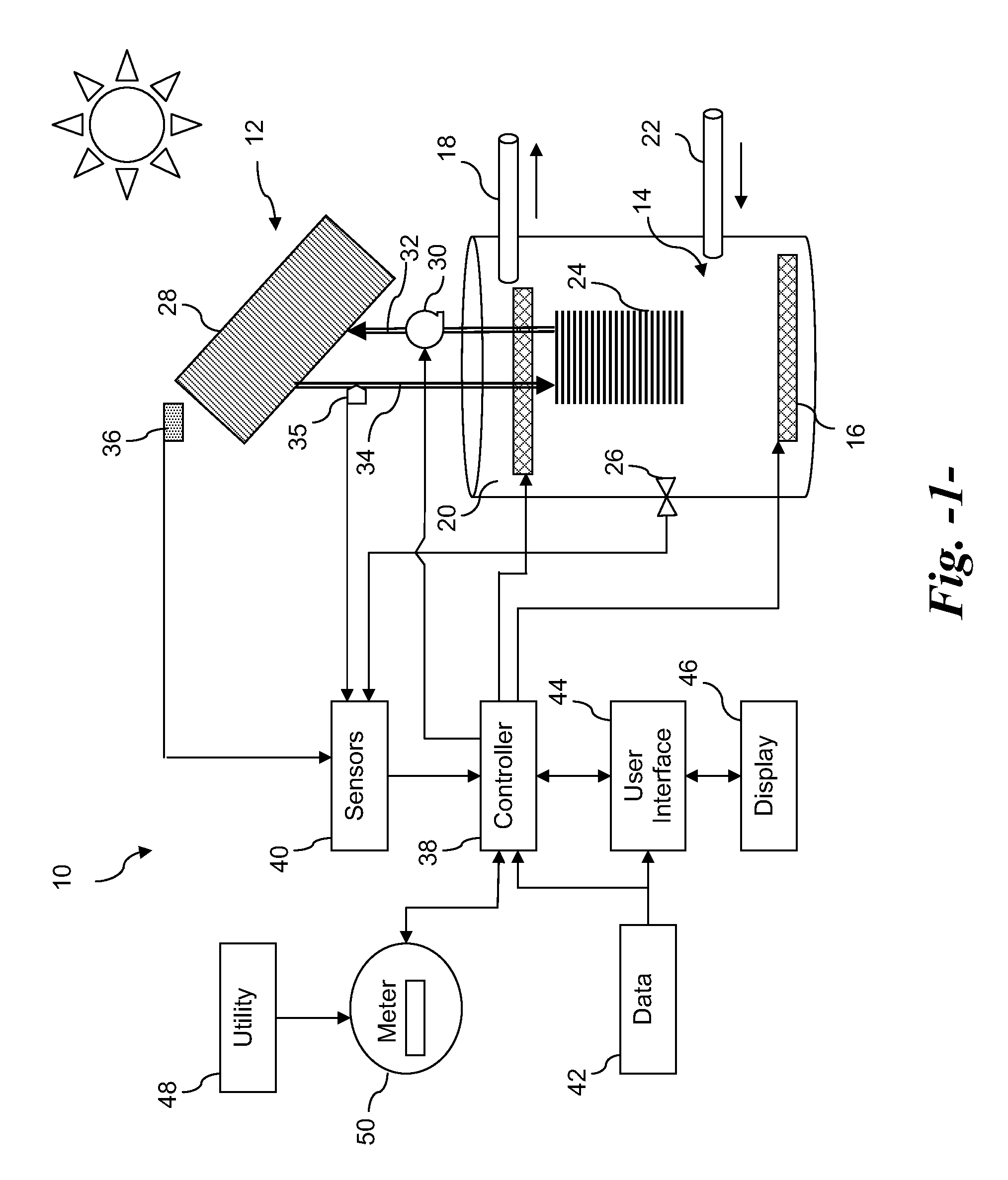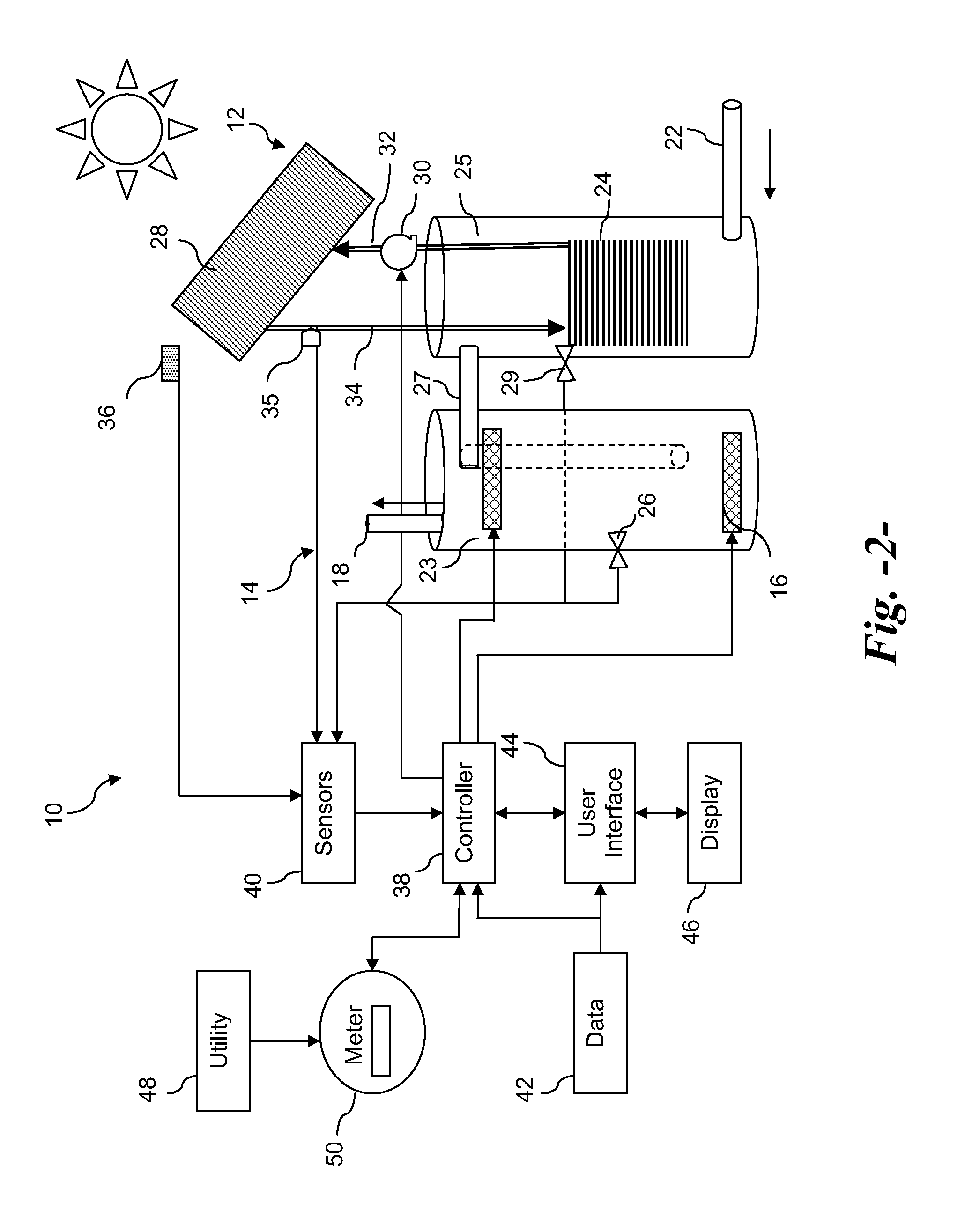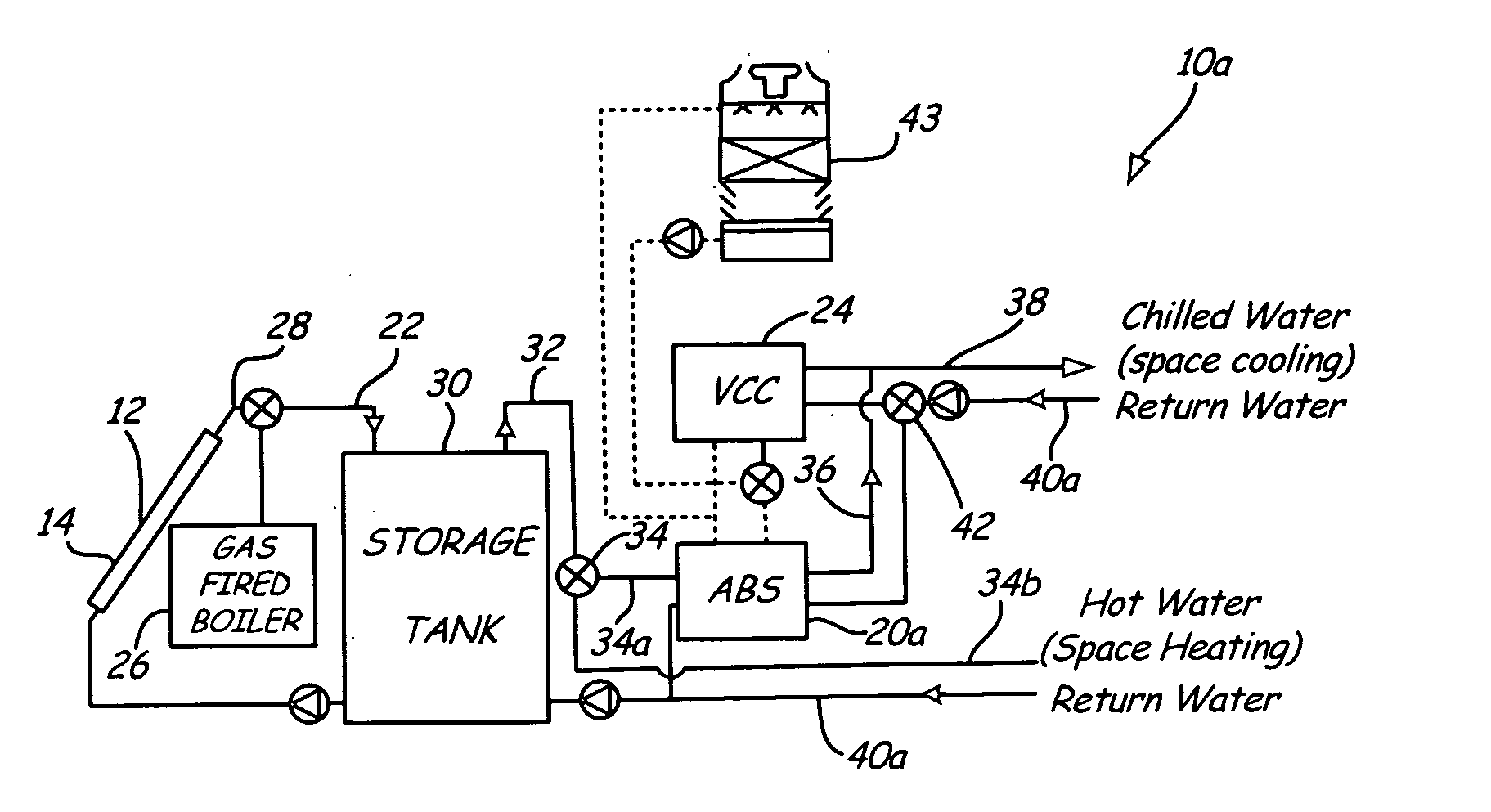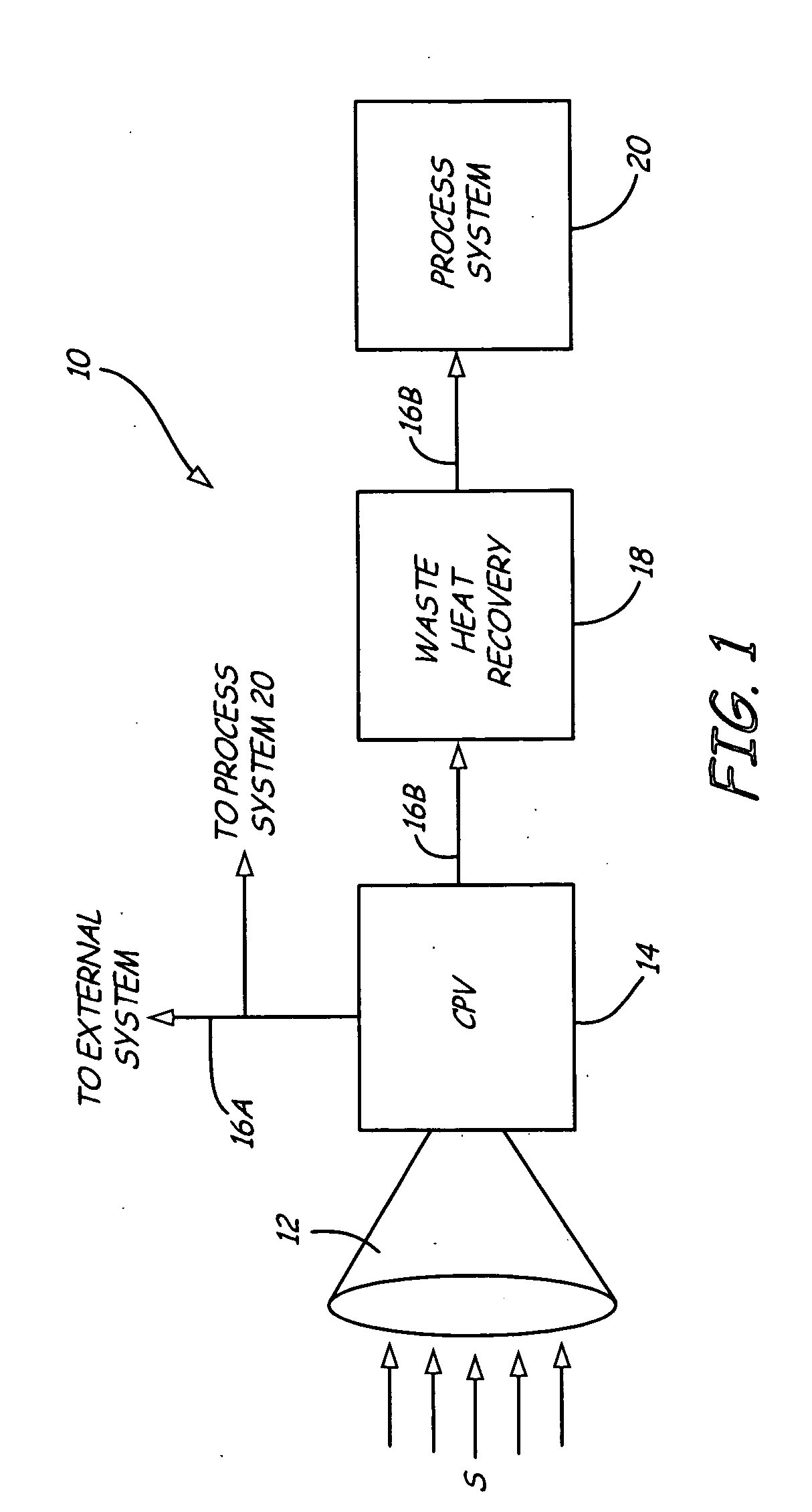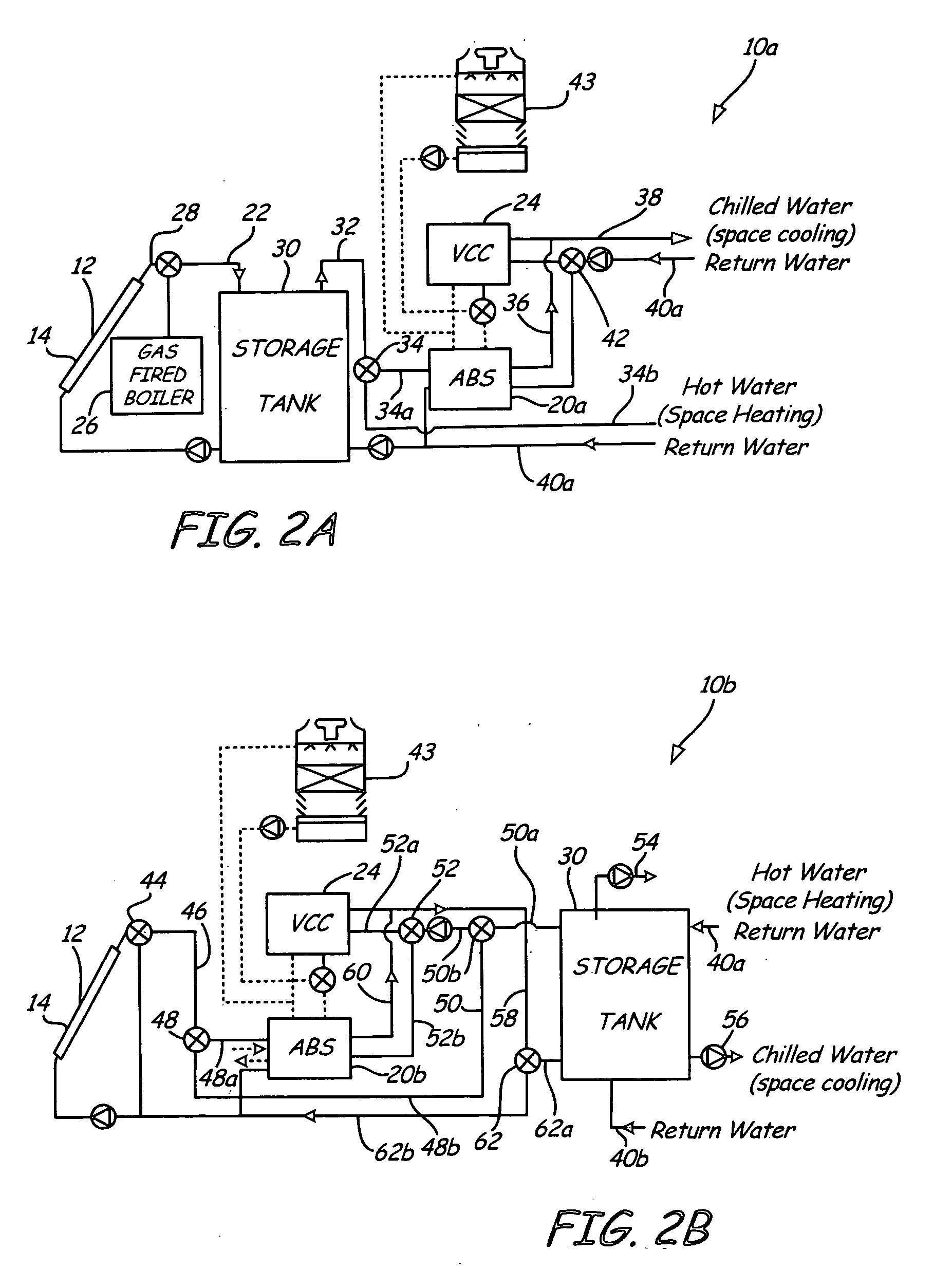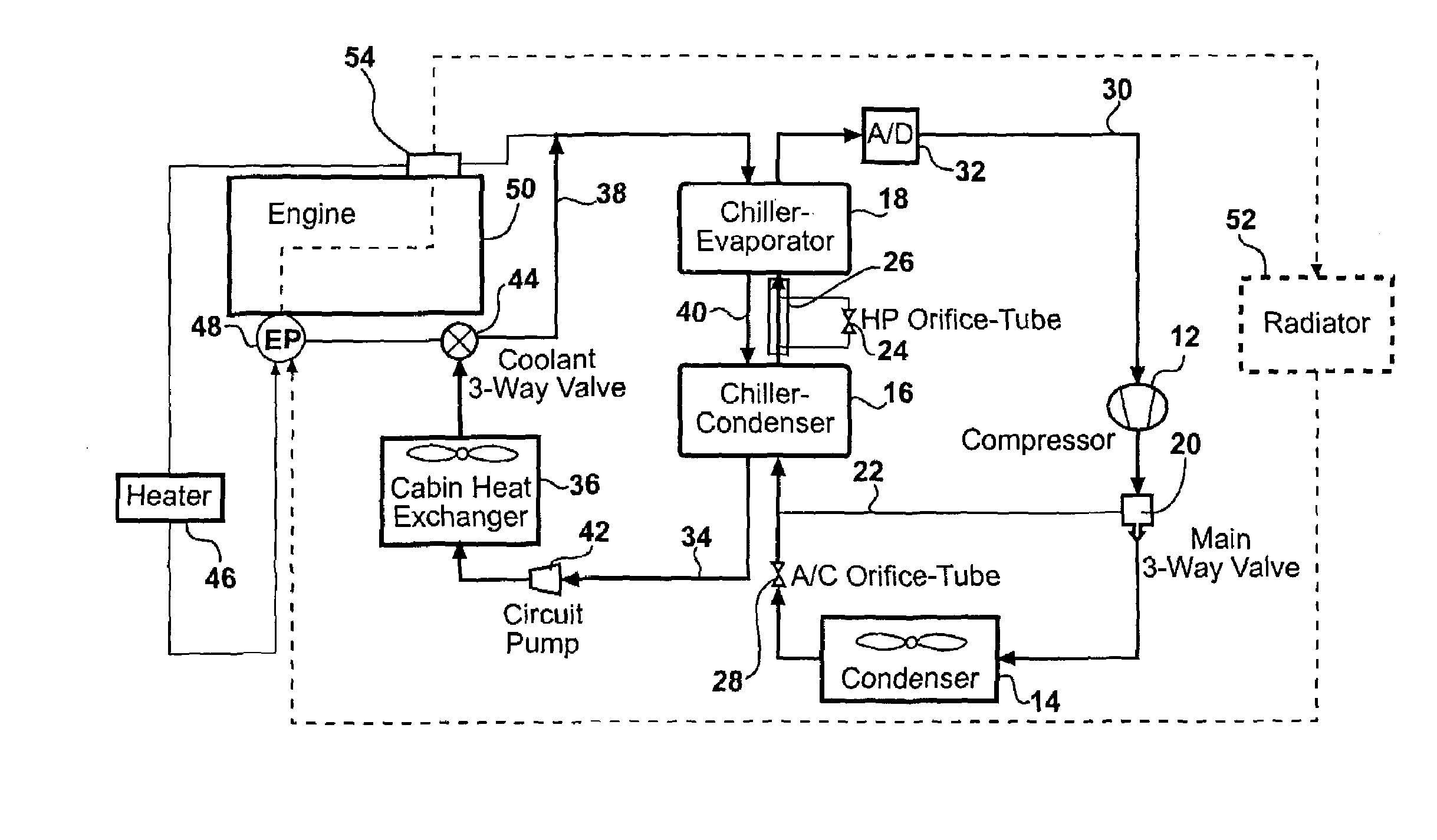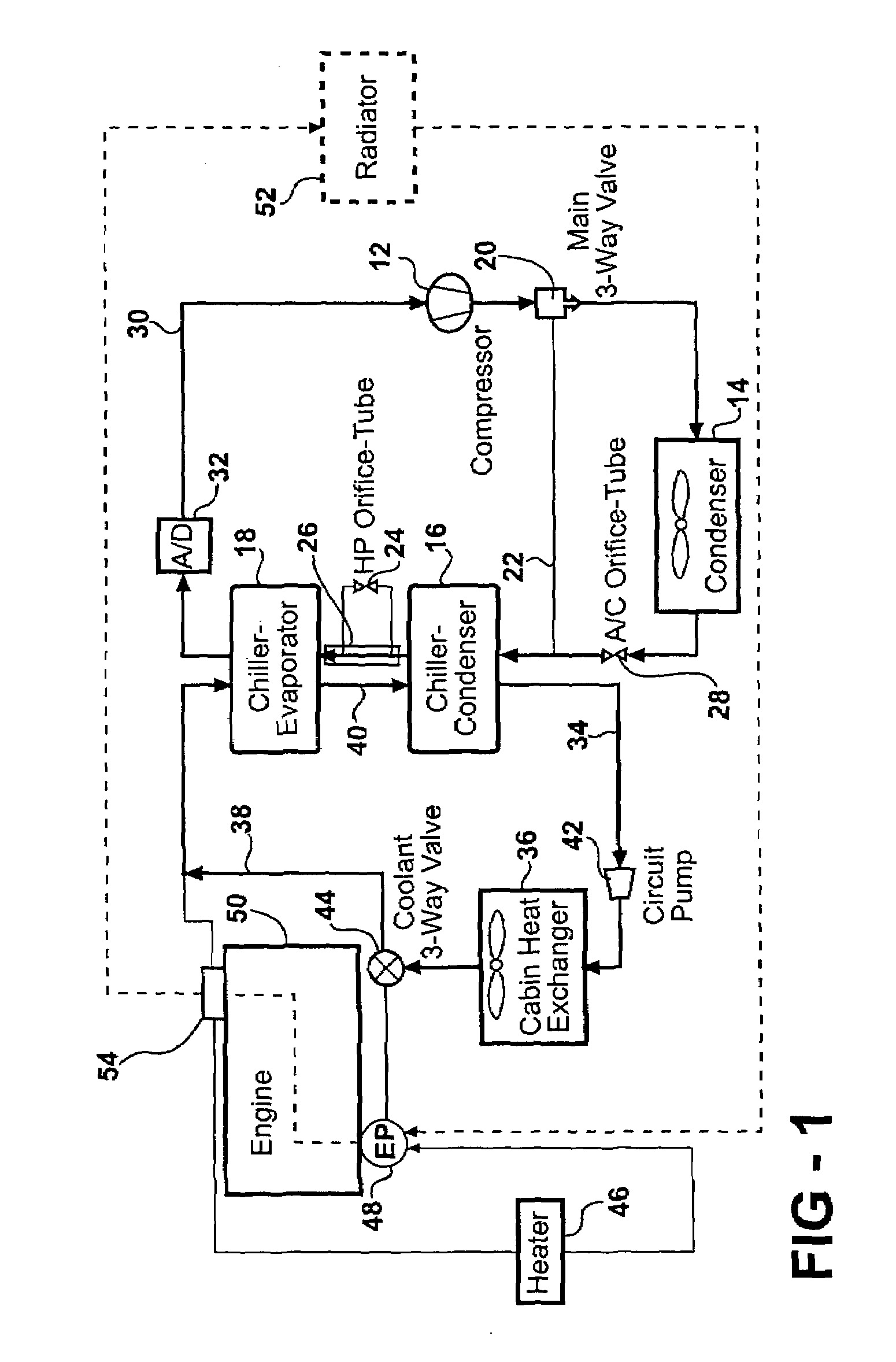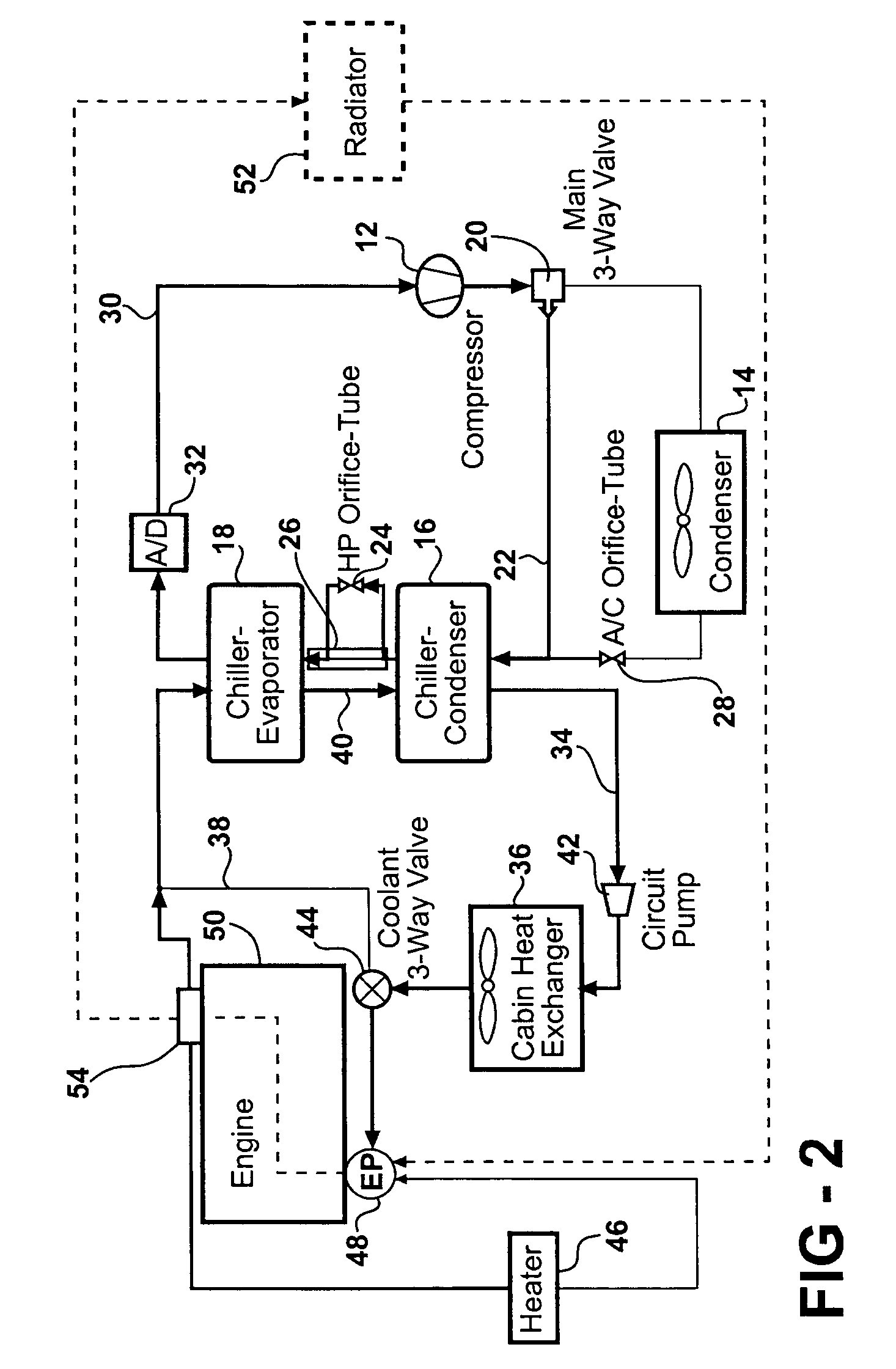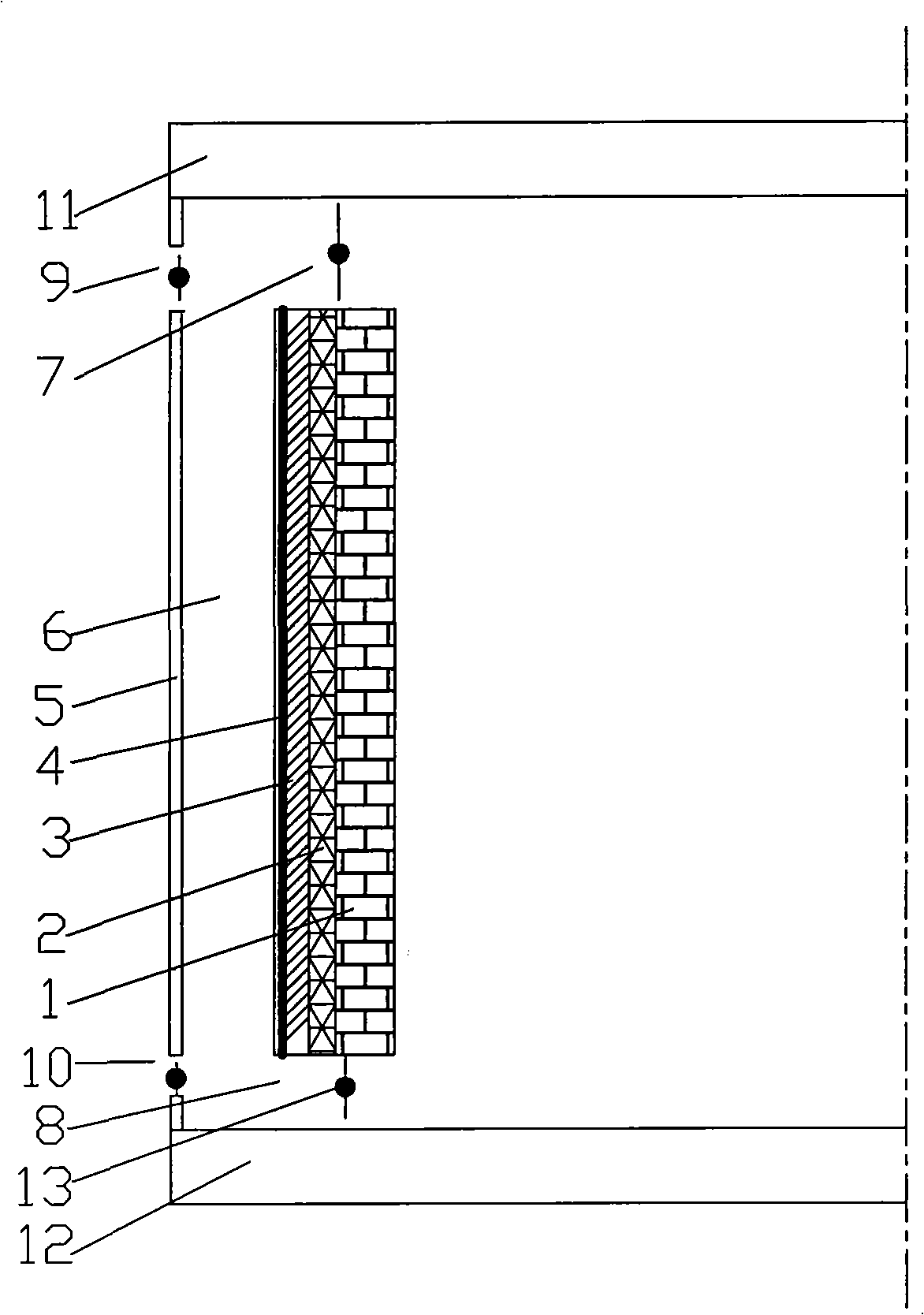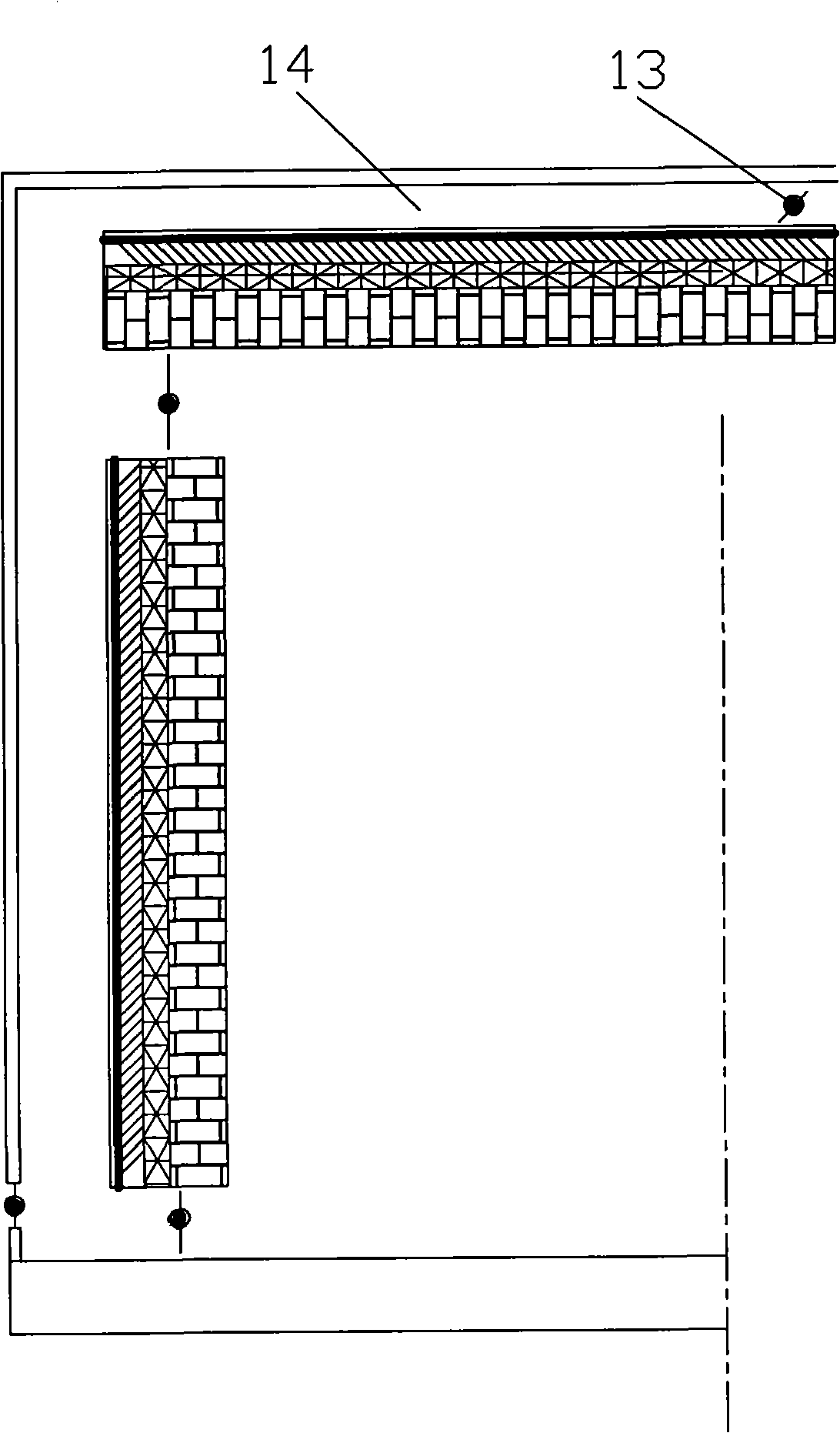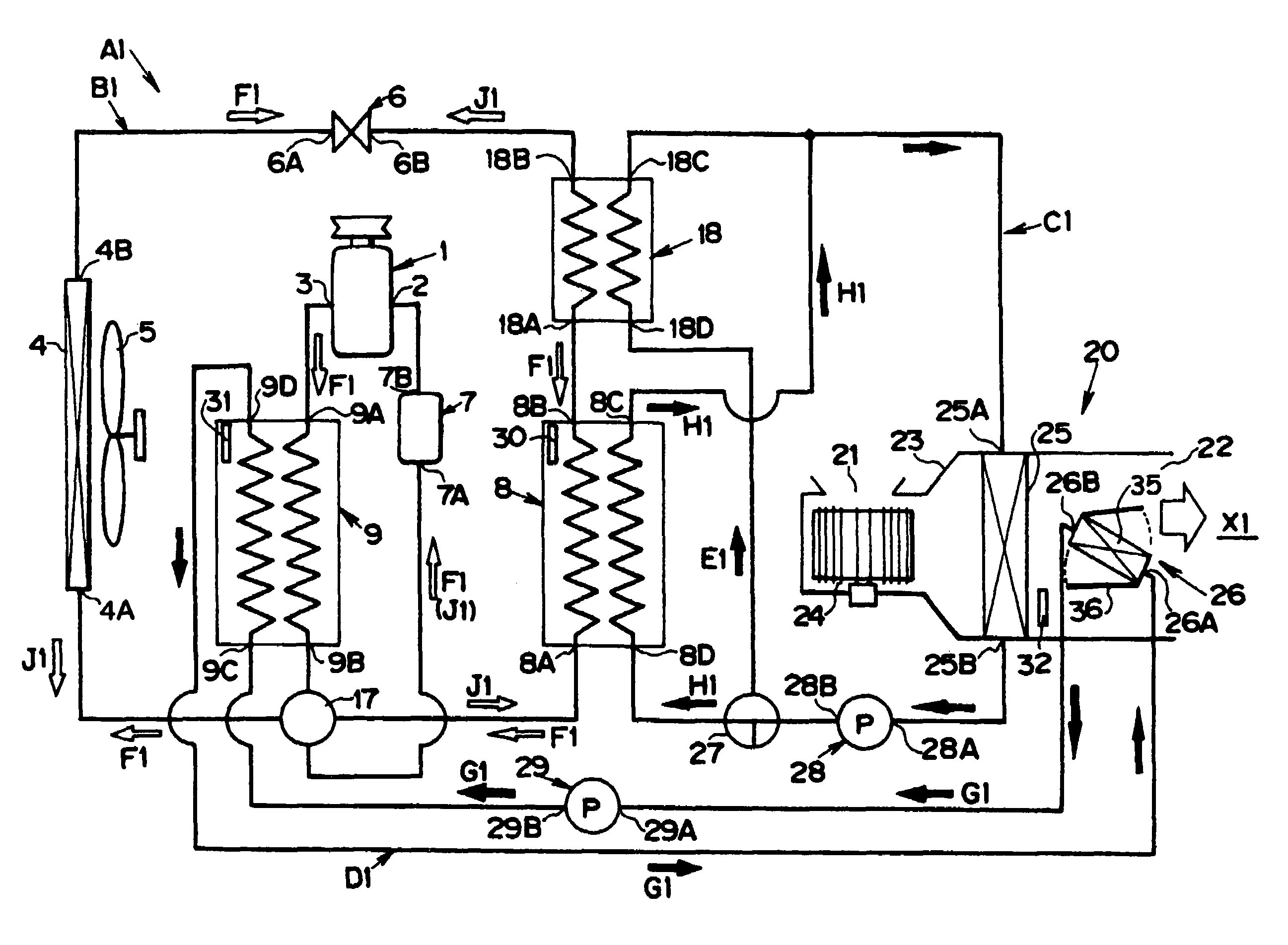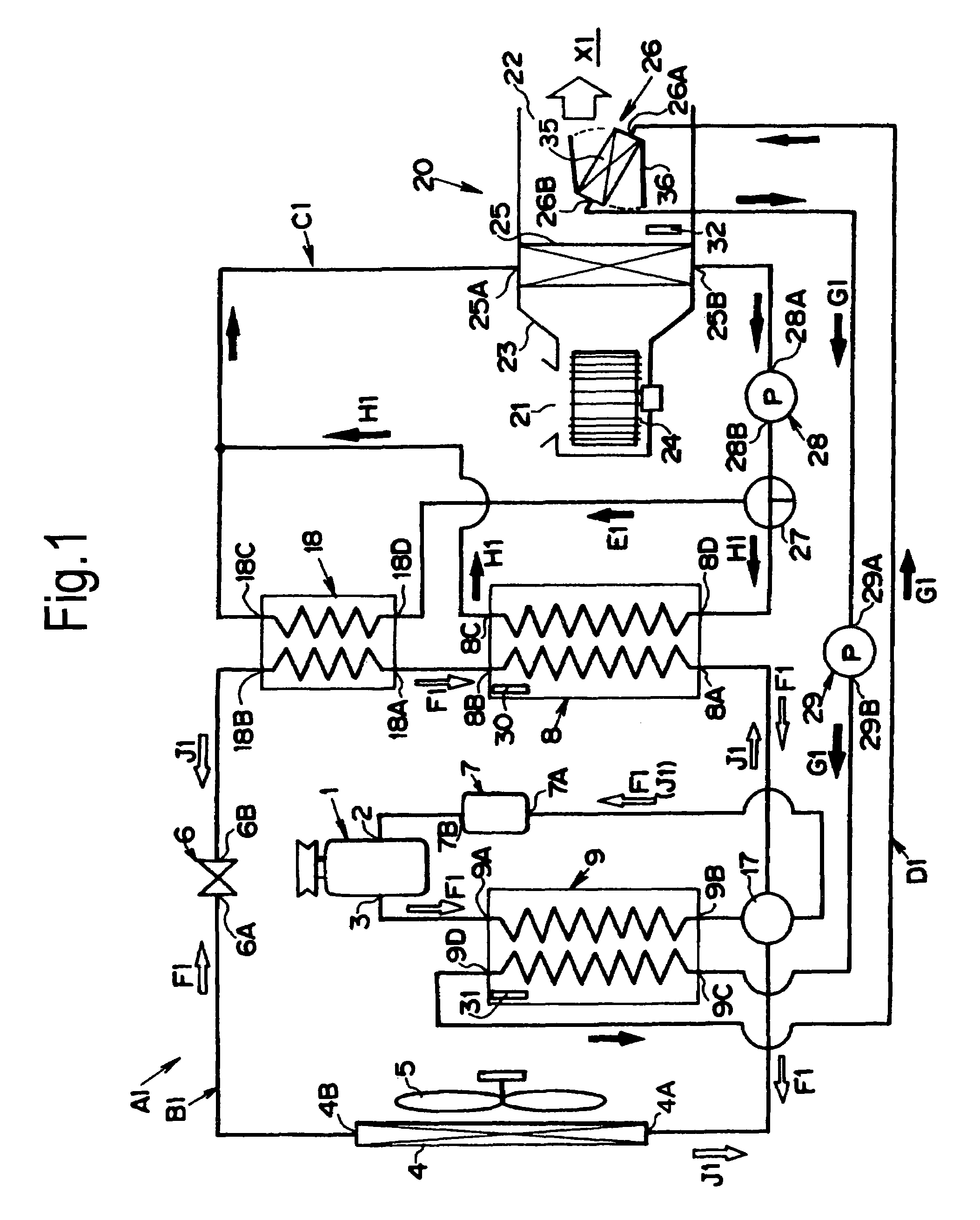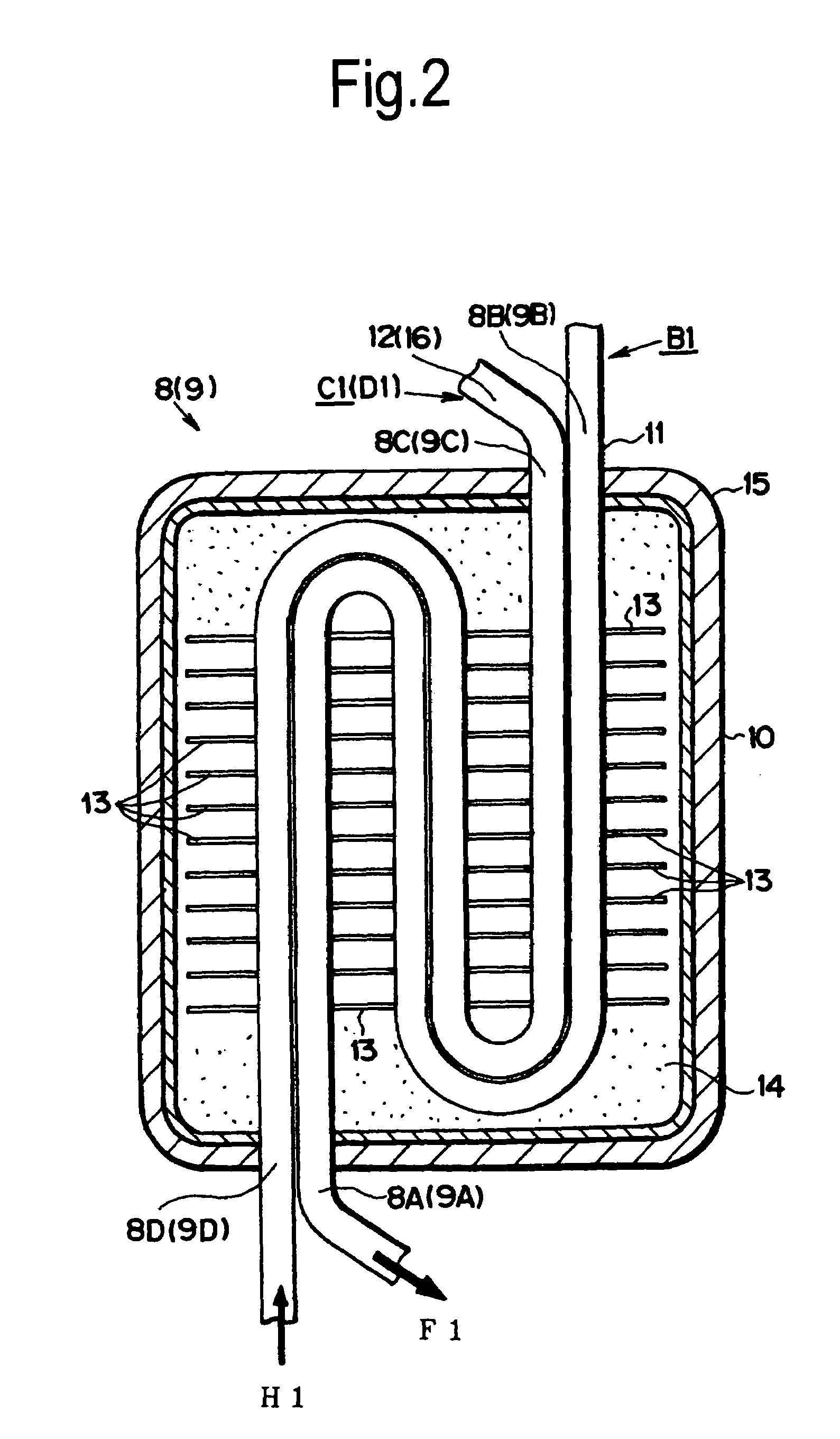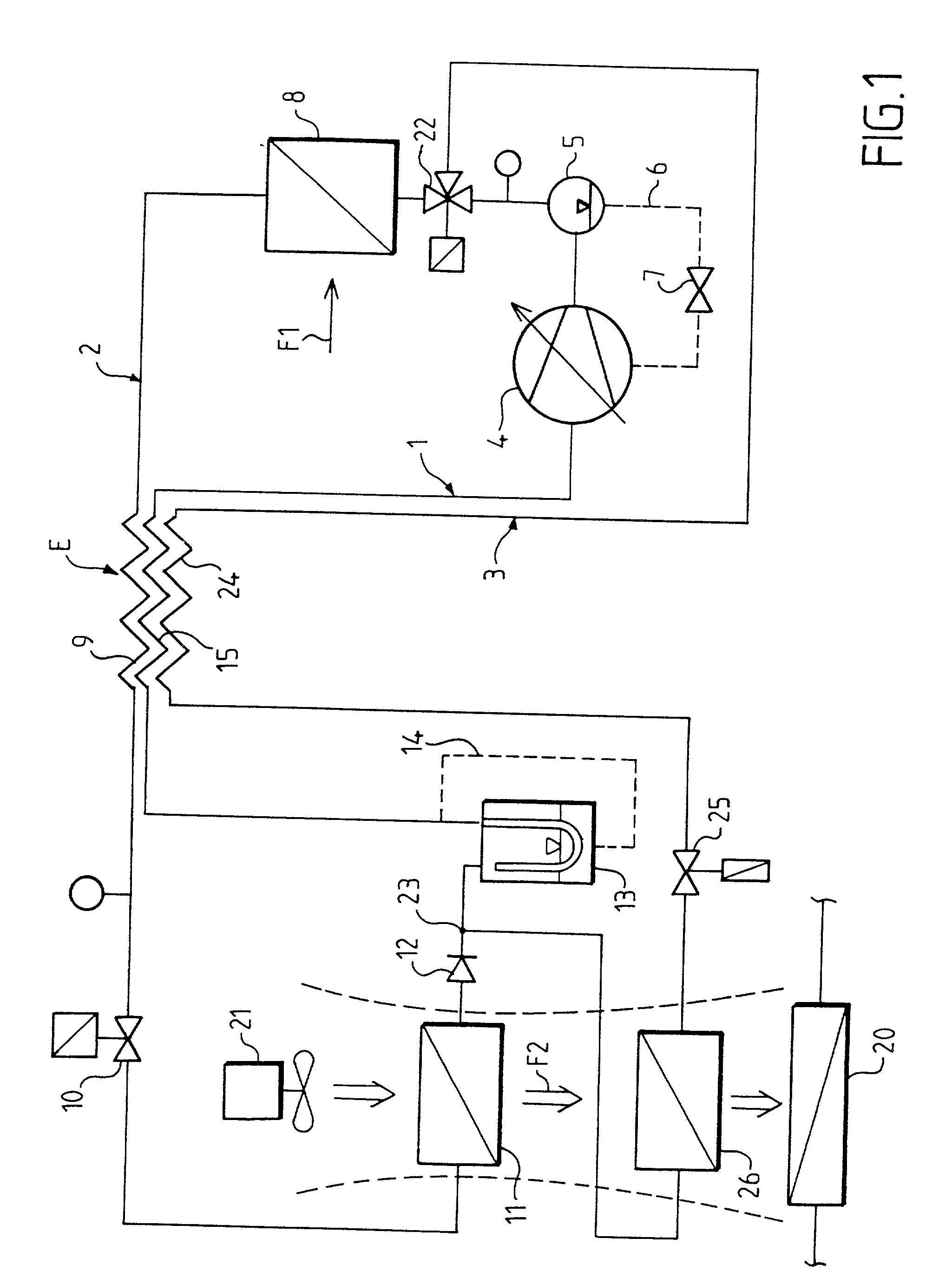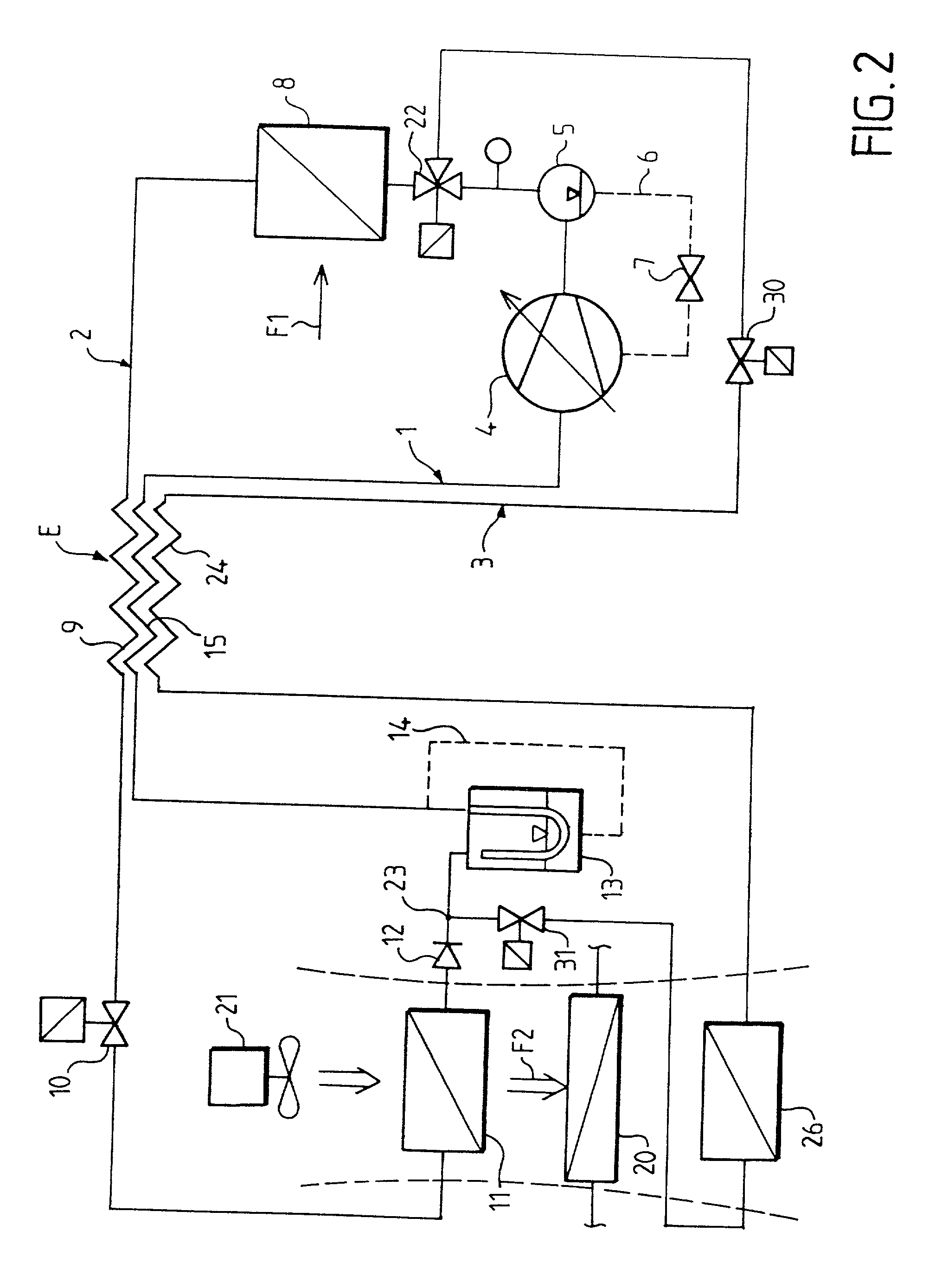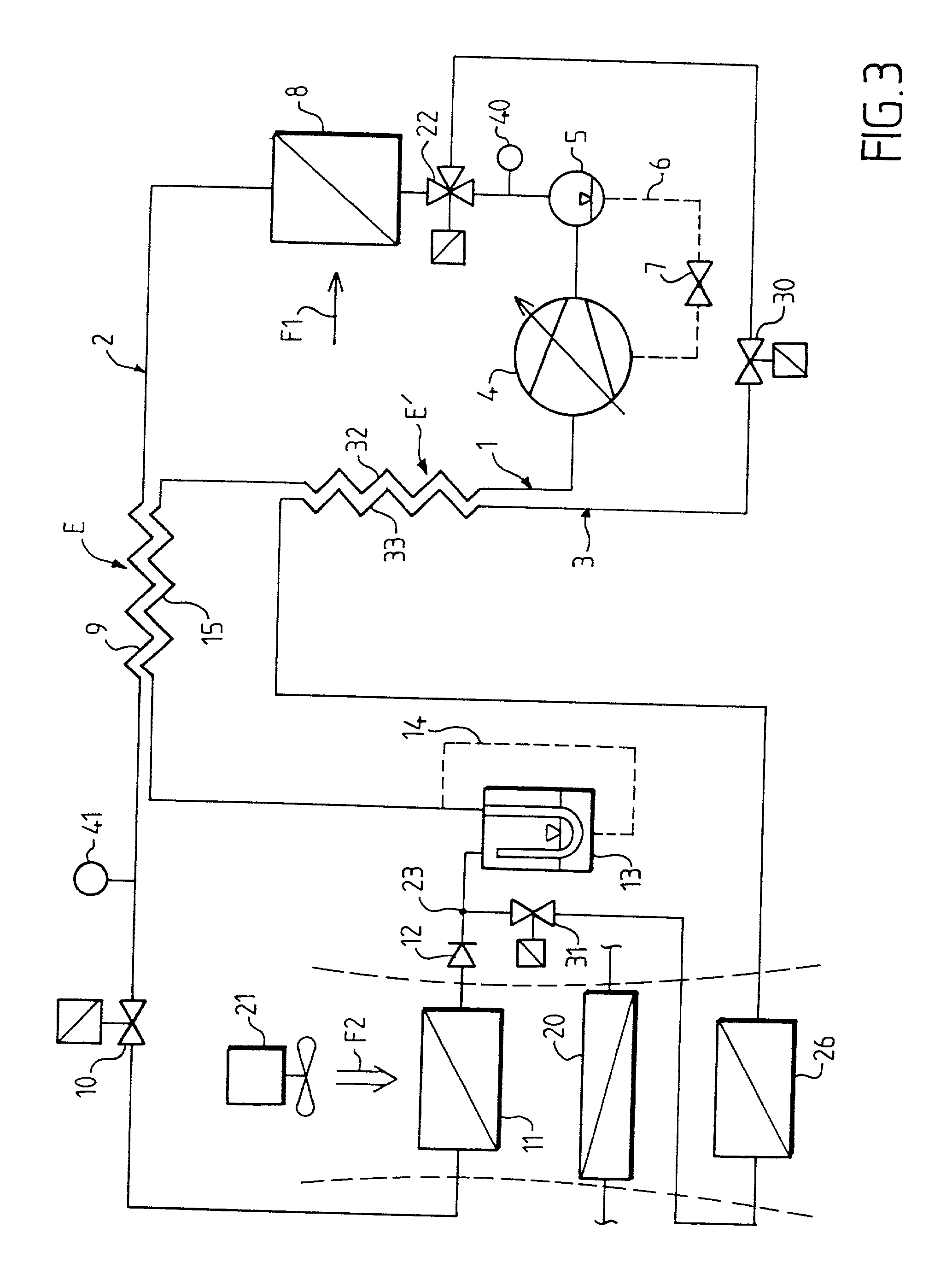Patents
Literature
1668results about "Central heating with accumulated heat" patented technology
Efficacy Topic
Property
Owner
Technical Advancement
Application Domain
Technology Topic
Technology Field Word
Patent Country/Region
Patent Type
Patent Status
Application Year
Inventor
Energy storage systems
InactiveUS20120227926A1Low costReduce usageSolar heating energySolar heat devicesThermal energyThermal energy storage
There is herein described energy storage systems. More particularly, there is herein described thermal energy storage systems and use of energy storable material such as phase change material in the provision of heating and / or cooling systems in, for example, domestic dwellings.
Owner:SUNAMP
Hybrid heating and/or cooling system
A hybrid heating and / or cooling system may combine different energy sources (e.g., solar and geothermal) into a single system. The hybrid heating and / or cooling system may include one or more heat pumps, a heat exchanger system, a solar and / or waste energy system, and a delivery system for delivering heat (and / or cool air) to a space such as a building. These systems may be interconnected and controlled using various conduits, pumps, valves and controls. The solar energy system may provide heat (e.g., low grade heat) to the working fluid at the input to the source side of the heat pump and / or may provide heat (e.g., high grade heat) to the delivery system for direct solar and / or waste energy heating.
Owner:THE H L TURNER GROUP
Method and apparatus for thermal energy storage
InactiveUS6158499ACentral heating with accumulated heatHeat storage plantsSeasonal thermal energy storageEngineering
Methods and apparatus for extracting stored thermal energy using a combined internal and external melt cycle are disclosed. The present invention relates, in one aspect, to a heat exchange system which uses both an internal melt cycle and an external melt cycle to extract stored thermal energy. The heat exchange system includes a thermal energy storage medium and a heat exchanger which is in communication with the thermal energy storage medium. The heat exchanger is arranged to hold a heat exchange liquid and to facilitate the indirect transfer of heat between the heat exchange liquid and the thermal energy storage medium. The heat exchange system further includes a fluid supply which provides a fluid which directly contacts the thermal energy storage medium to transfer heat between the fluid and the thermal energy storage medium.
Owner:FAFCO THERMAL STORAGE SYST
Method and apparatus for controlling a multi-source heating system
InactiveUS6874693B2Solve insufficient heating capacityEasy to useHeating fuelAir-treating devicesElectricityEngineering
The present invention is directed at methods and apparatus for controlling multi-source heating systems. The multi-source heating systems of the present invention may include two or more heat sources such as a heat pump, a furnace, an electric heating strip, or any other suitable heat source. An illustrative system includes a multi-zone, multi-source heating system. The illustrative system may determine which of the multiple sources to use depending on a number of factors. Some illustrative factors include information about zones calling for heat, external environment information, and information about the heat sources. One of the heat sources may be, for example, a heat pump, and a determination of whether to activate the heat pump may include determining the current heating capacity of the heat pump and comparing the heating capacity to the amount of heat needed to satisfy the current heat calls. Methods for determining which of at least two heat sources to use are also provided. Additional embodiments include methods for controlling multiple-source heating systems, and systems for providing heat with multiple sources.
Owner:ADEMCO INC
Thermal reservoir for two-pipe hydronic air-conditioning system
InactiveUS6991028B2Quick switchWithout unnecessary wasteCentral heating with accumulated heatHeat storage plantsEngineeringAir conditioning
A thermal reservoir for a two-pipe hydronic air-conditioning system is disclosed. Said thermal reservoir includes a well-insulated tank for alternatively storing hot and cold water. Said thermal reservoir contains plurality of valves for directing hot water stored therein into the two-pipe hydronic air-conditioning system, thereby causing cold water within the two-pipe hydronic air-conditioning system to be displaced therefrom and into well insulated storage tank. Said process is fully reversible in that cold water displaced from the two-pipe hydronic air-condition system into said thermal reservoir may be subsequently directed from the thermal reservoir and restored to the two-pipe hydronic air-conditioning system and hot water therefrom directed back into storage. Accordingly a two-pipe hydronic air-conditioning system may be switched between heating and cooling modes with rapidity and without waste of the energy content of said hot water and said cold water.
Owner:COMEAUX VERNAL J +1
Vehicle air conditioner with hot-gas heater cycle
InactiveUS20030089493A1Improve the heating effectGuaranteed normal transmissionMechanical apparatusAir-treating devicesGas heaterEngineering
A vehicle air conditioner selectively switches one of a cooling mode in which an interior heat exchanger of a refrigerant cycle is operated as an evaporator for cooling air, and a heating mode in which the interior heat exchanger is operated as a radiator for heating air. In the vehicle air conditioner, an accumulator, for separating gas refrigerant and liquid refrigerant from each other and for storing the separated liquid refrigerant therein, is disposed between an outlet of the interior heat exchanger and a suction port of a compressor. Further, the accumulator includes a heating device for heating the liquid refrigerant stored in the accumulator in the heating mode. Therefore, heating performance for heating air in heating mode can be efficiently improved.
Owner:DENSO CORP
Heat pump water heater control
InactiveUS20100206869A1Various problemTemperatue controlStatic/dynamic balance measurementControl systemUser input
Systems and methods for controlling a heat pump water heater (HPWH) are disclosed. The systems include an interface for accepting a user input and configured to indicate a mode of operation, and indicate at least one error condition when an error condition exists. The systems are operative to diagnose various failure conditions and as advise a user that maintenance may be needed and to adjust operation for varying environmental or other external conditions.
Owner:HAIER US APPLIANCE SOLUTIONS INC
Building air conditioning system using geothermal energy
A building air conditioning system using geothermal energy comprising an underground pipe being buried underground for transmitting geothermal energy from the underground to air from the outdoors and for controlling humidity of said air and cleaning said air, a cobble stone layer constituted by filling numerous cobble stones in a space under the floor of a building for introducing air from said underground pipe to heat-exchange this introduced air with geothermal energy stored therein and to control humidity of said air and to clean said air, and air supply means for supply air from said cobble stone layer to an inside of a room of the building.
Owner:GEO POWER SYST
Use of renewable energy like solar, wind, geothermal, biomass, and hydropower for manufacturing combustion air for a fossil fuel burner and firebox
InactiveUS20080131830A1Reduce the amount requiredCarbon reductionSolar heating energyFuel heating with wind energyCombustion chamberEvaporation
Invented is a method of making combustion air for a fossil fuel burner, as a coal burning power plant, oil refinery or gas fired household appliance. Combustion air is made from solar, wind, biomass, hydropower or geothermal. A staged progression using lower cost greenhouses, or flatplates, or solarponds, feed warm air to higher cost concentrator solar collectors. Wind energy, biomass, geothermal energy heat and compress combustion air. Hydropower also heats and compresses combustion air. Solar evaporation from salt or impure water creates water or local rain for the hydropower system. Combustion air thus is made economically hot, compressed and high velocity, and placed into a heavily insulated pipes for long distance transmission to a distant power plant.
Owner:NIX MARTIN E
Liquid circulation heating system
InactiveUS20100193155A1Avoid excessive impactCentral heating with accumulated heatEnergy efficient heating/coolingEngineeringLiquid circulation
A liquid circulation heating system includes a heat pump for producing a heated liquid and a heating radiator. The heat pump has a heat pump circuit for circulating a refrigerant to heat a liquid. The refrigerant contains tetrafluoropropene and difluoromethane as main components. According to the liquid circulation heating system having such a configuration, a negative impact on global warming can be reduced.
Owner:PANASONIC INTELLECTUAL PROPERTY MANAGEMENT CO LTD
Thermal management system for a vehicle
A thermal management system for a vehicle includes an engine operable to generate energy. An energy storage unit may be associated with the engine and adapted to receive and store the energy generated by the engine. A temperature control unit may be associated with the energy storage unit and adapted to control a temperature in the vehicle. The temperature control unit may be adapted to selectively draw stored energy from the energy storage unit to control the temperature when the engine is not operating. A controller may be adapted to monitor an operating condition of the thermal management system and to control the transfer of the energy from the engine to the energy storage unit based on the monitored operating condition.
Owner:CATERPILLAR INC
Phase-change heat reservoir device for transient thermal management
InactiveUS6997241B2Good flexibilitySmall sizeCentral heating with accumulated heatHeat storage plantsHeat rejectionThermal solution
A heat transfer system is presented for managing thermal transients, thus providing engineers greater flexibility in designing thermal solutions for applications subject to transient heat-generation. A heat reservoir device for managing a heat input subject to transient conditions includes a heat transfer subsystem having a first end and a second end, where the first end is thermally coupled to the heat input; a heat storage subsystem coupled to the second end of the heat transfer subsystem, where the heat storage subsystem comprises a phase change material responsive to the transient conditions. The excess heat load during transient operation is temporarily absorbed by the latent heat of fusion when the phase change material changes its phase from solid to liquid. Subsequently, the absorbed heat can be released back to the ambient via a heat rejection subsystem. This allows engineers to design smaller heat sinks capable of accommodating given transient conditions. This results in heat sinks which are lower cost and smaller size, or which reduce the requirement to provide higher airflow, thereby also decreasing cost and noise, and increasing reliability.
Owner:ENERTRON INC
Vapor compression system for heating and cooling of vehicles
InactiveUS20050103487A1Heating fastReduce heat loadAir-treating devicesRailway heating/coolingEngineeringHeat pump
Reversible vapor compression system including a compressor (1), an interior heat exchanger (2), an expansion device (6) and an exterior heat exchanger (3) connected by means of conduits in an operable relationship to form an integral main circuit. A first means is provided in the main circuit between the compressor and the interior heat exchanger, and a second means is provided on the opposite side of the main circuit between the interior and exterior heat exchangers to enable reversing of the system from cooling mode to heat pump mode and vice versa.
Owner:SINVENT AS
Geothermal Water Heater
The present invention relates to a geothermal water heater system, and methods of heating water for domestic uses utilizing geothermal energy. More specifically, the present invention provides a geothermal heat pump water heater system includes a hot water tank, a cold water tank and at least one water-to-water heat pump. As contemplated, the water-to-water heat pump includes one or more heat exchangers which control heat transfer from water drawn from an outside water source. The outside water source water is supplied to both the hot water tank and the cold water tanks whereupon heat exchangers which comprise a cold water side heat exchanger and a hot water side heat exchanger, allow water entering the cold water tank to be cooled and returned to the cold water tank while water entering the hot water tank is heated and returned to the hot water tank.
Owner:SLATER HAL
Refrigerant System With Water Heating
InactiveUS20080197206A1Improved refrigerant charge controlCentral heating with accumulated heatDesuperheatersCharge controlEngineering
A heat pump system (10) includes a compressor (20), a reversing valve (30), an outdoor heat exchanger (40) and an indoor heat exchanger (50) coupled via refrigerant lines (35, 45) in a conventional refrigeration circuit, and a refrigerant-to-water heat exchanger (60). In the air cooling with water heating mode, the air heating with water heating mode and the water heating only mode, water from a water reservoir (64), such as a storage tank or swimming pool, is passed through heat exchanger (60) in heat exchange relationship with refrigerant passing through an additional refrigerant line (27) that establishes a fluid flow path through the heat exchanger (60) into the refrigerant circuit intermediate the outdoor heat exchanger (40) and indoor heat exchanger (50). A refrigerant reservoir (70) may be provided for use in refrigerant charge control.
Owner:CARRIER CORP
Active thermal energy storage system and tank for use therein
InactiveUS20090173336A1Easy to useReduce needSolar heating energyCentral heating with accumulated heatSeasonal thermal energy storageThermal energy storage system
An active thermal energy storage system is disclosed which uses an energy storage material that is stable at atmospheric pressure and temperature and has a melting point higher than 32 degrees F. This energy storage material is held within a storage tank and used as an energy storage source, from which a heat transfer system (e.g., a heat pump) can draw to provide heating of residential or commercial buildings and associated hot water. The energy storage material may also accept waste heat from a conventional air conditioning loop, and may store such heat until needed. The system may be supplemented by a solar panel system that can be used to collect energy during daylight hours, storing the collected energy in the energy storage material. The stored energy may then be used during the evening hours to heat recirculation air for a building in which the system is installed.
Owner:ELCAL RES LLC
Thermal storage unit and methods for using the same to heat a fluid
ActiveUS7693402B2Desirable thermal mass and thermal storage propertyInexpensive to fabricateLiquid degasificationCentral heating with accumulated heatEngineeringMultiple pass
A thermal storage unit having at least one conduit around which a cast is made is provided. The thermal storage unit uses conventional piping or tubing to create conduits that economically maximize the surface area of flow in contact with the thermal mass by proving multiple passes for the fluid through the cast. This enables the thermal storage unit to economically provide heat storage as well as effective heat delivery and pressure containment for a fluid flowing through the conduit.
Owner:P10 IND INC
Automotive air conditioning system
An air conditioning system for a vehicle has a first cycle including a compressor, a first condenser, a second condenser, a liquid tank, an expansion valve and an evaporator which are connected through pipes to form a first refrigerant circulation circuit through which a refrigerant flows from an outlet of the compressor to an inlet of the compressor while changing the phase. The first cycle causes the evaporator to act as a cooler when operated. The system further has a second cycle including the compressor, the second condenser, the liquid tank, the evaporator and the evaporator which are connected through pipes to form a second refrigerant circulation circuit through which the refrigerant flows from the outlet of the compressor to the inlet of the compressor while changing the phase. The second cycle causes the condenser to act as a heater and the evaporator to act as a cooler when operated. The first and second cycles are switched by switch means. The system further has an air duct case having an air flow passage in which the second condenser and the evaporator are installed. The air flow passage is connected at its downstream part to a passenger room of the vehicle. The air conditioning system further comprises heater means for heating a returning refrigerant which, under operation of the second cycle, flows in the pipe extending from an outlet of the evaporator to the inlet of the compressor.
Owner:CALSONIC KANSEI CORP
Thermal storage unit and methods for using the same to heat a fluid
ActiveUS20060107664A1Desirable thermal mass and thermal storage propertyInexpensive to fabricateLiquid degasificationCentral heating with accumulated heatEngineeringMultiple pass
A thermal storage unit having at least one conduit around which a cast is made is provided. The thermal storage unit uses conventional piping or tubing to create conduits that economically maximize the surface area of flow in contact with the thermal mass by proving multiple passes for the fluid through the cast. This enables the thermal storage unit to economically provide heat storage as well as effective heat delivery and pressure containment for a fluid flowing through the conduit.
Owner:P10 IND INC
Energy system for dwelling support
ActiveUS20110041784A1Solar heating energyInternal combustion piston enginesElectricityAcoustic energy
The present disclosure is directed to a system and method of providing energy to a dwelling. An engine is housed within an inner tank, which is in turn housed within an outer tank. The engine provides electricity which is used for a dwelling. Exhaust fumes from the engine are piped through a series of heat-exchanging tubes within the outer tank to heat potable water within the outer tank. Water enters the potable tank at a bottom of the tank, and warms as it rises through the outer tank toward an outlet near a top of the outer tank. Hot, potable water is provided from the top of the outer tank to the dwelling. Condensate from the exhaust is captured and used as potable water. Heat, vibration, and acoustic energy from the engine is captured by the fluid in the inner tank and transferred to the outer tank.
Owner:MCALISTER TECH LLC +1
Ambient thermal energy recovery system
InactiveUS7040108B1Heat dissipationIncrease temperatureHeat pumpsCentral heating with accumulated heatWater storage tankEngineering
A method and system for recovering thermal energy from an ambient environment includes an evaporator plate assembly located in the ambient environment, such as outdoors to absorb thermal energy from air. A compressor, heat exchanger, and water storage tank are located indoors. Fluid lines provide a closed circuit between the evaporator plate assembly, the compressor, and the heat exchanger. Water lines provide a flow path between the exchanger and the hot water tank. Refrigerant fluid in the evaporator plate assembly absorbs thermal energy from the ambient environment, and the fluid is then compressed by the compressor to increase the temperature thereof. The heated fluid transfers thermal energy to water in the heat exchanger, which is then stored in the tank for use. The hot water can be circulated to furnace coils wherein air is blown over the coils to absorb heat therefrom, and used to heat one or more rooms.
Owner:FLAMMANG KEVIN E
Active thermal energy storage system
InactiveUS20080092875A1Reduce needEfficient local use of energySolar heating energyElectric discharge heatingSeasonal thermal energy storageThermal energy storage system
An active thermal energy storage system is disclosed which uses an energy storage material that is stable at atmospheric pressure and temperature and has a melting point higher than 32 degrees F. This energy storage material is held within a storage tank and used as an energy storage source, from which a heat transfer system (e.g., a heat pump) can draw to provide heating of residential or commercial buildings and associated hot water. The energy storage material may also accept waste heat from a conventional air conditioning loop, and may store such heat until needed. The system may be supplemented by a solar panel system that can be used to collect energy during daylight hours, storing the collected energy in the energy storage material. The stored energy may then be used during the evening hours to heat recirculation air for a building in which the system is installed.
Owner:ELCAL RES LLC
PV water heating system
InactiveUS20090214195A1Improve efficiencyCentral heating with accumulated heatCentral heating storage tanksElectrical resistance and conductanceControl circuit
A system for heating water includes a first tank, a solar panel, a control circuit, and a second tank for receiving water from the first tank. There is a first resistive heating element in the first tank and a second resistive heating element in the second tank. The control circuit couples power from the solar panel to the second resistive heating element unless the water in the second tank is at a preset maximum temperature, then the control circuit couples power to the first resistive heating element. If the water in the second tank is below a preset maximum temperature and above a preset minimum temperature, then the control circuit couples power from the solar panel to both the first heater element and the second heater element. If the temperature of the water in the second tank is below a preset minimum temperature, then the control circuit turns on conventional heating means in the second tank. Water is withdrawn from the second tank for use.
Owner:THOMASSON SAMUEL L
Systems and Methods of Photovoltaic Cogeneration
InactiveUS20110048502A1Guaranteed to workFluid heatersCentral heating with accumulated heatThermal energyCogeneration
Systems and methods are disclosed for controlling photovoltaic cell temperature by removing excess thermal energy from photovoltaic cells in a photovoltaic module and using the excess thermal energy for heating or to drive a heating and / or cooling apparatus. In one instance, the heating and / or cooling apparatus is an absorption chiller. A generator of the absorption chiller can either be thermally connected to the photovoltaic module or can be heated by transferring the thermal energy from the photovoltaic module to the absorption chiller via a heating fluid such as water.
Owner:TIGO ENERGY
Energy management system with solar water heater
InactiveUS20120060829A1Control power consumptionSolar heating energyDomestic stoves or rangesSolar waterEngineering
A water heater system is provided with a solar water heater and an electric water heater having one or more electric heating elements. The solar and electric water heaters are configured to provide a common hot water output. A controller is operatively configured with the water heaters and receives a first signal indicative of a current power demand state of an associated electric utility. In response to the received signal, the controller operates the electric water heater in an energy savings mode during periods of high power demand wherein power consumption of the electric heating elements is restricted. The controller is operatively configured to modulate the degree of power consumption restriction placed on the electric heating elements in the energy savings mode as a function of current hot water supply capacity of the solar water heater.
Owner:GENERAL ELECTRIC CO
Integrated electrical and thermal energy solar cell system
InactiveUS20070157922A1Solar heating energyCentral heating with accumulated heatProcess systemsThermal energy
An integrated solar cell system applies energy created by a solar cell module. The integration system includes a solar cell module, a low-grade heat recovery means, and a process system. The low-grade heat recovery means recovers waste heat from the solar cell module and connects the solar cell module to the process system. The process system is powered at least partially by thermal energy derived from waste heat generated by the solar cell module.
Owner:UNITED TECH CORP
Heat pump with secondary loop air-conditioning system
A chiller-condenser is disposed downstream of a condenser and a chiller-evaporator is disposed downstream of the chiller-condenser. A main three-way valve is disposed between the compressor and the condenser for directing flow from the compressor to the condenser in the air-conditioning mode and for directing flow from the compressor through a by-pass line to the chiller-condenser in the heat pump mode. A heat pump (HP) expansion device shown as an orifice tube expands the refrigerant in the heat pump mode and an by-pass valve is disposed between the chiller-condenser and the chiller-evaporator for directing flow from the chiller-condenser through the heat pump expansion device and to the chiller-evaporator in the heat pump mode. An air-conditioning (A / C) expansion device shown as orifice tube is disposed downstream of the condenser and upstream of the by-pass line for expanding the refrigerant in the air-conditioning mode.
Owner:MAHLE INT GMBH
Solar energy storage ventilated heating system
InactiveCN101324352ANo lossNo pollution in the processCentral heating with accumulated heatSolar heat devicesInsulation layerSolar energy storage
The invention discloses a solar energy storage, ventilation and heating system, which comprises a heat storage wall composed of a heat-insulation layer, a heat storage layer and an aluminum plate painted with black paint, a heat storage ventilation channel or a combination thereof, which are sequentially arranged on the outer side of the external wall of a building; a transparent cover plate arranged on the outer side of the heat storage wall or the heat storage ventilation channel; an air sandwich between the transparent cover plate and the heat storage wall; and an upper vent and a lower vent having valves and arranged on the transparent cover plate and the heat storage wall. The solar energy storage, ventilation and heating system can achieve intermittent ventilation and heating without consuming non-renewable energy by using the special heat absorption and release functions of a phase-change heat storage material and by controlling the valves of the vents. The system has the advantages of energy conservation, environmental protection, simple control and handsome structure, and can be widely used for common residential buildings and public buildings.
Owner:CHONGQING UNIV
Air conditioning apparatus
InactiveUS7669647B2Increase fuel consumptionImpact engine loadOther heat production devicesHeat storage plantsEngineeringAir conditioning
An air conditioning system for cooling or heating an air, and for feeding the heated or cooled air to predetermined portions is characterized by comprising: a first circulating circuit for circulating a first heating medium; a second circulating circuit for circulating a second heating medium; a control unit for controlling the heat for executing heat exchange between the first heating medium and the second heating medium to flow through either the heat exchanger or the first heat storing device. Moreover, an air temperature is controlled by heat of the second heating medium.
Owner:TOYOTA JIDOSHA KK
Vehicle air conditioning circuit using a refrigerant fluid in the supercritical state
InactiveUS20010003311A1Heating fastMechanical apparatusHeat-exchange elementsEngineeringAir conditioning
Refrigerant fluid such as CO2, compressed to the supercritical pressure by a compressor, is delivered selectively through a three-way valve, either into a branch of the circuit containing a cooler, an expansion device and an evaporator for cooling the cabin of a vehicle, or into a branch containing another expansion device and a heat exchanger for the purpose of heating the cabin.
Owner:VALEO SYST THERMIQUES
Features
- R&D
- Intellectual Property
- Life Sciences
- Materials
- Tech Scout
Why Patsnap Eureka
- Unparalleled Data Quality
- Higher Quality Content
- 60% Fewer Hallucinations
Social media
Patsnap Eureka Blog
Learn More Browse by: Latest US Patents, China's latest patents, Technical Efficacy Thesaurus, Application Domain, Technology Topic, Popular Technical Reports.
© 2025 PatSnap. All rights reserved.Legal|Privacy policy|Modern Slavery Act Transparency Statement|Sitemap|About US| Contact US: help@patsnap.com
